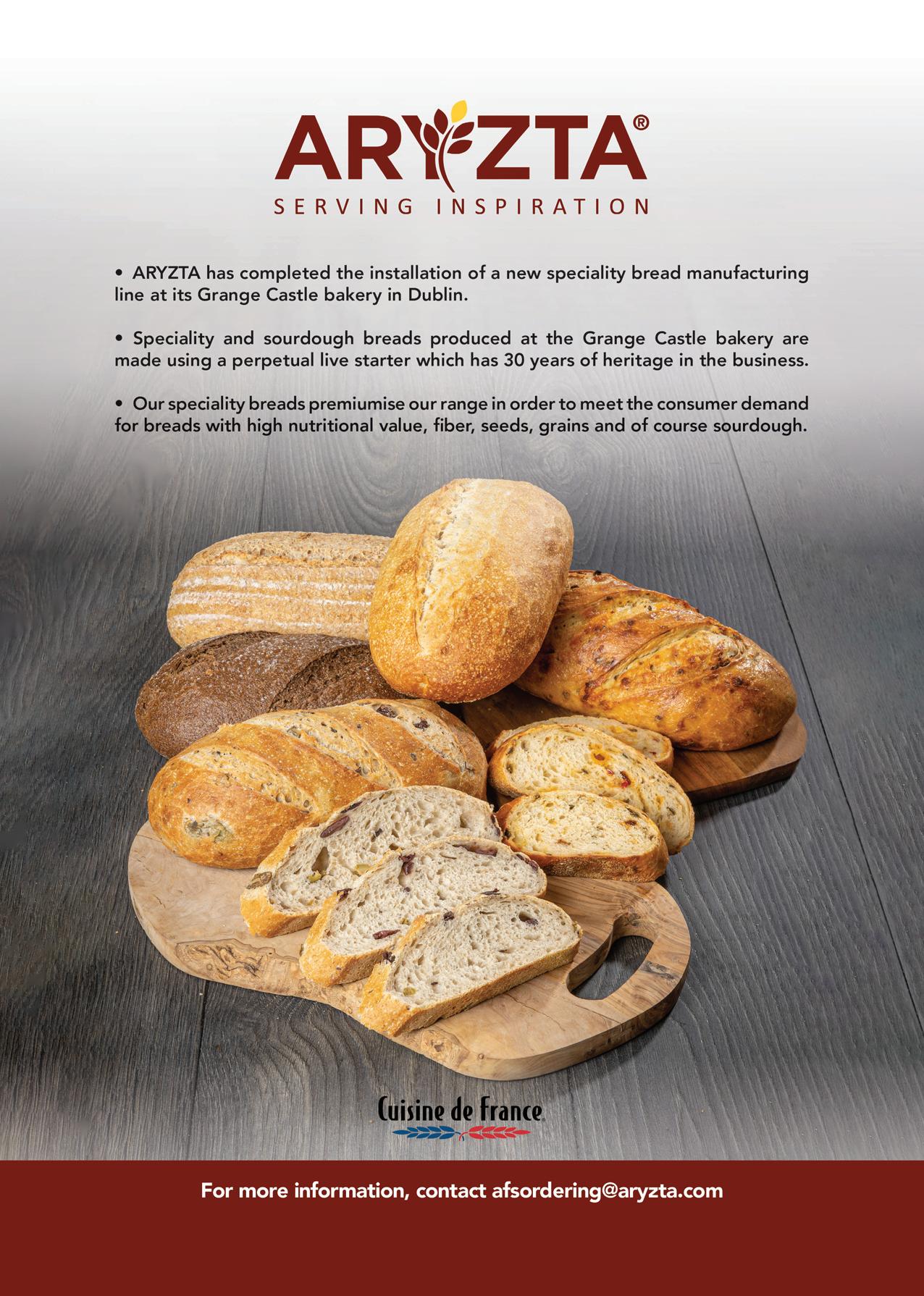

John White Managing Director




John White Managing Director

Managing Director John White on lamb chops, labels, and lentils.
Welcome dear reader, to your latest edition of Inside Food and Drink. My what a great deal has been happening both here at the head office and out there in your industries from crop through to consumption!
Our staff now work a four-day week compared to the five days we have been working for the last 12 years. In addition, our office is now almost entirely paperless and although we still print a hard copy of the magazine, the vast majority of our readers subscribe mainly to the digital edition.
The largest growth sector seen within the food and drink industry this decade, and indeed with almost all industries, is the need for us all to reduce our carbon footprint in order to make a significant dent in global carbon emissions. As such, objectives such as becoming B Corp certified, are becoming of increasing importance.
Consumers are being bombarded with information about what they should eat and drink and what stores they should visit to purchase it. In addition, complicated ecolabelling has again both helped and hampered the consumer as they strive to do the right thing. The information overload
has left many of us scratching our heads and wandering around like headless chickens (plant-based headless chickens of course) in an attempt to hunt and gather the ‘approved’ nourishment.
Many of us still consume too much and as a result are also being pushed to look at our food wastage, recycling, and consumer habits. I am confident, as with any change, that once we have all got used to it and better understand what we as individuals and businesses should, could and can do to help toward the common goal, then this current upheaval will settle down and the change will be embraced and appreciated by all. However, there is still a long way to go yet as we collectively attempt to undo centuries of conditioning.
Here at Inside Food and Drink, we have witnessed a marked increase in plant-based food stuffs and a shift, small as it is at the moment, away from a beef burger, for example, to a similarly tasting but meatfree alternative. Personally, my eating habits have changed over the years and I think I speak for many of us, when I admit to already consuming a greater quantity of fruit, vegetables, nuts, and seeds than I did some decades ago.
Another shift is within the massive area of packaging, where many businesses are adapting to alternatives from their traditional plastic of choice to fit in with recycling requirements. This is no easy task when you also need to be mindful of food protection, shelf life and the taste and smell of the product.
A reduction in running costs, more efficient machinery and manufacturing processes are also at the top of many of your ‘to-do’ lists. So, in short, there is a fair bit going on right now and we are proud to be on hand to help you promote your innovations, ability to adapt, change and improvise, and share those best practises with the rest of us. It is, or certainly should be, a team effort after all.
Therefore, without further ado, let me leave you now to enjoy the many interesting, inciteful and informative pages that follow. As I’ve touched on briefly above, I am sure you will enjoy reading the many detailed examples of what you busy little bees have been up to in order to address sustainability, right through from crop to consumption.
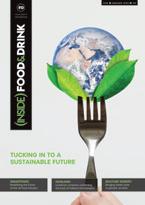


climate change: changing the narrative around uncomfortable truths Dr Marcus Gover, Chief Executive of WRAP, outlines the opportunities we all must consider in building a healthier planet and a fairer world for us and future generations.
industry once
eyes on London as IFE 2022 gears up for its much anticipated return




66 Solid foundation, trusted operation and commercial excellence
Athanassiou
Food service
72 Fusing culinary success in Barcelona
Ikibana
76 Italian food with a family touch
Vittoria Group
80 Providing effortless convenience to the caterer
Savona Foodservice
86 The whole story of healthy eating
Whole Foods Market
90 Warsaw’s superNova
Crowne Plaza Warsaw - The HUB Brands
96 The world of happy herbs
O’Hanlon Herbs
101 Violife could it be the best plant-based cheese alternative on the planet?
Arivia
108 Enjoy the fruits of nature’s labours
Whitworths
114 Adding Italian flair propels ingredients to next level
GCL Food Ingredients
118 Proving they are still on the rise
Antico Forno Della Romagna Group
Beverages
124 Investing in the future of Romanian wine
Jidvei
130 Toasting the best little brewhouse in the world!
Rye River Brewing Company
134 Bringing quality Greek wines to the table
Boutari Winery
142 Why Thai quality chicken is taking wing worldwide
Chaveevan Group
146 Taking stock and Moo-ving forward
Hunland
150 Quality assured fish from sea to table
Fjord Bohemia
154 Meat products, naturally
Nematekas
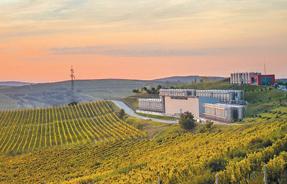



Alimentaria is the landmark international event for all professionals in the food, drinks and food service industry and represents an unmissable date with innovation, the latest trends and the internationalisation of the sector. Alimentaria 2022 will be strengthening the unique values that set it apart: internationalisation, innovation, gastronomy, and sector specialisation. The show will also feature a highly attractive offering based on key markets for the food industry and their consumer trends. www.alimentaria.com



Seafood Expo Global/Seafood Processing Global, to be held in Barcelona, serves industry professionals and buyers from all corners of the supply chain and world. No other resource can provide seafood buyers the sourcing opportunities and access found at Seafood Expo Global/Seafood Processing Global. At just one venue, throughout nine halls, professionals like you come face-to-face with more than 2,000 exhibiting suppliers representing 85+ countries. With nearly every type of seafood product, equipment and service at your fingertips, you are equipped to make the best purchasing decisions for your business and customers. www.seafoodexpo.com/global

At Anuga FoodTec, the industry is set to present its latest innovations and technological visions. From process technology, filling and packaging technology and food safety, to packaging materials, digitalisation and intralogistics, you can find the latest worldwide solutions for the production, packing and storage of food and beverages. Discover all of the innovations across the entire value chain. Discuss with expert peers at eye level and inform yourself in detail about the latest technologies, which will make your production more efficient. As the most important supplier trade fair worldwide, Anuga FoodTec is more than just a perfect trade fair. It is your future! www.anugafoodtec.com


Hundreds of the world’s leading candymakers debut new products at the Sweets & Snacks Expo, hosted at McCormick Place, Chicago, with exhibitors ranging from global players to up-and-coming innovators new to the confectionery industry. Find the specialty, gourmet, organic or classic candies your shoppers are searching for in one centralised location and connect directly with the people behind them. The latest innovation in chips, nuts, sweet snacks, jerky, pretzels and more can also be at the expo, with new flavours and formats galore. Don’t miss all the snack innovation and real industry connections happening each day on the show floor. www.sweetsandsnacks.com




For more than 35 years, PLMA’s annual World of Private Label International Trade Show has brought retailers together with manufacturers to help them find new products, make new contacts, and discover new ideas that will help their private label programmes succeed and grow. PLMA’s 2022 World of Private Label International Trade Show will be held at the RAI Exhibition Centre in Amsterdam. Products on display will include fresh, frozen and refrigerated foods, dry grocery, and beverages as well as non-food categories, including cosmetics, health and beauty, household and kitchen, auto aftercare, garden, and housewares & DIY. www.plmainternational.com

For over 50 years, SIAL Paris has been welcoming a melting pot of industry players to the French capital to share their savoir-faire and create the recipes of the future. Every two years, producers, importers, buyers and retailers, media specialists and independent associations of every shape and size meet at the largest exhibition venue in Paris for five-days of inspiration, debate and exchange. Whether you’re a rising start-up or a large group, a hot new product or a bluechip brand, an established chain or a groundbreaking retail model, SIAL Paris is your springboard for sustainable success. www.sialparis.com

“
Inside Food & Drink asks the experts about their personal experience in the industry
What have you discovered about your company or industry as a result of Covid-19?
We are proud of how our employees have toiled away on a daily basis against this difficult background. We have been creative to reflect the new work at home paradigm and extremely grateful to the employees for what they have done, even when the chips are down.
Cecily Gillet, Plant Manager, Banks (Barbados) Breweries
We used to think that you have to go and see the person, shake hands, have lunch, have a physical connection with the person. And we did a lot of travelling. Now we realise it’s not absolutely necessary. Covid has shown both us and our customers that we can continue doing business, we can develop our relationships perhaps even more efficiently while spending less time travelling.
It’ll change the way we do business after Covid. There’ll be less travel; fewer miles. It’s beneficial for the company as well with the lower costs and improved efficiency.
Dominique Arnault, Asia- Pacific Manager, Bayle SA
We have taken all the necessary measures to ensure production continues and, thanks to our people’s loyalty, we have continued to succeed during the pandemic.
Kolyo Atanasov, CEO, Bulmetal JSC
The whole landscape changed as consumers changed their habits and occasions of consumption. Fortunately, our categories, both tobacco and food, were, general l y speaking, positively affected.
Our company has responded to this challenge effectivelly by adopting a new way of working, with priority number one being staff health and safety. Work from home, virtual meetings, special care for our employees, frequent weekly standardised health tests are just a few examples of this new way of working. Additionally, the company responded very fast to the changes in consumers' behaviour and preferences.
In summary, we proved to be adaptable to the new conditions and agile in capturing new trends, with empathy being a key characteristic of the management’s behavior.
Yiannis Zarkadis, Chief Commercial Officer, Athanassiou
Covid-19 has changed peoples’ behaviour, including the way they drink alcoholic beverages. It’s forced us as a company to think much more about home consumption and on education, especially teaching people how to make drinks. We’ve done online coaching, tastings and mixology education. It’s actually broadened our platform.
Steve Wilson, CEO, Cockspur Rum
“The pandemic has taught us many things we had previously failed to see or realise. It is no secret that prior to Covid, we had all become accustomed to taking people for granted and relying more heavily in technologies. But today, without doubt, we can confidently state that no computer software or automated machine can replace dedicated work from our own human resource.
We were fortunate to see our employees breaking down barriers for the benefit of the company. They worked relentlessly to ensure more clients join us and that for every sector that closed, they had found another to open. During this period of crisis, we have come closer together as a family and cherish one another more than before.
Omer Kamp, ERP employee Europe Retail Packing
“ “ “
“Our global workforce has shown true grit across the pandemic to keep operations open and ensure supermarket shelves were stocked with tomato-based products. It is an outstanding achievement that deserves recognition. Their resilience humbled me. From the line operator to the accountant – they all excelled and enabled us to continue to run our end-to-end food value chain.
João Tavares Correia: Chief Commercial Officer, Sugal Group

We rediscovered the benefits of eating at home. For that reason, lockdowns created an opportunity for us; it essentially took us back in time to a period when many of our products were used regularly in the home. Covid brought that back and I hope that demand stays this way to a certain extent.
While we expect some changes, I think the popularity of shows such as MasterChef have highlighted how much people enjoy cooking. Covid forced people to enter the kitchen and I think people found that what was previously a chore, could actually be enjoyable.
“
Martin Stilwell, CEO, HIT Group
“ “
Covid has reinforced the importance of a stable supply chain and ensuring that we always have sufficient livestock available to sell. We also learned the value of online platforms, particularly since buyers could no longer come and select livestock in person. We successfully switched to making videos and putting the whole selling process online for a period. We’ve been looking to build an online sales tool using VR and the success of this project confirmed that that tool has real potential.
Tibor Hibszki: Director of Finance & Strategy, Hunland Group
Three years ago we began a project to teach our drivers to work online using phones and laptops to send CMRs, invoices and other documents. At the time it was a huge challenge to convince the drivers of the usefulness of those tools. When Covid came along, it drastically sped that whole process up. Everybody learnt to be online virtually overnight! That was important because we transport essential items – the raw materials needed for meals – so it made us much more efficient.
Péter Hencz, Managing Director, Hunland Trans
The biggest lesson I take from the whole pandemic is that while you have to live in the moment, it is no longer the survival of the fittest; it’s the survival of the most adaptable. Those that show initiative will survive and thrive, and Macphie has been consistently doing that.
Andy Stapley, CEO, Macphie UK
Without the collective effort of the team, we wouldn’t have achieved as much as we have. They have been fantastic, highly flexible and made strenuous efforts to keep Covid-19 off site.
Tom O'Hanlon; Managing Director, O'Hanlon Herbs
We’ve rediscovered the importance of our team and the family – by that I mean the whole company, not just the Landucci family itself. During the darkest days of Covid in March 2020 and the beginning of 2021, it was such a blessing that we could still come to work and still be together. Coming here, finding all of the people in the office and in the factory, still doing their best, has been so motivational for us to keep pushing forward and to keep doing what we do in the best way that we can.
Alessandro Bonistalli, Sales and Marketing Manager, Landucci SRL

US-based Continental Grain Company has announced an investment in Agroberries, a global vertically integrated berries player based in Chile, as part of its global expansion plans.
Continental Grain’s investment is predicted to enable Agroberries to expand its production assets and global distribution capabilities, both organically and inorganically, as well as accelerate the roll-out of proprietary varietals, further strengthening the company’s year-round offering across berry categories.
As a long-term partner, Continental Grain said it will use its international network, M&A resources, and operational expertise to support Agroberries’ strategic development initiatives.
Jorge Varela, Co-Founder and CEO of Agroberries, highlighted: “I’m excited about the possibilities arising from our partnership with Continental Grain, and confident it will accelerate our global expansion plans, give our customers increased access to our novel proprietary varieties, and offer exciting professional development opportunities for our management team.”
Founded in 1996, Agroberries is a leading vertically integrated producer, marketer, and global distributor of fresh berries, catering year-round to a blue-chip customer base of leading retailers throughout the world.
With headquarters in Chile, and marketing companies in the United States and the Netherlands, the company offers a competitive and top-quality supply of both conventional and organic berries.
Agroberries is a globally recognised leader and pioneer in berry production, harvest, and packing techniques. The company owns farms and state-of-the-art packing facilities
in both hemispheres and has a strong net work of strategic alliances with trusted partners globally.
The company’s owners, directly involved as part of the management team, are deeply committed to reliability and product quality, and have developed a well-established, controlled, and diversified berry business platform.
Agroberries commercialises over 50,000 tonnes of berries per year to a blue-chip customer base primarily in North America and Europe, sourced from its landbank of more than 2,000 hectares and a diverse network of third-party growers. Agroberries’ agricultural footprint spans across five different countries, including some of the world’s most productive regions.
Carlos Poblete and Ignacio Sanz serve as Co-Heads of Latin America for Continental Grain. Carlos commented: “We have known the leadership team of Agroberries for years and believe the company is well positioned to capitalise on a wide range of growth opportunities going forward.”
Ignacio added: “We are excited to partner with Agroberries and support the next phase of the company’s global expansion. Agroberries has established itself as a highquality supplier in the markets it currently serves, and we intend to further grow the business through acquisitions that expand the company’s geographic reach.”
Continental Grain Company is a privatelyowned global investor, owner and operator of companies with more than 200
“ “
We have known the leadership team of Agroberries for years and believe the company is well positioned to capitalise on a wide range of growth opportunities going forward
years of history across the food and agribusiness spectrum.
The company says it creates longterm value by applying deep industry knowledge, capital and talent to businesses ranging from established market leaders to promising innovators; building platforms that leverage its strategic expertise in food production, processing, and distribution to source proprietary deals, working alongside trusted partners and supporting strong management teams.
Agroberries is expected to also benefit from Continental Grain’s longterm ownership mindset, concentrating on investment and operating plans that create enduring value and a sustainable, efficient and nutritional food supply chain.
The company confirmed wellness and demographic trends continue to drive strong momentum for fresh produce consumption. Given their high nutritional value, demand for fresh berries has continued to climb, making them one of the fastest growing fresh produce categories at retail stores globally. As a result, customers are seeking year-round suppliers of high-quality berries. n

Morrisons has become the first UK supermarket to switch to ‘best before’ dates only on milk, as it encourages customers to opt for the ‘sniff test’ to check. The move could potentially stop millions of pints of its own brand milk from being thrown away every year.
Morrisons has scrapped ‘use by’ dates on 90% of its own brand milk – and is encouraging customers to use a sniff test – to help to reduce food waste in the home.
‘Use by’ dates will be scrapped from Morrisons own brand British and Scottish milks, Morrisons For Farmers milks and Morrisons organic milks in store – supplied into Morrisons by Arla farmers. Morrisons South West milk and The Best Jersey milk are yet to be converted.
Morrisons will instead encourage its customers to use a simple sniff test to check if their milk is still good to consume. The milk packaging will show ‘best before’ dates to indicate to customers when they should drink it by – to get the best taste. Unlike some other fresh products, drinking milk after a ‘best before’ date is not a food safety issue.
Milk is the third most wasted food and drink product in the UK, after potatoes and bread, with around 490 million pints wasted every year. Milk also has the largest carbon footprint of these food and drink products because its production is so resource-intensive. One litre of milk can account for up to 4.5kg of CO2.
Research shows fresh milk can often last a number of days past the ‘use by’ date shown on the bottle. However UK customers are routinely throwing away milk – as they incorrectly believe the milk is unsafe to drink.
British registered charity WRAP (Waste & Resources Action Programme) estimates that 85 million pints of milk waste may be
a result of customers sticking to ’use by’ labels or ‘once opened use within’ guidance –when products may still be good to consume.
Ian Goode, Senior Milk Buyer at Morrisons, said: “Wasted milk means wasted effort by our farmers and unnecessary carbon being released into the atmosphere. Good quality well-kept milk has a good few days life after normal ‘use by’ dates – and we think it should be consumed not tipped down the sink.
“So we’re taking a bold step today and asking customers to decide whether their milk is still good to drink. Generations before us have always used the sniff test –and I believe we can too.”
Marcus Gover, CEO at WRAP, said: “I am delighted that Morrisons is the first UK supermarket to take this important step to help reduce household food waste – it shows real leadership and we look forward to more retailers reviewing date labels on their products and taking action.
“WRAP’s joint Best Practice with FSA and Defra is to only apply a ‘use by’ date when required for food safety reasons. Applying a ‘best before’ date to indicate quality on all
other products means people have longer to use their food. Almost 300,000 tonnes of milk is wasted from UK homes each year, worth £270 million, with the main reason being that it isn’t used in time.”
He added: “Making improvements to labelling forms an important part of WRAP’s efforts under the Courtauld Commitment 2030 to reduce household food waste. It is fantastic to see Morrisons, as a Courtauld signatory, making this change – giving people the confidence to use their judgment and consume more of the milk they buy.”
Morrisons scrapped ‘use by’ dates across some of its own-brand yogurt and hard cheese ranges in 2020.
Morrisons has committed to reducing food waste in stores by 50% by 2030. The company takes great care to order what it thinks it can sell and where products are close to their ‘use by’ or ‘best before’ date, they are offered to customers at reduced prices.
I am delighted that Morrisons is the first UK supermarket to
take this important step to help reduce household food waste
“ “
When waste does occur, Morrisons ‘Unsold Food’ programme works with a range of partners including Too Good to Go, The Bread and Butter Thing and local food banks, charities and community groups, to ensure food can be redistributed.
Where food cannot be redistributed, Morrisons uses anaerobic digestion to generate electricity, which in turn contributes to renewable energy generation across the UK.

US retail giant Walmart and Californian vertical indoor farming company Plenty Inc enter into a long-term strategic partnership with an equity investment to bring fresh, peak-flavour produce to American shoppers year-round.
Walmart has signed an agreement to invest in Plenty, an indoor vertical farming company, as part of Plenty’s $400 million Series E funding round, subject to a regulatory approval.
Walmart’s equity investment is part of a broader strategic partnership to utilise Plenty’s indoor vertical farming technology platform to deliver fresh produce to Walmart retail stores. As part of the investment, at closing, Walmart will also join Plenty’s Board of Directors.
Plenty is rewriting the rules of agriculture through its technology platform that can grow clean produce anywhere in the world, year round, with unprecedented yield and peak season quality.
The company’s proprietary approach preserves the world’s natural resources, makes nutritious produce available to all communities and creates resilience in our food systems against weather, location, pests and climate.
Plenty’s headquarters are in South San Francisco, and the company operates the largest of its kind indoor plant science research facility in Laramie, Wyoming. Plenty is currently building the world’s highest-output, vertical, indoor farm in Compton, California.
Together, Walmart and Plenty will work collaboratively to create a new, marketleading product category in vertical farming by delivering the freshness and
Plenty’s
unique farming system unlocks industry-leading crop versatility and unit economics by enabling indoor growing year round
“ “
quality that Walmart customers expect, year-round.
The long-term commercial agreement allows Walmart to source Plenty’s leafy greens for all its California stores from Plenty’s Compton farm beginning later this year. Walmart is the first large US retailer to significantly invest in vertical farming.
Charles Redfield, Chief Merchandising Officer, Walmart US, said: “At Walmart, we are focused on identifying and investing in innovative food solutions to bring our customers the freshest, highest quality foods at the best prices. We believe Plenty is a proven leader in a new era of agriculture, one that offers pesticide-free, peak-flavour produce to shoppers every day of the year.
“This partnership not only accelerates agricultural innovation, but reinforces our commitment to sustainability, by delivering a new category of fresh that is good for people and the planet.”
Plenty’s farming technology platform delivers pesticide-free produce that tastes like it was picked fresh from the garden, all year long. The company’s indoor farming architecture differs from greenhouses and
other indoor farms, combining engineering, software and sustainable crop science to grow multiple crops on one platform, at unprecedented speed.
Backed by one of the largest US patent portfolios in the industry, Plenty’s proprietary tech meaningfully improves on traditional agriculture’s use of water and land. By building farms closer to the consumer, Plenty helps reduce transportation and food waste, keeping items fresher for longer in 100% recyclable product packaging.
Vertical farming supplements traditional farming practices to help increase food supply and alleviate current challenges on the food system in a sustainable way. Walmart’s investment is the latest step in the retailer’s commitment to increase access to high-quality, fresh produce for its customers.
“Plenty’s unique farming system unlocks industry-leading crop versatility and unit economics by enabling indoor growing year round,” said Arama Kukutai, Plenty CEO.
“Our farms can be sited anywhere allowing us to put fresh fruits, greens and vegetables on shelf at all times, at speed, for maximum freshness. As a long-time market leader in retail innovation, Walmart is an ideal partner to test and scale access to our quality produce for their customers.
“This is a game-changer for the agritech industry.” n
Reporting on the latest developments from the Malaysian food and drink

Partnership will plant over one million trees under the scope of Project RELeaf.
Ramping up reforestation efforts to plant three million trees in Malaysia by 2023 via Project RELeaf, Nestlé Malaysia inked a Memorandum of Agreement with the world’s largest producer of certified sustainable palm oil, Sime Darby Plantation (SDP).
Under the agreement, over one million trees are set to be planted across 1,200 hectares of riparian zones and steep slope areas within SDP’s palm oil operation areas.
Launched in 2020 by Nestlé Malaysia, Project RELeaf aims to restore riparian and forest ecosystems across the Kinabatangan Wetlands and Merisuli Forest Restoration Areas in Sabah, as well as in forest reserves along the Central Forest Spine in Peninsular Malaysia. This is also part of Nestlé’s global efforts to fight climate change and reduce the company’s carbon footprint.
Through the partnership with SDP, Nestlé will be producing and supplying over 1 million seedlings and conducting planting activities at the sites. Planting sites will be located at selected SDP estates in both Peninsular Malaysia as well as the East Malaysia regions of Sabah and Sarawak.
Juan Aranols, Chief Executive Officer of Nestlé (Malaysia) Berhad, said:
“Safeguarding the environment is a key priority for Nestlé. This is why we have initiatives in place to help preserve and conserve the country’s natural biodiversity and these include our reforestation
efforts such as Project RELeaf, aiming to plant three million trees by 2023.
“Now, we are pleased to partner with SDP, who is also the main supplier of Nestlé Malaysia’s certified sustainable palm oil. By working together, we can help to reduce total emissions along our value chain while preserving natural ecosystems.
“This partnership will also contribute to our global pledge to achieve zero net greenhouse gas emissions by 2050,” he added.
All conservation and biodiversity activities that take place under Nestlé Malaysia’s RELeaf Project will be in accordance with the RSPO Management and Rehabilitation of Riparian Reserve Guideline 2018.
According to Mohamad Helmy Othman Basha, Group Managing Director of Sime Darby Plantation, the company is very pleased to be working again with a likeminded partner to realise its commitments of protecting and conserving biodiversity as well as contributing to combat climate change.
“Restoring forests and planting trees on a large scale are important nature-based solutions to increase carbon sinks, as part of our response to climate change. Over the last 12 years, we have planted over 1.5 million trees through various tree-planting projects, including our involvement in a previous project with Nestlé. Sime Darby Plantation is truly excited to renew our collaboration with Nestlé today with RELeaf.”
He added: “Over the next five years, we plan to double the number of trees we have planted through our treeplanting projects. And whilst we are on track to achieving our target of 40% reduction in carbon intensity by 2030, the success of our tree planting projects will be fundamental in how we lay the groundwork towards making and realising a net zero commitment.”
Project RELeaf builds on the pioneering Kinabatangan Rileaf Project, which concluded in 2020 and saw one million trees planted in Sabah. n


Dr Marcus Gover, Chief Executive of WRAP, outlines the opportunities we all must consider building a healthier planet and a fairer world for us and future generations.

Beating back climate change will be the biggest accomplishment of our lives. 2021 was the year, helped by COP26, when the world shifted up a gear in response to the emergency and 2022 looks set to be busier than ever. If we are to keep the 1.5°C target alive, then we are all going to have to face up to and turn around some uncomfortable truths, writes Dr Marcus Glover, Chief Executive of WRAP – a charity promoting and encouraging sustainable resource use through product design, waste minimisation, re-use, recycling and reprocessing of waste materials.

Many countries at COP 26 showcased big, eye-catching green technology projects with a focus on innovating our way out of the climate crisis. But this will only get us so far. We need to both invest in the new and wean ourselves off our dependency on the old. This means fundamentally changing the global systems on which we rely to produce the food we eat, create the buildings we live and work in, make the clothes we wear and manufacture the goods we need to live our lives.
There must be recognition of the need to re-invent the modern industrialised world, which can no longer be fuelled by our planet in its current form. This will be a huge undertaking, but it means we have an opportunity not only to tackle climate change, but to redress the fault lines of inequality, poor health and working conditions, exploitation that opened up as industrialisation evolved. We have the chance to build a healthier, fairer, world.

The climate crisis is felt everywhere. So, solutions have to involve thinking beyond borders, beyond agendas, beyond politics and beyond profit. It is too tempting to think territorially and get your own house in order but simply displace the problem elsewhere. This is the case for countries thinking about emissions in their own borders, but also for businesses looking to balance their own books in terms of the climate impact of their own operations, but failing to address those along their supply chains. The problem is offshored, displaced, unaccounted for, but doesn’t go away.
System change at every stage of global supply chains, tackling consumption emissions through transcending borders and business domains has to be considered alongside tackling only territorial emissions. We’ve shown it can be done through the power of partnership; underpinned by smart globally aligned policies from governments (which unlock investment) and where citizens are an essential part of the journey. This creates a joined-up, global movement for change, where everyone is working to the same goal and supporting those countries who are less able to deal with the climate emergency themselves, but whose citizens are often feeling the worst effects.
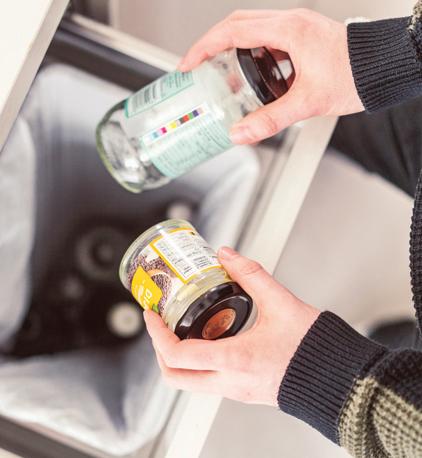
When you consider that nearly half of all greenhouse gas emissions are down to the way we produce and consume, our current model is incompatible with a 1.5 vision. Our take-make-waste culture is also using up our planet’s stock of valuable natural resources faster than it can replenish them. If we are to solve this, then we need to change the way we consume.
Every aspect of human survival is embellished by ‘stuff’. We are filling our fridges with food that we don’t eat, our wardrobes with clothes that we don’t wear and our attics with broken or outdated electronics that we don’t use. A 1.5°C world is one where we don’t waste food, we wear our clothes for more seasons, and we repair our electrical goods to keep them working. Where new goods are designed and built to be in circulation for as long as possible. And where we end the staggering amount of waste which is not only contributing to climate change, but polluting our countryside and our oceans, and damaging biodiversity.
Businesses and governments are both crucial in making this shift. They will need to support the development of new business models to support this different way of consuming. If they get it right, it will be a big opportunity rather than a threat to our way of life.
We are already seeing this shift happening, with consumers being increasingly able to rent clothes, lease cars, buy electrical goods with long warranties, and access a growing supply of remanufactured furniture. The latter in particular has huge potential. I sit on a remanufactured office chair which is high-quality, comfortable, cost half as much as the new equivalent and resulted in a fraction of the greenhouse gas emissions caused by making a new one.
New ways of consuming won’t negatively affect the quality of our lives – they will enhance it. A washing machine built to last which doesn’t break down, or is fixed if it does, is a better way of living. The calculator which still works decades after it was bought is still great to use. Not wasting food saves us up to £700 for the average family at the moment. This is a win-win world.
We need to think globally, remodelling systems and not just looking after our own backyards. But just how uncomfortable really is this? We’re not advocating a hair-shirt existence or a return to lives preindustrial revolution. A world where resources are used sustainably is a better world with multiple benefits. This truth needs to inform the narrative.
For consumers we get affordable goods that last and ease our environmental footprint (something we all want to do). What isn’t there to like about saving money by not wasting it on food we

Dr Marcus Gover, Chief Executive of WRAP, outlines the opportunities we all must consider building a healthier planet and a fairer world for us and future generations.


don’t eat or clothes we don’t wear? WRAP’s Love Food Hate Waste and Love Your Clothes campaigns are already showing the way.
For businesses, this approach unlocks innovation, opens up exciting new markets and creates the opportunity to make significant financial savings. We know that the median return on investment for reducing food loss and waste is 14:1. It also means they are also better serving their consumers – our research show that they want and expect businesses to do more to tackle climate change.
UK businesses are working together and stepping up to the plate through WRAP’s Courtauld Commitment, Textiles 2030 and The UK Plastics Pact. They are already reaping the benefits of collaboration and system change. They will be ahead of the game.
For governments, this offers a way to meet international environmental commitments, stimulate innovation and investment, build
economies, and create jobs. It will be delivering what people want too – working together to tackle climate change and making a better world. Doesn’t that sound like a recipe for getting re-elected?
So, even though the scale of change is undoubtedly daunting, that truth doesn’t need to be uncomfortable. The potential is for a life which is exciting and progressive; the chance to build a healthier planet and a fairer world for us and future generations. By embracing that opportunity, that truth can start today. n
WRAP is a sustainability NGO working across six continents with governments, businesses and citizens to tackle food waste, plastic pollution, and reduce fashion’s carbon footprint worldwide. For more information, visit: https://wrap.org.uk/




All eyes on London as IFE 2022 gears up for its much anticipated return
For more than 40 years, the mission of IFE, International Food & Drink Event, has been to help attendees build relationships and find the products that will revolutionise their business. Welcoming over 30,000 retailers, wholesalers and professionals of the food service industry, IFE is the single largest food and drinks fair in the United Kingdom.
Overseeing preparations ahead of IFE 2022 is Event Director Philippa Christer who believes the most important aspect of the show is how it gives both attendees and those who exhibit the chance to connect, which for many could be the first time they meet the people behind the brands set to line their shelves; as well as taste a huge range of products all under one roof. Jordan Yallop asked her what can be expected at the upcoming event, due to be held from 21-23 March at ExCeL London.
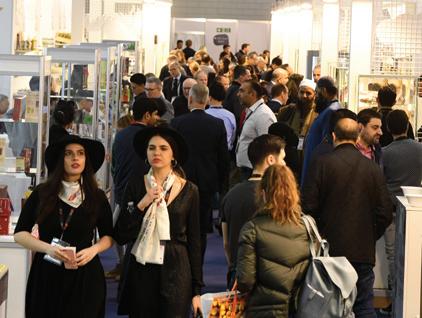

Philippa, for anyone new to the event, what are the main things they would experience if they were to attend IFE 2022?
Visitors attending IFE in 2022 will have the chance to experience the world’s largest gathering of UK food and drink suppliers. The show is a highly trusted and valued resource for discovering the next major trends and products, for gaining valuable insights from the UK’s leading minds in the food and drink retail on the Future Food stage, and for meeting with international food and drink businesses representing over 100 countries.
For food and drink suppliers, the event is a chance to meet with highly influential buyers from the worlds of retail and wholesale and experts in the import and export market. Businesses can take advantage of the show’s Certification Clinic, Meet the Buyer Programme and can help their products stand out from the crowd by entering the World Food Innovation Awards, which is once again being hosted at the event in partnership with FoodBev Media.
Which of these exhibiting companies or key industry personnel are you projecting will create the biggest buzz in the lead up to the show?
IFE is beloved and trusted by its audience for the variety of quality suppliers that are showcased at each edition of the event. Visitors can expect a curated selection of food and

drink suppliers, ranging from hugely respected heritage brands like Walkers Shortbread, Royal Greenland and Fentimans to newer businesses like baking subscription service BakedIn and delicious, award-winning plant-based snack supplier Plant Pops, both challenger brands which have introduced inventive and delicious new takes on classic products and services.
IFE will be co-located with IFE Manufacturing, Hotel, Restaurant & Catering (HRC), The Pub Show and The London Produce Show for the first time. Are you excited to be the industry’s largest gathering in the UK?
We’re thrilled to be partnering with all of our sister events for 2022. There’s a huge amount of crossover between the different shows and it’s a significant value add for both our suppliers and buyers as they take valuable time out of the office to join us at ExCeL London.
The launch of IFE Manufacturing is a huge value-add for visitors to IFE who have an interest in new product development, packaging, manufacturing and supply chain trends and the latest exciting ingredients available on the market.
With a legacy of over 40 years in the food and drink sector, IFE certainly has experience with monitoring trends. With the challenging events of the last couple of years altering the way buyers and producers operate, what have you brought to IFE 2022 to cater to these changes?
The phrase “necessity is the mother of invention” has never rang truer than in the last two years. As much as it has become an unpopular buzzword, both our suppliers and buyers were forced to pivot and adapt their offering to survive.
On the retail side, big brands arguably had the initial advantage, as having an online shop and a delivery offering became vitally important. But smaller, independent retailers were quick to meet this challenge and consumers were eager to discover new products and support local businesses.
From a supplier side, we’ve seen an explosion of exciting new products entering the market, both from established brands and from a large number of first-time owners of food and drink businesses, bringing long-held dreams to life. It’s a hugely exciting time for the industry and we’ve heard first-hand from the retailers and wholesalers that come to the event saying they can’t wait to discover and taste these new products at IFE in 2022.

All eyes on London as IFE 2022 gears up for its much anticipated return


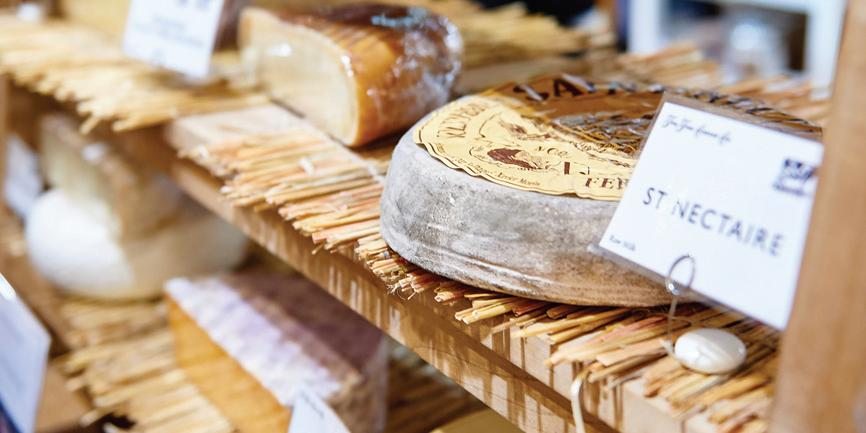
We’re supporting our audience through this period of uncertainty by facilitating further innovation, whether that’s through new show areas to help buyers find the product types suited to their changing needs, new networking spaces to enable those all-important face-to-face business connections or fresh new approaches to common challenges from the industry leaders in our seminar programme.
So with these changes in mind, what would you consider to be the newest trends to look out for 2022?
There continues to be rapid growth in the world of meat alternatives, with a huge number of vegan and plant-based options launching across a wide range of product types, from bacon, scotch eggs to caviar. Alongside this, lab-grown or ‘motherless’ meat is certainly on the horizon as an interesting trend to follow.
Innovations aren’t limited to the lab, with many in the new product development space exploring more creative uses for mushrooms, sugar alternatives and underexplored food solutions such as seaweed, kelp and samphire.
Health and wellness is another key trend, particularly with a consumer desire for less processed foods, preferring instead options with limited, natural ingredients.
From the retail side, sustainability is the name of the game, with free refills steadily growing in popularity across food and drink prod-
ucts. Notably ASDA has recently partnered with Craft on Draft to launch a refillable beer service. Ocado also signalled their commitment to working with sustainability-focused brands by launching a dedicated B Corp aisle in early 2021.
Covid-19 completely devastated the trade show industry. At this stage of the pandemic, what actions has IFE taken to ensure guests who physically visit the March event will remain safe?
As events, trade shows are a highly controlled environment, and events have been running securely in the UK and abroad as tried and tested measures have been put in place. The Association of Event Organisers, our official association body, has been collaborating with organisers around the world to ensure a valuable, straightforward and enjoyable experience for trade show attendees and suppliers. We have spent the past two years planning for a wide range of possibilities for the live events and will implement the most appropriate as the show approaches, in line with government guidelines.
And what particular areas of the food supplier and buyer markets have you seen grow over these recent events?
As I mentioned previously, a key area of growth is vegan and plantbased products, with alternative meat products in particular growing
21-23 March 2022

rapidly as a product category. According to research by Kantar, from the year 2016 to 2020, the meat-free and plant-based dairy categories doubled in size and are now worth just under £600 million each. We've engaged insightful speakers such as Matthew Glover, founder of Veganuary and Vegan Fried Chicken, and a Veg Capital investor, to discuss how this trend is set to evolve in 2022 and beyond on our Future Food Stage.
In this increasingly crowded marketplace, there has been a huge amount of innovation and new product development, which will be showcased in our all-new Vegan & Plant-Based Section, in partnership with the Vegan Society.
From big name brands in the sector such as The Meatless Farm, Beyond Meat and The Vegetarian Butcher to up-and-coming small businesses like Plant Alternative, this section will represent the full spectrum of businesses in this area.
On the buyer side, food and drink retailers have had to adapt fast to the emergence of speedy grocery businesses such as Getir, Gorillas, Zapp and Weezy, which have grown rapidly and made use of “dark stores” to service consumers.
The focus now is longevity and we’ve been following the recent partnership between Gorillas and Tesco to offer sub-10-minute deliveries with interest. We’ll be examining how to meet these demanding consumer needs more closely on the Future Food Stage at IFE 2022.
Sustainability has been one of the other hottest topics in recent years, do you think this will be a prominent feature of IFE 2022?
Sustainability continues to top the agenda for every industry, and food and drink is no exception. We’ve seen huge growth in the number of B Corp certified businesses and the environmental impact of products is
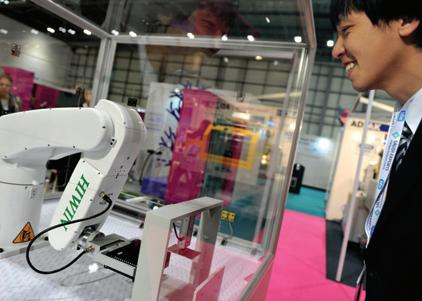

being increasingly measured and quantified, plus retailers and wholesalers are consistently factoring this into their sourcing decisions.
Any new products entering the market are expected to have thought through their supply chain, packaging and ingredient sourcing with sustainability in mind, meanwhile larger, more established brands are taking significant steps to change their processes, offset their emissions and fund NPD and innovation in sustainable packaging and manufacturing.
For retailers, wholesalers and suppliers, food waste is a key issue, with many partnering with charities like City Harvest (one of our key show partners) and Too Good To Go to find a second home for products reaching the end of their shelf life and working to reduce the impact and volume of food waste at every stage of the manufacturing process. IFE 2022’s seminar programme will have a major focus on sustainability and how environmentally focused processes can be implemented at every level of a business.
And the final question, what is the main message you would like to share to the readers of Inside Food & Drink about this upcoming event?
IFE 2022 will be the industry’s first chance in over three years to gather together and meet face to face. Anyone who’s anyone in the world of food and drink will either be on the stage, on a stand or on the show floor.
Don’t miss this opportunity to meet with over 1,500 suppliers, meet and learn from your peers, gain invaluable insights into the trends of tomorrow and ready your business for the next stage of its evolution. For food and drink professionals serious about success, IFE is a must-attend.

A look into the most exciting spiced rums to try in 2022
Spiced rums have been gaining in popularity constantly over the years. This trend is projected to continue well into 2022 and beyond. But with this ever-expanding market, just which of the myriad of rums should you try? Well, whether you are propping up the bar at your local, dusting off the cocktail shaker in your kitchen, or sitting on a beach sipping a cocktail, we here at Inside Food and Drink have got you covered. Here is a round up of our choices for rums to give a try this year. We’ve done the hard work so you don’t have to. Here’s our ‘rumdown’ of the ones to watch.

2
(37.5% ABV – 70cl)
launched in 2020, Bush Rum Co is marketed as the world’s first sustainable rum. This particular offering takes flavours of Caribbean Rum Shacks and brings them to life. Guyanese rum is mixed with a secret blend of spices to create a spiced rum full of flavour bursting with sweet ginger, soft vanilla, toffee and warming spice. So smooth you can sip it on its own or mix it with cola or ginger beer. Perfect in fruity cocktails such as a Pina Colada and a pineapple rum punch.
Jordan – Editorial Assistant: “Finely balanced and so smooth you’d be forgiven for forgetting that you are drinking alcohol. I enjoyed this one neat over ice and it goes down very easily.”
www.bushrum.co.uk
(42% ABV – 70cl)
Just a year since launch, Welsh craft-rum brand, Devil’s Bridge, has wowed judges, journalists and customers alike for its complex flavour, smooth finish and striking matt-red bottle. From a purposebuilt distillery in Carmarthen, the company collaborates with local artisan producers to discover the perfect food pairings to infuse into their rum. The base rum is a blend from the Caribbean’s most renowned distilleries. In Wales the base is infused with Bara Brith and distilled in a copper pot still with fruits and spices for sweetness, Shirgar Carmarthanshire butter for smoothness and Glengettie black tea for an unusually dry finish. Devil’s Bridge is an outstanding rum that can be enjoyed on its own over ice, served long with a mixer or as a first class kick in any cocktail.
i F D &
Gavin – Head of Support: “Smooth, spicy, lightly fruity and very strong! It is certainly a drink to really take your time with and enjoy every sip.

www.devilsbridgerum.com



Richard – Sales Director:
(40% ABV – 70cl)
A recently revitalised historic label, Wing Walker Rum is a premium rum from the Caribbean coasts of Venezuela and The Dominican Republic, distilled in copper pot stills and aged in vintage oak barrels for three years. It is then shipped to London where expert mixologists at Innovatus blend it with citrus, vanilla and caramel. An exceptionally smooth and silky rum which when ice is added, the flavours open and the incredible character bursts into life, bringing the warmth of the Caribbean to your glass. You’ll be walking on air with this one.
Ian – Art Director: A strong but smooth rum, you can definitely appreciate the notes of orange peel. While full of flavour this rum really takes off when mixed into a traditional Cuba Libre. This tastes great on its own, and I also enjoyed it mixed with pineapple juice.”
4 i F D &
“A sweet sipping rum, to be enjoyed slowly. Strong flavoursome honey notes, coupled with an undertone of orange.”
www.honeybellrum.com
(40% ABV – 70cl)
Harnessing the sweetness of English blossom honey and balancing it with bittersweet orange is central to creating the unique flavour of this spiced rum. The company’s incredibly meticulous distillation process is complemented by the selection of handpicked botanicals that infuse to create a unique and complex flavour profile. English blossom honey, orange and vanilla pods with emergent notes of cacao and assam tea combine for a spiced rum aimed at changing the narrative of what a spiced rum can be. This smooth rum is most certainly for sipping but could also be used as an exceptional cocktail base.

A look into the most exciting spiced rums to try in 2022



(60% ABV – 70cl)

Two Drifters is a rare British distillery making rum from scratch, rather than importing the base spirit from overseas. Distilled in Devon in the world’s first carbon negative distillery, its creators identified the Overproof market was growing in line with the ever popular flavoured rum market. Overproof Spiced Pineapple Rum is Two Drifters’ latest addition to their line-up. Flavours of rich and fruity rum with irresistible notes of ripe pineapple, salted caramel and crème brule are designed to make the best rum and coke you’ve ever tasted.
Jordan – Editorial Assistant: “The strongest on this list but don’t let that fool you, it is a smooth and clean drink. While I thoroughly enjoyed it with cola, I can certainly see this being at home in a finely crafted cocktail.”
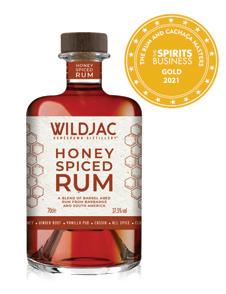

www.twodriftersrum.com
(37.5% ABV – 70cl)
Creating premium botanical spirits with natural ingredients foraged from the Wyre Forest and surrounding land, WildJac carefully hand pick, select and blend the finest botanicals to ensure the most amazing drinking experience for consumers. WildJac’s Honey Spiced Rum is barrel aged and infused with Worcestershire Honey and English Coriander. A smooth feel on the mouth, a honey spice aroma leads to ginger and orange with a satisfying vanilla finish. Spicy coriander, nutmeg and a hint of oak underpin this full bodied rum. It is perfect served over ice or works equally well with your favourite mixer. The rum is also made from sustainably sourced sugar cane plantations grown in the sub-tropical climate and fields of Nicarayua, Costa Rica and Honduras
i F D & John – Managing Director: “Big spice blast, yet not too sweet. Really natural honey taste without an overpowering sweetness.”

(38% ABV – 70cl)
Located near the centre of Amsterdam, Spirited Union is an independent pioneering rum company creating a new flavour driven category for rum. One of Spirited Union’s most exciting innovations is Queen Pineapple & Spice – a rum that celebrates the sweet taste of Queen Victoria pineapples. These mini pineapples have a fragrant golden orange skin and bright yellow flesh. They are sweeter and more aromatic than more commonly found pineapples, resulting in a delicious rich aroma and complex fruity notes. The natural sweetness of pineapple is balanced by infusing the rum with cassia wood and aromatic cinnamon, creating a well-rounded taste.
Daniel – Editorial Manager: “The fresh smell and taste of pineapple was unmistakeable. I thoroughly enjoyed drinking it with a non-sugary mixer as the rum itself is sweet enough!”

www.spirited-union.com

(40% ABV - 70cl)
Daniel – Editorial Manager: The cocoa really comes through when drinking this neat. Whilst I enjoyed it over ice, I think it would be just as delicious added to a hot chocolate or cappuccino on a cold winter’s night.” 8
Cockspur is a hugely popular rum in the Caribbean. The company’s spiced offering is inspired by the ancient gods and history of voodoo. Said to be the god of tricks and deception, the story goes that Balla was trapped by ritual sacrifice within a bottle of rum. A sensational concoction of charred molasses, infusions of local Caribbean spices with a touch of heat for a mysteriously intriguing experience, this is an excellent cocktail base but is perfect as a rum and coke – a must for any rum bar. Release your spirit within, enter the darkness.
i F D & www.ballarum.com

Getting ready to experience the tastes and smells of FOOD EXPO 2022
With events now back up and running following a Covid hiatus, what better place to get back into the swing of things than at FOOD EXPO 2022 – Greece’s largest food and beverage event, and one of southeast Europe’s most influential?
Thanasis Panagoulias, CEO of event organiser FORUM SA (which is a member of NürnbergMesse Group), spoke to Daniel Barnes about the excitement of getting back to physical trade shows and its ambitions to maintain and expand its impressive position and reputation in the upcoming years.


In just half a dozen iterations, FOOD EXPO has become Greece’s largest international food and beverage trade show. How has this been achieved in such a relatively short space of time?
It is true that it only took seven years since FOOD EXPO’s very first iteration to consolidate its reputation as the largest international food and beverage trade show ever organised in Greece and the most significant of its kind in southeast Europe.
The reasons are numerous. First, the food and beverage sector is one of the most dynamic fields of the Greek economy, and FOOD EXPO offers the opportunity to Greek businesses – and mainly production businesses – to strengthen their position in the Greek market.
Secondly, there is a high demand from international food traders for quality Greek and Mediterranean products and specialty foods and FOOD EXPO – through the well-organised Hosted Buyer program – gives the opportunity to the sector’s small and medium enterprises, to meet buyers from foreign target markets. Lastly, with targeted marketing strategies we have managed to build a strong brand name in Greece and abroad.
12-14 March 2022

Covid-19 completely decimated the trade show industry throughout the past two years. What actions has FOOD EXPO taken to ensure guests who physically visit the March event will remain safe?
FOOD EXPO will take place under all the safety protocols that the Greek Government has issued. More specifically, entrance will be allowed only to visitors with a Green Pass, the use of masks will be obligatory to all spaces of the exhibition centre, all attendants need to keep at least 1.5m distance between them and detergents are going to be placed everywhere along the exhibition centre. Finally, specialised medical staff will be at the exhibition centre during all days of the trade show.
FOOD EXPO is promising to overcome the issues of the current situation thanks to also offering a digital attendance with FOOD EXPO Digital. Please can you tell us more about this?
Adapting to the circumstances and the restrictions created by the pandemic, we decided in 2021 to hold a digital edition of the FOOD EXPO trade show. The success of the first FOOD EXPO Digital created the need to establish the digital exhibition as an additional service of the physical exhibition in the coming years. So, in 2022, in parallel with the physical exhibition (March 12-14), the digital platform will operate again.
Through the custom-made platform, which will be open to Greek and international food traders during the physical trade show, the exhibitors will have the opportunity to create a personalised profile of their business, where their products and services are showcased with photos and videos. They will also be able to hold pre-arranged one-on-one meetings via chat or video call with Greek and international buyers that will not attend the trade show in person and network with them.
At the same time, through the digital platform, Greek and international food traders will be given the chance to go through the exhibitors’ profiles, as well as get to know an extensive range of products and services that meet their needs and close important commercial deals with the exhibitors.
What exhibition and visitors’ numbers are you aiming to reach for FOOD EXPO 2022, and how does this differ to previous years?
The food and beverage sector in 2020 showed great resilience towards the unprecedented and difficult conditions caused by the pandemic, with Greek exports gaining ground and creating conditions for their further penetration into international markets.
In 2020, exports increased, compared to 2019, by 3.2%. In addition, recent events confirm that the market still needs physical exhibitions since they are the most important forums for the development of
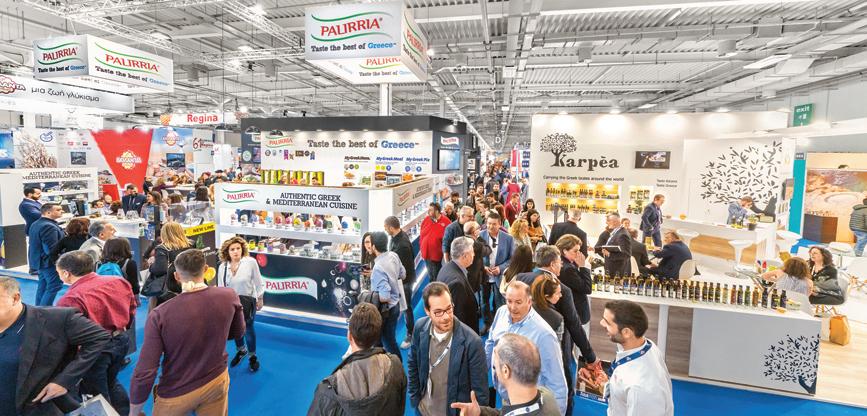
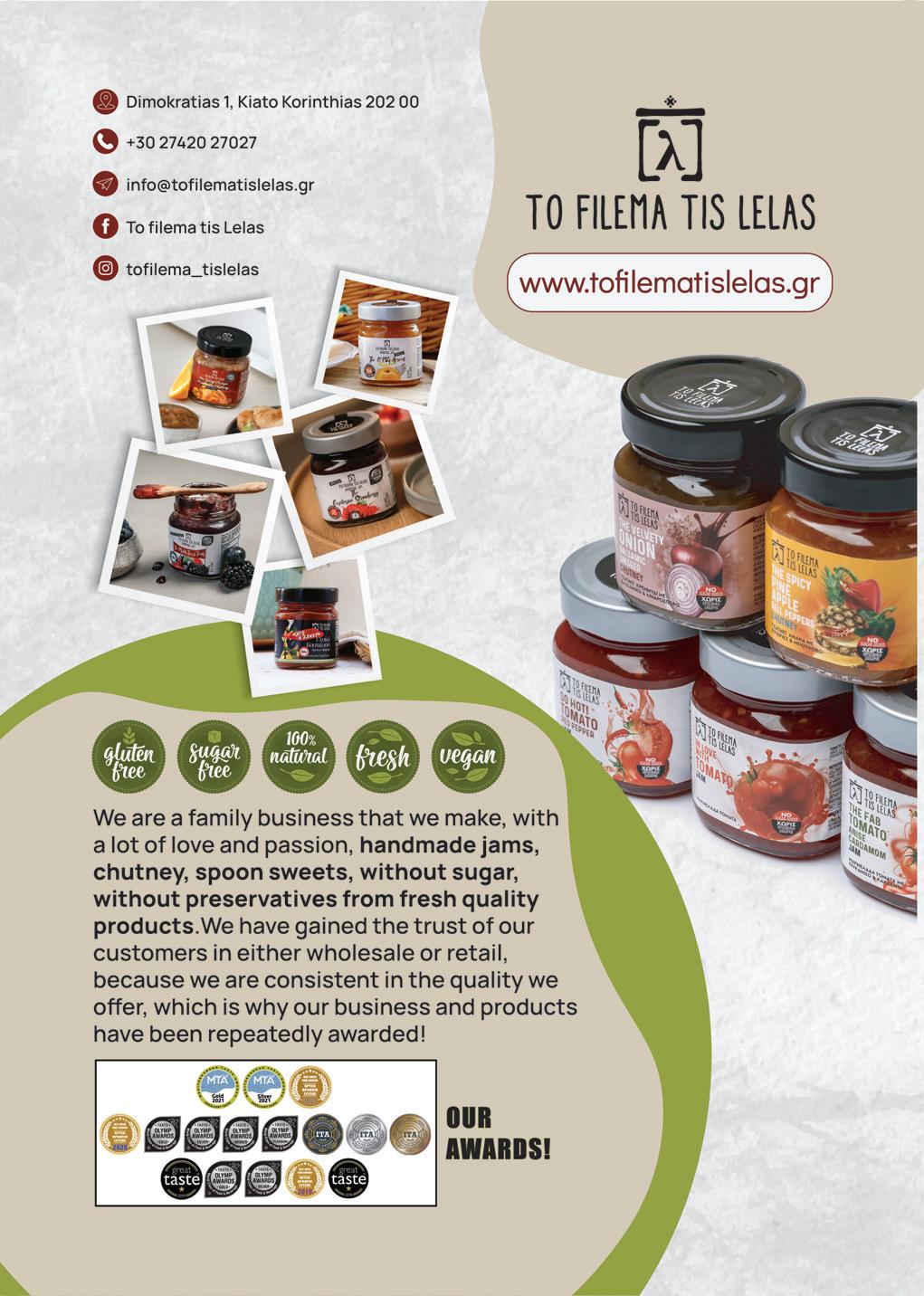
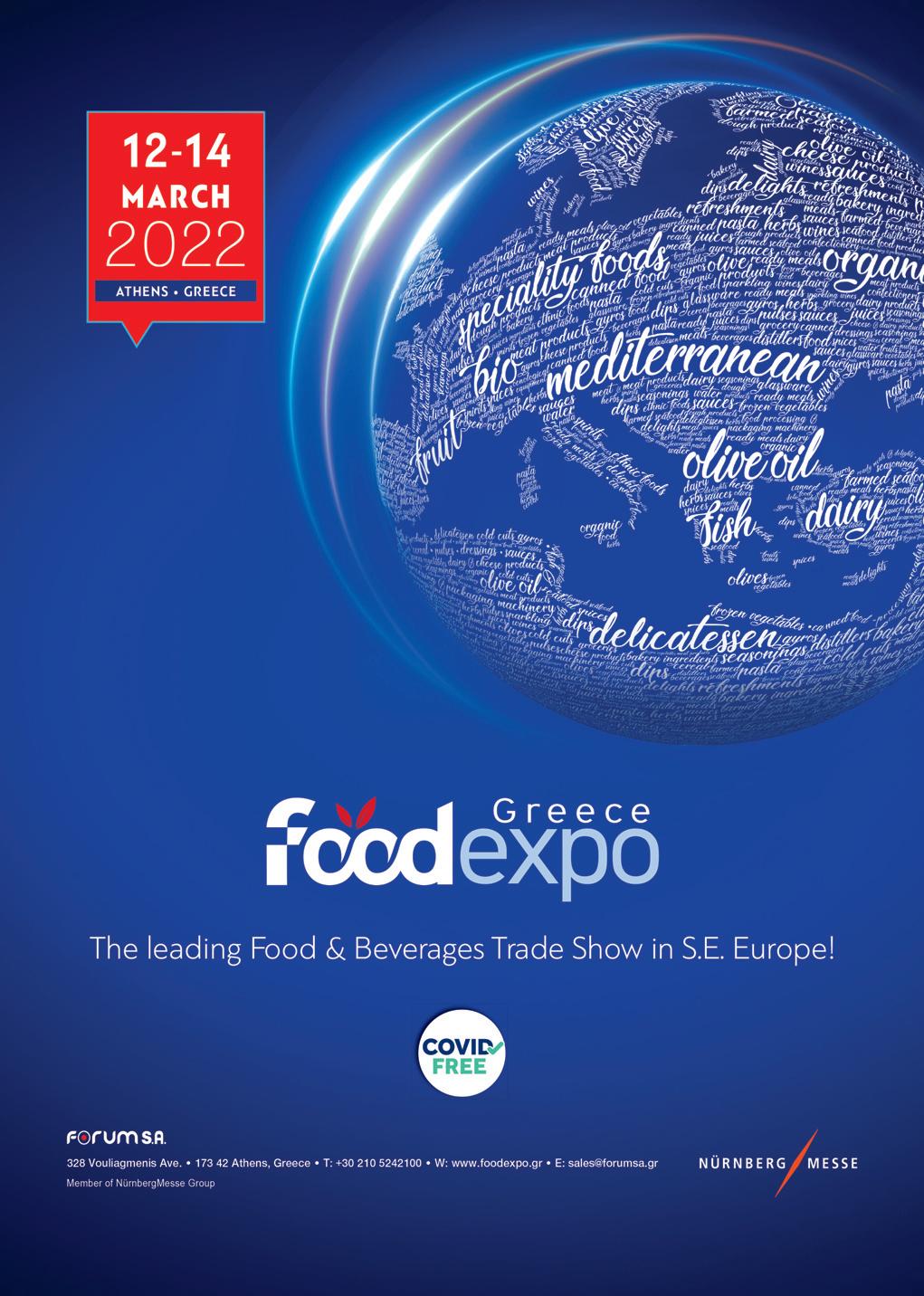
Getting ready to experience the tastes and smells of FOOD EXPO 2022


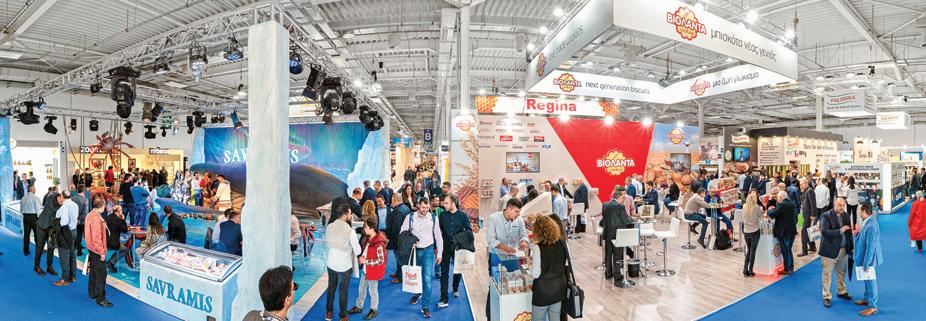
trade contacts and cannot be substituted by any other form of actions and activities.
According to these facts, FOOD EXPO 2022 is expected to attract 1,350 exhibitors, 30,000 visitors and 900 Hosted Buyers. The numbers are quite the same as the 2019 event.
What particular areas of the food supplier and buyer markets have grown over recent events?
Due to the nature of the show and its Mediterranean identity, dairy and cheese products as well as olive oil and olives will always play a significant role to the fields of interest of the trade show. Also,

through the last editions of the show there has been a huge interest in fresh fruit and vegetables as well as bio and health products.
For anyone new to the event, what are the main things they would experience if they were to attend FOOD EXPO 2022?
Visitors at FOOD EXPO 2022 will have the chance to discover under one roof the leading suppliers and food and beverage producers and reconnect with them after almost two years of absence of physical exhibitions.
They will also be able to attend B2B meetings with Greek and international exhibitors, evaluate competing solutions across every product category and make business deals.
In addition, visitors can explore a huge range of products and services all gathered in one place, saving time and money. They can discover traditional, local and modern Greek and Mediterranean food and drinks and give their business a competitive edge.
Attending FOOD EXPO 2022 means visitors will stay up-to-date with the latest trends and innovations in the sector, through seminars, workshops and events.
What items are new for 2022?
FOOD EXPO covers the needs of the Greek market, while at the same time fully responds to the export orientation of Greek manufacturing enterprises in the sector. At the same time, it brings together thousands of professionals from organised retail, wholesale, food and beverage industry, hotels and mass catering.
Which exhibiting companies or key industry personnel are creating the biggest buzz in the lead up to the show?
12-14 March 2022

The biggest buzz is being created by the unique Hosted Buyer Program’s participants which belong to a number of key categories, including: supermarkets and hypermarkets, food servers, food and wine importers, wholesalers, distributors, brokers and delicatessen stores.
From your professional experience, what do you consider to be the greatest challenges associated with organising an event such as this?
Despite the great internationalisation of the exhibition, we need to maintain its Mediterranean character and promote it as the top annual meeting point of business professionals of the food and beverage industry.
Finally, what is the main message you would like to promote to the readers of Inside Food & Drink?
FOOD EXPO, the largest food and beverage trade show in southeast Europe and one of the most significant of its kind internationally, is staging a strong comeback between 12-14 March 2022, in a covid free environment at the Metropolitan Expo exhibition centre!

Featuring 1,350 exhibitors from Greece and the rest of the world and 3,500 key food traders, FOOD EXPO 2022 is consolidating its leading position in the wider region while further strengthening its international reach. n


Afish processing business in the north of Scotland has received an eight-figure funding package from HSBC UK, backed by UK Export Finance (UKEF), as it sets its sights on new international markets.
Peterhead-based Denholm Seafoods, which champions Scotland’s high quality, sustainable seafood, will use the additional finance to support its ambitious overseas growth plans.
The pelagic fish business, which processes herring and mackerel caught from sustainable fisheries, is looking to expand in European and Asian markets as it promotes the quality of its Scottish origin fish.
The funding package was backed by a £15 million General Export Facility (GEF) backed by UKEF, the government’s export credit agency. The scheme, which was launched last December, has already provided over £120 million for businesses across the UK. It has made the UK government’s support more accessible, allowing Denholm and HSBC UK to take a longer-term view and underpins the management team’s growth aspirations.
Allan Stephen, Director at Denholm Seafoods, said: “Our growth plans are ambitious and, by utilising this funding, we’re excited to enter new markets and grow in existing ones. It is the quality of our product, coupled with this additional funding that will afford us this opportunity.
“As we invest in the future of Denholm Seafoods, we intend to progress the sustainability of our operations, by reducing our environmental impact as we drive the growth of our business forward.”
Denholm Seafoods processes pelagic fish caught from sustainable fisheries by its local fishing partners in the rich waters of the North East Atlantic. Its wide range of high quality pelagic fish products include mackerel, herring and herring roe, which are delivered fresh or frozen to customers in the UK and worldwide. Denholm Seafoods is part of the Denholm Group.
Mike Freer MP, Minister for Exports, said: “Scottish seafood is renowned around the world for its quality and focus on sustainability – and I’m delighted that UKEF is helping Denholm grow and sell more to the world.”
Denholm Seafoods currently exports 80% of its product while the remaining 20% supplies major retailers in the UK market.
Denholm Seafoods is part of the Denholm Group which operates in four sectors: shipping, logistics, seafoods and industrial services. The group was originally founded as a ship agent and factor by James Denholm in 1866, who was joined in the business by his brother John in 1869. Today, the fifth generation family business is still owned by John’s descendants and employs over 1,000 people.
Molson Coors Beverage Company has expanded its exclusive agreement with The Coca-Cola Company to develop and commercialise a brand of full-flavour alcohol beverages inspired by the US juice brand, Simply®.
“Over the past two years, we’ve seen success by shaking up existing categories with new brands that have clear, compelling points of difference, like Coca-Cola's Topo Chico® Hard Seltzer, Vizzy Hard Seltzer and ZOA Energy Drink,” said Michelle St. Jacques, Molson Coors’ Chief Marketing Officer. “Now, we have a huge opportunity to leverage the power of Simply® – a brand known for real juice and big flavour – to disrupt the full-flavour alcohol segment in a way that’s never been done before.”
This summer, Molson Coors will start by launching the Simply Spiked Lemonade™ variety pack, inspired by some of Simply®’s best-selling non-alcoholic products, including Strawberry Lemonade, Watermelon Lemonade, Blueberry Lemonade and, of course, Signature Lemonade.
As The Coca-Cola Company’s second-largest US brand for net revenue after Coca-Cola, Simply® is a $1 billion+ and growing brand.
“The Coca-Cola Company and Molson Coors have a thriving relationship in North America. The proof is in the success of Topo Chico Hard Seltzer’s national expansion and the introduction of Topo Chico Ranch Water Hard Seltzer,” said Dan White, Chief of New Revenue Streams, Coca-Cola North America Operating Unit.
“With this momentum, we are excited to expand our relationship with products inspired by another one of our most valuable brands: Simply®. We believe people will be excited to try this delicious beverage when it arrives on shelves later this year.”
Simply Spiked Lemonade will be sold in slim-can 12 packs as a variety pack, and 24oz standalone cans of select flavours.
Simply Spiked Lemonade and the national expansion of Topo Chico Hard Seltzer mark the latest initiatives to aggressively grow Molson Coors’ above premium portfolio as part of the company’s revitalisation plan.
Molson Coors Beverage Company will produce, distribute and market Simply Spiked Lemonade as part of an agreement with The Coca-Cola Company.

Glanbia Ireland, Ireland’s largest dairy processor, has launched an €18 million annual Sustainability Action Payment as part of a three-year programme to assist the company’s 5,000 milk suppliers in reducing their carbon footprint, enhancing water quality and biodiversity and improving air quality and soil health in line with Glanbia Ireland’s sustainability strategy, Living Proof.
As part of this initiative, dairy suppliers will receive 0.5 cent per litre (cpl) (including VAT) through delivering specific sustainability actions. This will equate to almost €3,000 in 2022 for the average supplier. Across the lifetime of this three-year programme, over €54 million in total will be made available to family farms as they continue to adopt a range of actions.
The measures are closely aligned with the climate action measures identified in Teagasc’s emissions reduction Marginal Abatement Cost Curve (MACC) climate plan.
Glanbia Co-op Chairman John Murphy said: “Irish farmers are renowned for producing high quality dairy products with world leading natural credentials. Our farmers are proud of their family farms and want to protect them for the next generation.
“We all have a role to play in climate action, water and biodiversity protection and air quality enhancement. It is important that our family farms are assisted as they continue to enhance the environmental and economic sustainability of their farms.
“This initiative is designed to reward suppliers for adopting a series of measures identified as key to delivering on our comprehensive sustainability strategy, Living Proof. As part of this initiative, there is a strong framework of measures for farmers to implement with verifiable proof-points.”
As part of Living Proof, Glanbia Ireland, along with its family farms, has pledged to deliver a 30% reduction in greenhouse gas
(GHG) emissions associated with each litre of milk produced by 2030 and has signed up to the internationally-recognised ScienceBased Targets initiative (SBTi). All of Glanbia Ireland’s dairy suppliers are accredited to the Bord Bia Sustainable Dairy Assurance Scheme (SDAS).
The Sustainability Action Payment will be made to all suppliers that deliver any seven sustainability actions from a total of 16 options.
These include: reducing carbon emissions by utilising multispecies swards and clover; measuring grass growth: improving the herd Economic Breeding Index (EBI) to deliver lower GHG emissions; milk recording and opting for FarmGen renewable energy generation.
Other options include: improving air quality through use of Low Emissions Slurry Spreading (LESS) equipment and the use of Protected Urea; supporting biodiversity by planting additional native trees and increasing hedgerows; protecting soil health and water quality through nutrient management planning; delivering ASSAP water quality improvement plans and water protection measures; supporting animal health and welfare by herd disease screening; improving udder health and participating in the innovative Twenty20 Beef Club.
Glanbia Ireland Chief Executive Jim Bergin said: “We believe that by working together, through support and education, we can continue to adopt changes in practices that deliver real environmental impact.
“As an organisation, we are firmly committed to working with our farmers to implement proven technologies and practices that will benefit the environmental performance of our suppliers’ family farms, as set out in our Living Proof strategy. We will continue to actively seek out leading edge technologies to further support our family farms in their endeavours.”

The latest news from across the global food and drink sector
Global taste and nutrition company Kerry Group has announced two major biotechnology acquisitions. In lateFebruary, the company reached agreement to acquire leading German biotechnology company c-LEcta. This follows the acqui sition of Mexican-based enzyme manufacturer Enmex in December 2021.
c-LEcta is a leading biotechnology innovation company specialising in precision fermentation, optimised bio-processing and bio-transformation for the creation of high-value targeted enzymes and ingredients. Based in Leipzig and employing over 100 people, c-LEcta has established itself as a leading innovator in disruptive new sciences for the pharmaceutical market, with a strong pipeline of functional bioactives across food, beverage and other consumer markets.
This strategically compelling combination will accelerate Kerry’s innovation capabilities in enzyme engineering, fermentation and bio-process development. Kerry’s broad market reach across food and pharma markets, combined with its deep enzyme applications expertise and integrated ingredient technology design, will enable and accelerate the growth potential of c-LEcta’s strong portfolio and technology capabilities.
Dr Marc Struhalla, founder and CEO of c-LEcta, commented: “We are very happy to join Kerry Group and their global presence in the food and pharmaceutical sectors gives us access to additional markets. At the same time, their expertise in ingredient technologies and applications is a perfect fit as we continue to drive our growth potential in the future. We will continue to collaborate with our existing industry partners and will of
course continue to produce and distribute our products for our valued customers.”
This acquisition will further support Kerry’s commitment to invest in the development of innovative sustainable technologies, which the company said will be at the heart of future sustainable food and health systems.
Commenting on the agreement with c-LEcta, Dr Albert McQuaid, Chief Science and Technology Officer of Kerry, said: “The food and pharmaceutical industries are on the cusp of a new wave of innovation where new developments in biotechnology, synthetic biology and precision fermentation are radically transforming these sectors.
“Our broad market reach across food and pharma markets, combined with our deep enzyme applications expertise and integrated ingredient technology design, will enable and accelerate the growth potential of c-LEcta’s strong portfolio and technology capabilities while also supporting us in the creation of tastier, more sustainable and healthier products.”
Enmex is a well-established enzyme manufacturer based in Mexico, supplying multiple bio-process solutions for food, beverage and animal nutrition markets. With a long history of partnering with global customers, Enmex has a complementary enzyme portfolio and a strong manufacturing infrastructure, which will extend Kerry’s fermentation and enzyme manufacturing capabilities into Latin America.
Kerry is the world’s leading taste and nutrition partner for the food, beverage and pharmaceutical markets, with its broad range of ingredient solutions reaching over one billion consumers around the world.


OneOrder, the new logistics company aimed at solving Egyptian restaurants’ supply chain inefficiencies, has announced its launch and successful completion of a $1 million fundraising campaign.
The fundraise was led by A15, the leading MENA venture capital firm, and renowned as one of the most prominent backers of early-stage start-ups in the region.
OneOrder is the first company of its kind in Egypt; a logistics company addressing the major inefficiencies faced by Egypt’s restaurants when sourcing supplies. It is the creation of leading Egyptian restaurateur Tamer Amer, the founder of Fuego Sushi and Longhorn Texas BBQ – two of Egypt’s most successful restaurant chains.
OneOrder is creating a platform to address the significant structural problem faced by Egyptian restaurants – interacting on a regular basis with a number of small, fragmented suppliers and vendors from whom they source their meat, vegetables and equipment.
According to Mr Amer, this suboptimal supply chain structure causes inconsistent and non-transparent pricing, unreliable quality which, in turn, gets passed onto restaurant customers, and irregular delivery timing, with supplies often late, limiting restaurants’ daily menu offerings.
OneOrder’s platform means Egyptian restaurants can buy all their needs from one application, with reliable quality, prices and timing.
“We are delighted to announce our launch and fundraise, and I thank A15 for their outstanding support,” said Mr Amer. “Given Egypt’s flourishing restaurant industry and the challenges it faces caused by a fragmented supply chain, OneOrder offers a much needed technology-enabled solution at the perfect time. My experience in the food and beverage industry means I know what restaurant owners need; it is a reliable, timely supply of quality goods, at a consistent price – without the stress of managing various suppliers on a daily basis.
OneOrder’s market opportunity is significant. Egypt has over 45,000 registered restaurants, but as many as a quarter of a million unregistered – all working and consuming supplies. In 2019, the United States Department of Agriculture estimated the overall F&B/hospitality market in Egypt to be $13 billion, with OneOrder expecting that figure to have increased substantially since then.
Market drivers are also compelling. The latest research by Fitch Ratings, the global ratings agency, forecasts 5.3% GDP growth in Egypt for 2021-2023, driven by strong private consumption and increasing tourism. Egypt is also building new cities such as New
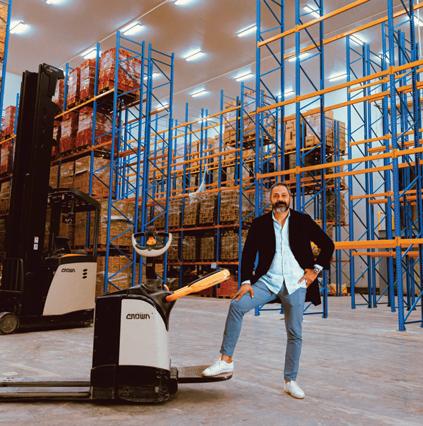
Alamein, with hotels and commerce expanding across the country – all of which is favourable for the F&B sector.
“We believe restaurants should be focused on delivering a highquality experience and service to their customers without having to worry about sourcing and procurement,” added Mr Amer. “We are the platform to deliver that. I’m very excited about the future as our market opportunity is huge. Egypt and the wider region are booming economically, and the food and beverage sector is only growing larger.”
Karim Beshara, General Partner at A15, said: “We are excited to partner with Tamer to solve one of the main challenges the food and beverages industry faces in the MENA region. By leveraging Tamer’s extensive experience as a successful restauranteur and A15’s history of building scalable technology platforms, we will aim to provide restaurants in the region with reliable, convenient and timely supplies that are consistently priced.”
There are similar restaurant supply chain inefficiencies in other countries in MENA and OneOrder aspires to, over time, expand its proposition geographically across the region.
Interesting and unusual food and drink facts from around the world

The most expensive food in the world is White Gold Caviar, costing $40,000 a teaspoon. The roe, which comes from a rare Albino sturgeon, is laced with 22carat gold.
Thought to be the oldest alcoholic drink in history, mead dates back over 9,000 years and is created by fermenting honey with water. It was once thought to be the drink of the gods.
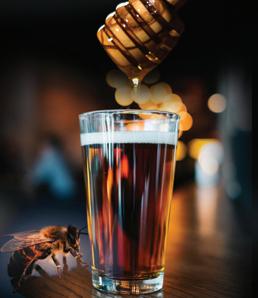
In 1989, Russia gave Pepsi 17 submarines, one frigate, one cruiser, and one destroyer by way of paying off a $3 billion debt. While the aging vessels were sold for scrap, for a brief period, Pepsi technically had the sixth largest navy in the world.

Isabella Islay is the most expensive whiskey on planet Earth. The bottle, encrusted with 8,500 diamonds, 300 rubies, and two bars of white gold, costs $6.2 million.
The noise made by a bottling plant can reach or even exceed 100 decibels. That’s approximately eight-times louder than an average vacuum cleaner.

There is no sincerer love than the love of food “ “ – George Bernard Shaw –

The world’s largest commercially available apple is the Sekai Ichi Apple, typically measuring between 30-46cm in circumference and weighing 900 grams.

Hailed as the rarest steak in the world, Olive Wagyu comes from cattle raised on dried olive peels mixed into their feed. It was developed in 2006 by a Japanese cattle farmer named Masaki Ishii and can cost over $300 a steak.

In 2019, two Yubari King Melons were sold at auction for $45,000, making them the most expensive fruits ever sold.
Most wasabi eaten outside of Japan, and in some cases even in the country itself, is just horseradish dyed green. This is due to how hard wasabi is to cultivate.
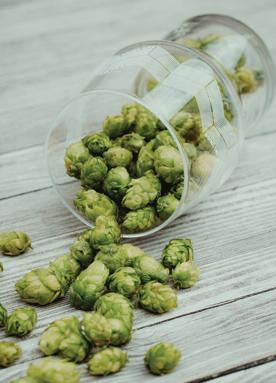
Retailing for about $200 per kilo, hop shoots are one of the most expensive vegetables by weight in the world. The expense is due to how labour-intensive they are to harvest.


What’s new in the industry?
The latest innovations, ideas and product launches

Kombucha drinks brand, Hip Pop, launches new CBD range
Fast-growing drinks brand, Hip Pop, has launched a new range of CBD infused Kombucha. Available in three flavours: Passionfruit & Guava, Cherry & Blackberry and Blood Orange & Grapefruit, each can of the plant-based drink is fortified with 1 billion live bacteria and contains a market-leading 20mg active CBD, combining all the gut friendly qualities of kombucha with the therapeutic benefits of CBD. Emma Thackray, co-founder of Hip Pop, said: “CBD is set to be a £1 billion industry in the UK by 2025, and we’ve wanted to expand into the space for some time to offer people a buzz without the booze. Our CBD kombucha cans contain all the benefits of our original kombucha, with the added bonus of 100% plant-based CBD which is novel foods compliant and pure 100% Cannabidiol.”
Cocuus System Ibérica, has revealed what 3D printed meat looks like. The company can now print cutlets, bacon, lamb ribs, salmon... and it does so at a speed of 8 kilograms per minute. The bioprinted cutlets are made from meat cells grown in a bioreactor. The company is also working on another version based on pea protein. The production of these steaks is based on ‘food to data-data to food’ technology, whereby the pieces are ‘converted into data’ with a CAT scan. They are then put back together by the company’s 3D food printers. Reddish in colour and with whitish fatty parts, these cutlets are one of the latest innovations from Cocuus System Ibérica.

Nutriswiss establishes gentle refining processes for organic oils
Nutriswiss, one of the leading refiners of edible oils and fats in Switzerland, uses a spe cial combination of physical refining processes to effectively purify organic oils and optimise their taste. After treatment, the oils are virtually free from process contaminants (3-MCPD, glycidol, trans fatty acids). Mineral oil residues, plasticizers, free fatty acids and other contaminants are effectively reduced while micronutrients are preserved. Unlike conventional physical refining at high temperatures, which creates process con taminants and destroys valuable micronutrients, the thermal load in “mild refining” processes remains comparatively low. This state-of-the-art process enables the gentle refining of oils in compliance with European organic guidelines and other certifications such as Demeter, Bioland and BioSuisse.
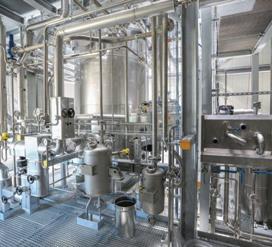


Loryma has developed two wheat starches that can be used to replace the recently banned additive white pigment titanium dioxide (E 171). Since the beginning of 2022, the European Food Safety Authority (EFSA) no longer allows E 171 to be used in foods, according to EU regulations. E 171 was a popular additive with a bright white colour used in frostings and cake decorations. Loryma’s alternatives are the native small-grain starch, Lory® Starch Iris, which optimises the appearance of dry or cold applications, and the resistant wheat starch, Lory® Starch Elara, which is suitable for applications that contain water and are heated. With a whiteness of approximately 98 on a scale of 0 (black) to 100 (white), both the small-grain starch and the resistant starch can be used to replace titanium dioxide in foods.

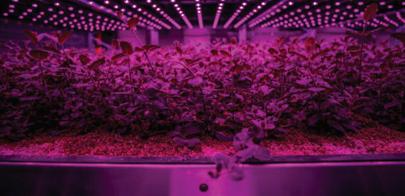
Agri-tech start-up Future Crops has developed the first indoor vertical farming system that grows its crops in a unique soil substrate composition. This method of cultivation not only delivers quality fresh produce, it enables the produce to reclaim its original characteristic taste and aromas that have been degraded following decades of pesticide use and industry pressures to place the focus on boosting output. The company utilises innovative data-driven technology to tailor the ideal environmental conditions for crops to thrive within a highly controlled, automated structure. Future Crops’ advanced technology maximises yield per area unit in comparison to traditional agriculture, with no compromise on quality.
Yemoja, Ltd, a marine ingredient start-up, has created a red microalgae for medium-rare plant-based burgers and steaks that adds authentic ‘bloody’ juiciness. Branded Ounje, meaning ‘food’ in the Yoruba language, this formulation mimics the red juices of real meat without harming animals or the planet and without the need for artificial colour additives. The company discovered that this marine ingredient, when combined with other derivatives from this same Porphyridium strain of algae, can provide a nutrient packed medium for rendering the sensory characteristics of juicy meats for plantbased meat and cultured meat products.


from crop to consumption
smartparc dowson food machinery brambati athanassiou i F D &

SmartParc is a revolutionary high-tech food manufacturing and distribution Park that seeks to redefine the future of the UK food industry. Headed by CEO and TSL Ltd’s co-founder, Jackie Wild, SmartParc is the realisation of a long-held dream. It paves the way for the sector to ‘cluster and collaborate’ on sustainable production, to drive down operating costs, and to deliver an exciting range of benefits to tenants, employees, the local community and the environment. Profile by Andy Probert.

Infectious and passionate, Jackie Wild is the living, breathing embodiment of SmartParc. She is a staunch advocate of the need for innovation and change in the UK’s food systems and supply chains. She is also determined to do something about these challenges, by creating an exciting new future for food businesses, which is more efficient, sustainable and successful.
For her, SmartParc is the fulfilment of a long-held vision, based on many years of studying these problems, and brainstorming solutions. She and her team have drawn together the best elements of the industry’s supply chain, and fused them all together on one site.
The concept of a centralised, high-tech food manufacturing and distribution hub emerged through Ms Wild’s more than 20 years’ experience of leading her global construction company, TSL Ltd. TSL is an international business that delivers turnkey capital projects for clients in food, pharmaceuticals, logistics, data centres, and high-tech manufacturing.
The TSL team has successfully worked with many industry-leading names over the years – including Tesco, GSK, HelloFresh, and Greencore. Projects have ranged from feasibility studies, to design, and construction, to delivering process efficiencies (including AI, automation, and robotics). The business also has a strong track record in facilities maintenance and management as well as complete property development.
The skills and experience acquired from these projects are now vividly being brought to life in the SmartParc project.








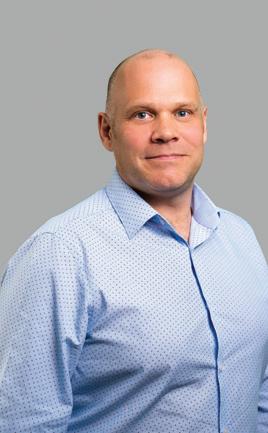

SmartParc is now fast coming into view –moving from blue-sky thinking to clear 2022 reality. Major food companies are beginning to queue up to lease units on the 155-acre site in Spondon, just outside Derby city centre.
“The SmartParc team is passionate about bringing all the skills we have learned, to help the food industry transition from where it is now, to a more sustainable future,” said Ms Wild. “The SmartParc formula will help to solve many of the industry’s key challenges, including climate change, labour shortages and supply chain pressures.
“SmartParc is the culmination of all our teams’ knowledge and experience. It’s a cluster site geared specifically towards the needs of food businesses. Buildings will be specifically designed for companies involved in food production. Occupiers will benefit from significant cost savings from shared energy, utilities, logistics and security services.”
The former Celanese site, to the east of Derby city centre, was first identified as an ideal location for SmartParc in 2020. Outline planning permission was approved in June





2021. The first building is due to be handed over in April 2022.
The 2.3 million sqft park will provide food manufacturing facilities ranging from start-up incubation units to largescale manufacturing facilities. Buildings vary in size from 5,000 sqft, right up to 400,000 sqft.
SmartParc will also be home to an exciting new Food Manufacturing Technology Centre of Excellence, supported by a £6.85 million grant from central government. The aim of this facility will be to encourage innovation and new ways of thinking in food production. The centre will act as a catalyst for growth for local food businesses. It will also offer education opportunities to encourage local people to pursue careers in food systems and supply chains.
SEGRO plc, a major British property investment and development company, will become the landlord for SmartParc tenants. They will provide a multi-million-pound investment to regenerate the brownfield site.
With additional grant funding totalling £12 million from the UK Government’s Getting Building Fund, the total investment on the SmartParc site is predicted to top £300 million.
While SEGRO will effectively act as landlord and investment partner, SmartParc will provide a full range of onsite managed services. These are designed to support the food community to increase production efficiency and drive down costs through collaborative working.
Ms Wild is keen to draw attention to SmartParc’s revolutionary energy-sharing infrastructure. This will utilise wind and solar power, combined with central services, to deliver the country’s most sustainable food production community. It will enable manufacturers to reduce the carbon impact of food production, at the same time as saving money.
“SmartParc will be home to the first lowcarbon food manufacturing community in the UK. It offers a way for food businesses to collaborate to meet the challenges of sustainable production, reduce costs and address the need for efficient, direct routes to consumers.”
With part of the CapEx already done, potential tenants will also benefit from the shared services model.
“There will be solar panels on buildings, so we will be creating a smart energy








sharing platform, that allows businesses to benefit from variations in supply and demand of power across SmartParc,” Ms Wild added.
As part of a new forward-thinking blueprint for the food industry, the SmartParc ecosystem will look to harness new technologies, such as vertical farming and cellular agriculture. These innovations will minimise the impact of weather and other variables on producing sustainable food.
SmartParc will create 5,000 direct jobs, and enable a new collaborative, flexible work model to fit in with people’s evolving lifestyles. The ambition is to make food production an attractive employment option for the local community in Derby.
“We looked at all the issues a food company faces today, when thinking of moving into a new building. We think the SmartParc formula offers potential tenants everything they need to make their business a success,” Ms Wild detailed.
A centralised distribution hub will allow tenants to consolidate the delivery of goods in and out of the park. This will streamline the supply chain, further reducing costs for occupiers, and improving sustainability by eliminating food miles.
Ms Wild said: “It is our goal to build the world’s first true cluster site for food manufacturing and distribution. The creation of this dedicated asset class is pivotal in achieving a more sustainable future for food production, and giving a framework for the food industry to build upon.
“It’s a real step-change for the food industry, setting up this new asset class. We are creating a business model where
food companies can plug in to shared services, whilst also obtaining additional funding, that allows them to transition into these new spaces.”
A ring of steel will be set up around SmartParc to ensure security, and there will also be shared maintenance, engineering, and hygiene services.
“We are trying to address the challenges faced by the food industry collectively, by fostering a culture of collaboration. Another important element will be bringing in raw materials together, so we will create a centralised warehouse hub.”
She added: “SmartParc is the starting point for change through collaboration.

That opportunity has never existed before. It’s what the industry needs and it sets an example, which we believe will encourage the government to invest further.”
According to Ms Wild, there is already significant interest in the SmartParc concept. UK manufacturers, retailers, vertical farming ventures, alternative protein companies and secondary producers are all in talks to locate at the new site.
Ms Wild wants to replicate the SmartParc model at seven locations around the UK, clustering complementary food and drinks providers in each one.
“We also have the ambition to scale around the world. There has been a lot of interest from abroad in delivering similar SmartParcs in other countries.
“SmartParc creates a scalable blueprint for food production. We can export our skills and know-how in creating food production communities to other markets. It is an exciting proposition.”
She added: “SEGRO has been an amazing partner and is hugely committed to SmartParc’s future success and to the food companies that will flourish here. Together we want to be a part of the stepchange the industry needs. SmartParc is key part of that transformation.
“It’s taken a lot to get here, and it has been hard, as it requires a new way of working. To me, we’re only at base camp, but all the stars are aligning. We can now move forward with confidence and at pace, as SmartParc becomes home to the next food revolution.”

When most of us buy a pre-sliced loaf of bread, or a pack of hamburger rolls, few of us stop to think about the journey that those items took to reach that shelf fresh, perfectly baked and ready for your table. Dowson Food Machinery is part of the bakery value chain that makes that purchase possible. The company’s Sales Manager, Lee Croucher, unveiled the machines that ensure that your favourite baked goods are always available. Article by Richard Hagan.
Let’s be honest: we’re spoiled. We watch our movies and TV shows ondemand, on days and at times that are convenient for us. We buy products without ever setting foot in a shop or even leaving the house, and then they’re delivered to our door the next day. And we never have to wonder about the answer to any question because we carry the power of the internet – the sum total of human knowledge – in our pockets wherever we go.
So it’s difficult for some of us to imagine that pre-sliced loaves of bread – something we accept as a common convenience today – were once such a novelty that the first pre-sliced loaf was marketed specifically on the fact that it was sold pre-sliced. That marketing campaign spawned the nowcommon phrase, ‘the best thing since sliced bread’.
While pre-sliced loaves are no longer at the forefront of marketing campaigns, the technology responsible for their creation hasn’t stood still. Far from it.
One of the companies leading the charge in the evolution of the machinery that gave us sliced bread – not to mention the many behind-the-scenes bakery innovations since then – is Dowson Food Machinery.
A proven reputation
Dowson Food Machinery was established in 1982 in Yorkshire and, according to Sales Manager Lee Croucher, it soon established itself as a vital player in the bakery industry value chain – a position it still holds today.
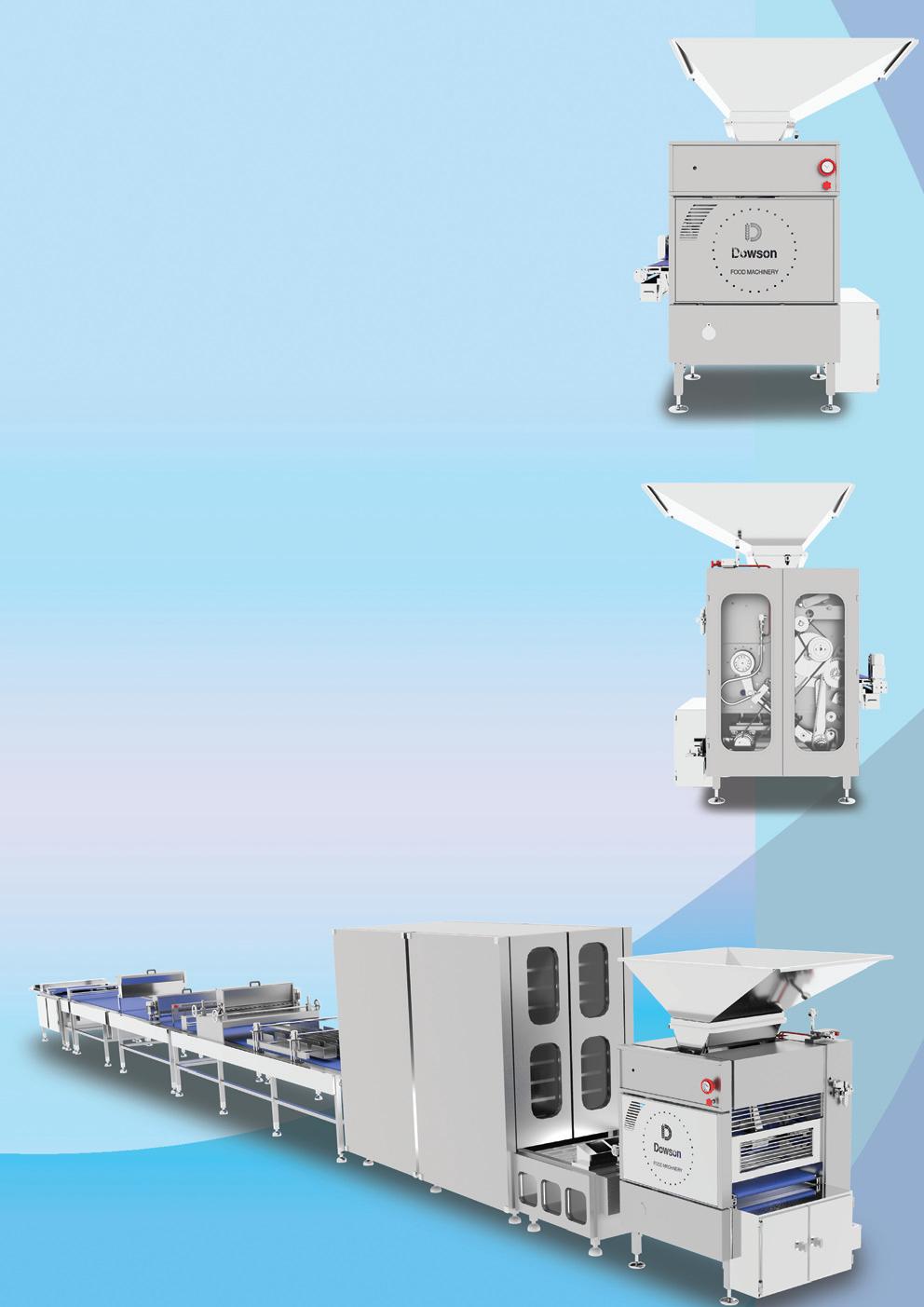
“The company developed (and still maintains) a reputation for providing quality British engineering solutions to often very complex bakery production challenges,” he said. “We supply bespoke equipment, service and support to many of the biggest bakery groups, as well as to smaller independent, artisanal bakeries globally.”
Dowson’s portfolio is built around two main production ranges: machinery for dough handling at the beginning of a bakery production line – including bread, tortillas, wraps, burger buns and other rolls – and then the machinery that receives, slices and packs the baked products once they come out of the oven. It also offers machinery for dicing bread products up into croutons.
The company’s full engineering and design department is also always on hand to ensure that it is able to service even the most challenging of client production needs.
In 2017, Dowson moved into its huge new state-of-the-art, purpose-built facility. With a footprint of 48,000 sqft, its modern factory hosts the company’s manufacturing lines for its slicers, baggers, dividers and crouton cutters, along with its tortilla and bun machinery production lines. Unusually for this industry, the company’s factory is a modern, custom-built facility.
“It’s modernised and future-proofed,” confirmed Mr Croucher. “There’s less maintenance, it’s more


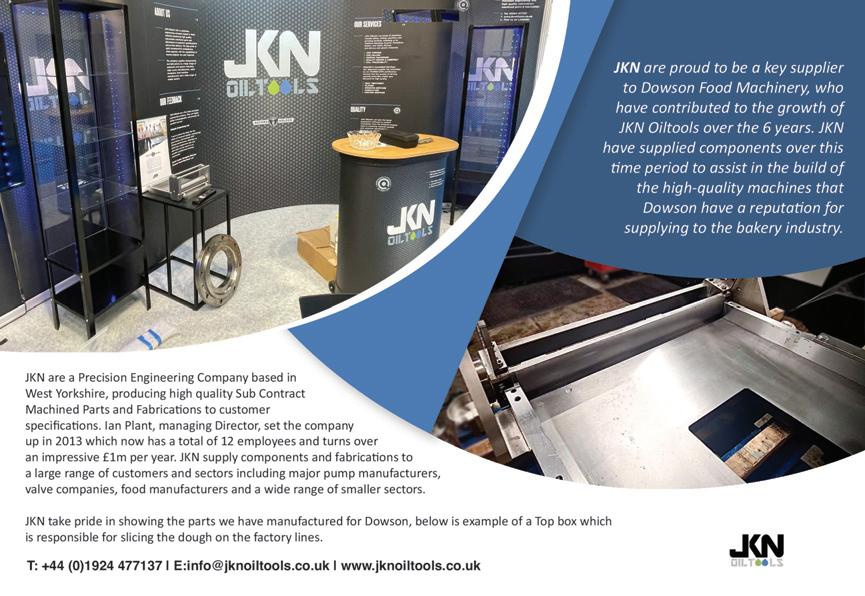



environmentally-friendly and it’s generally a better place to work.” The facility is also a great promotional tool for the company’s clients.
“We’re able to show our clients a nice, modern, clean facility. It adds weight to our proposals to them. It shows that we’re reinvesting in all areas of the business and that gives them the confidence to move forward with us.”
Altogether, Dowson Food Machinery employs approximately 50 staff – a complement that is constantly growing to meet the ever-increasing demand for the company’s equipment.
Tasty tortilla technology
Dowson’s tortilla handling equipment is a uniquely popular range with customers around the world.
“We produce a lot of equipment for tortilla lines,” said Mr Croucher. “We’ll typically supply the front end machinery such as the divider moulder – which divides up the dough into dough balls. This part of a tortilla production line is usually the most expensive. We supply a lot of these into Mexico, America and Poland.”
A European client recently ordered a large tortilla installation. Mr Croucher
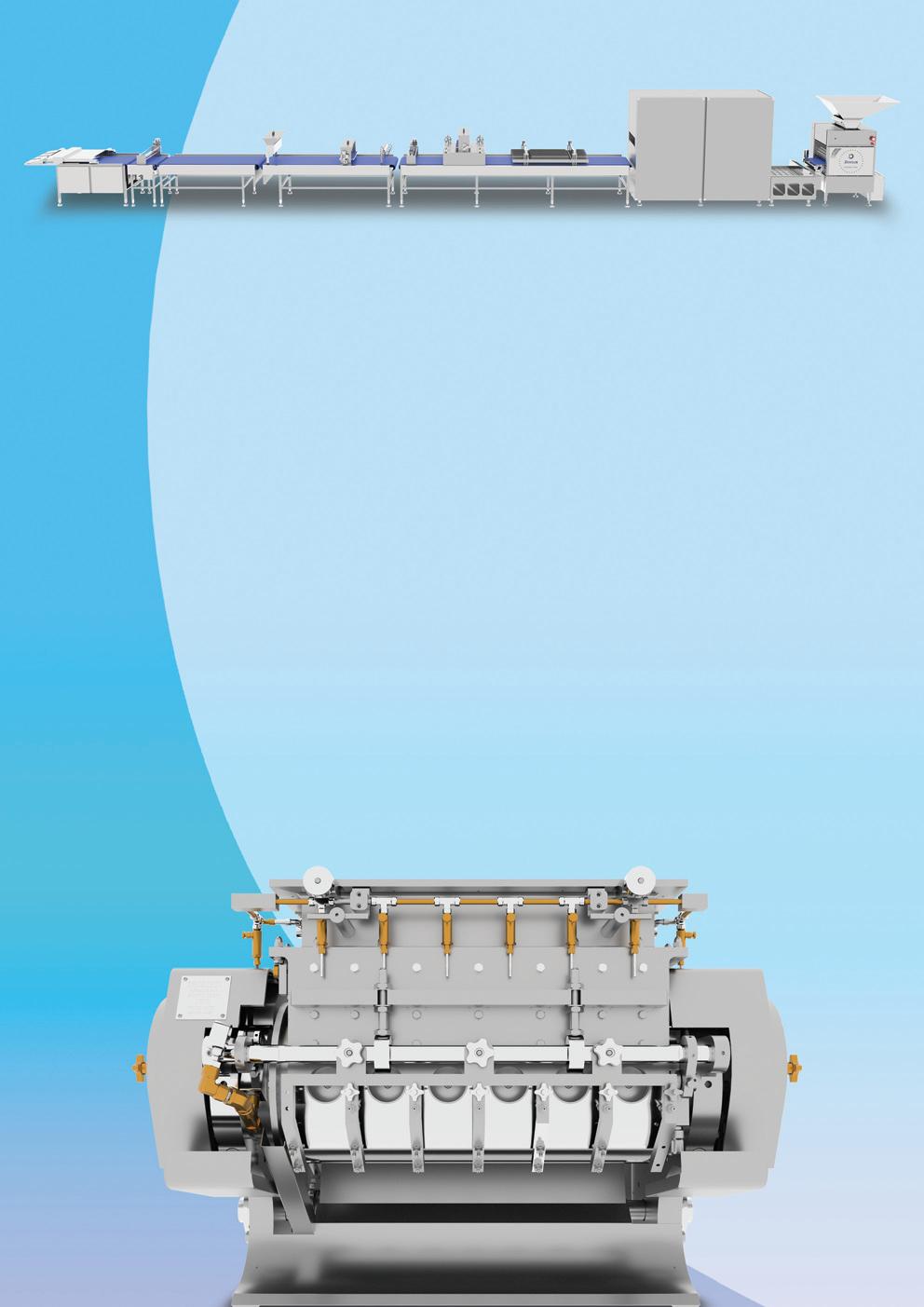
revealed the project, which is currently being commissioned, has a sevenfigure valuation.
“The client is very excited because they used to buy the tortilla product in, but they’ve now invested in their own capacity. So it’s the start of a new chapter in product development for the customer. To support them, we’ve provided our process expertise and knowledge at every step of the way and will continue to do so.”
Meanwhile, the company has recently delivered a £400,000 Dough Divider equipment order to a client in Poland, and a similar £600,000 order of Dough Dividers to a US client. However, its nontortilla production equipment continues to see encouraging growth as well, according to Mr Croucher.
“Earlier in 2021 we delivered a UK order worth £250,000 of Dough Dividers and a £500,000 order of noodle line equipment into the Asian market,” he recalled. “We also supplied a custom-built extrawide slicer for artisan bread, to the value of £65,000. In addition, to these mentioned orders, there are many orders of bread slicing and bagging machines that are being manufactured but have yet to be delivered for clients across Europe.
With Covid-related lockdowns forcing consumers globally to cook and eat more frequently at home, companies operating in the food production space, including Dowson, have noted the emergence of a variety of new food trends.
“We’ve seen a worldwide increase in wrap sales, which in turn means that we have sold many more divider/rounder machines than usual,” remarked Mr Croucher. “On top of that, we’ve seen a change in bread sales to a more artisan-style product for which we have developed a dedicated slicer.”
The shift to artisanal bread and wraps is indicative of consumers who are looking for meal solutions that are quick and easy to prepare, but that’s not the whole picture.
“People are reducing their intake of bread products, so for example, they’re making a pizza on a wrap so that the quantity of bread involved is much less,” Mr Croucher detailed. “Wraps are also quite a universal product that you can use for a variety of meal types.”
He added: “Artisan sourdough products are also gaining in popularity, and our artisan bread slicers will slice those, too. While we expect tinned bread to rebound in popularity at some point, for now, sourdough bread and wraps are on-trend.”
For those of us not intimately involved in dough handling, it may come as a surprise that gluten-free dough handling requires specialised machinery. Gluten-free products are becoming increasingly popular

and consequently, Dowson has developed specialised gluten-free dough handling equipment for clients wishing to embrace gluten-free production lines.
“There are slightly different components in gluten-free machinery,” noted Mr Croucher. “The dough isn’t as easy to mould, and you also want to prevent it from sticking together. Therefore, we have to tweak and alter certain parts of the machinery, but there’s no one-size-fits-all approach.
“That’s why we ask loads of questions at the beginning of the enquiry to quantify a client’s particular needs correctly.We’ll ask questions like, ‘What is the size of the product? What are your recipes? What is the required quantity?’. Some clients come into the production business having never made a thing in

their life. That’s where we are able to step in and help them with our knowledge and engineering expertise.”
With the ongoing global demand for its tortilla equipment showing no signs of slowing, Dowson is looking to aggressively increase its market share in that space. “We’re also looking to expand into different methods of slicing,” Mr Croucher confirmed.
The company has set itself ambitious sales targets as well to increase turnover by 50% in the 2022 financial year in difficult circumstances.
“On top of that sales target, we want to expand our fabrication capacity significantly by investing in new equipment,” he concluded. n

Italian company Brambati, supplier of turnkey plants for the food industry, has further increased its focus on the innovations required by constantly evolving market environments. Company President Fabrizio Brambati spoke to Romana Moares about how the company has adapted during Covid, and why he is very optimistic for Brambati’s future.
Set up by Francesco Brambati in 1945, Brambati has evolved into an engineering master in its field. Today it boasts huge – and ever-growing – experience, knowledge and reliability in its sector. Now run by the third generation, the company designs, supplies and installs turnkey food processing plants and equipment, complete with control and automation systems, with most being designed for the coffee roasting sector.
We spoke to Fabrizio Brambati in 2020, in the first months of the global pandemic, and now we have come back to see how the company has adjusted its operations and its offering to new market conditions.
“We have continued on our journey of growing the customer base as well as further supporting our R&D to innovate our range in line with our customers’ requirements,” said Mr Brambati, adding that each of the company’s systems is a design that incorporates technology, engineering and computer science.
One of Brambati’s most emotional moments of last year was the company’s participation in the HostMilano exhibition, a major show for the hospitality sector, which physically

took place in October 2021. At the company’s stand, Brambati showcased its recent innovations and demonstrated a remotely controlled roaster in its Brambati Advanced Food Lab, which has obtained the SCA Premier Training Campus certification.
The Food Lab, opened in 2018, is a prime example of Brambati’s continuing innovation focus. It serves as a centre of research and development on technology for food product processing, and is also available for the company’s customers as required.
“After the lockdowns, periods of isolation and remote working, the Milan exhibition indeed was a major event, and a glimpse into what life may look like again once some kind of normality returns,” Mr Brambati remarked. “We were able to demonstrate how the business has been enhanced during the pandemic, with its increased focus on the technical aspects of the machines as well as on a higher degree of flexibility, as required by the current market.”
A deep customer focus has always been one of the company’s differentiators, and Brambati has managed to stay close to its customers over the last two years – despite the travel restrictions and other business limitations – as well as maintaining a high level of trust. The systems were duly supplied to
customers as agreed, and the company held a number of webinars and sessions online so that customers felt Brambati was always at their side.
Generally speaking, Brambati is a company that supplies coffee processing plants. The range of Brambati’s roasters includes machines capable of roasting 5kg of beans per batch for customers at the smaller end of the market, up to 600 kg per batch for the largest machine. They can supply state-of-the-art roasters that are equipped with extremely advanced managing software or a simplified version, both allowing a full control of the roasting process and great flexibility in setting parameters and recipes. Everything is done in accordance to the specific exigencies of the customer.
Brambati can deliver complete turnkey plants for the coffee industry from the reception of green coffee, through to the feeding of packaging machines, with management systems for the different stages of cleaning, storage, weighing, blending, roasting, conveying, grinding and degassing.
Coffee plants account for the largest proportion of revenues, but the company also produces plants for handling other


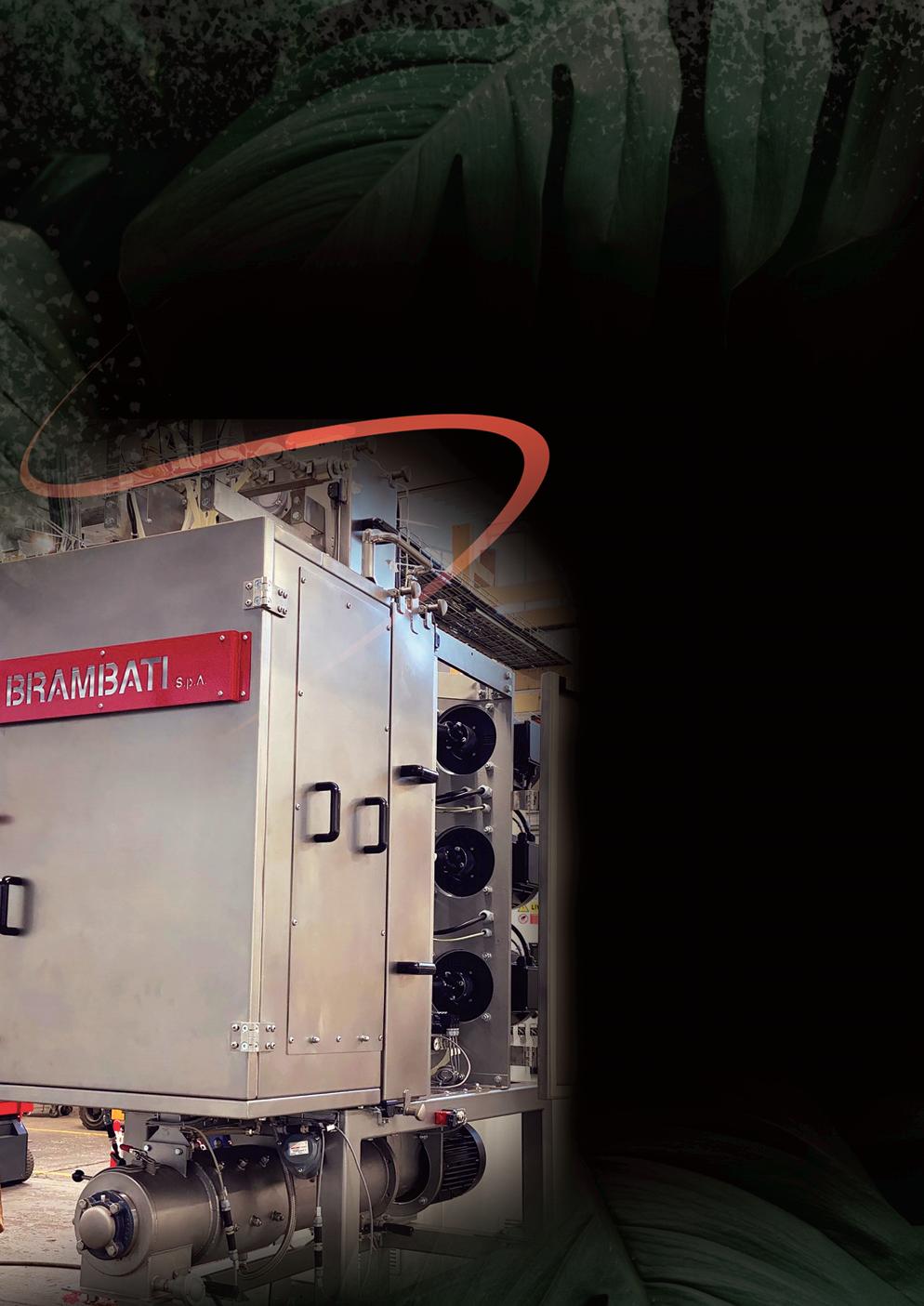
raw materials to be utilised in general food production, such as for pasta, biscuits, bread and other general foodstuffs. Brambati’s machines represent the peak of their class, and are present on all the continents of the world.
“Innovation was already a key theme during the time when the company was run by my father and uncle,” commented Mr Brambati. “Our machines are being improved all the time, with the current focus being on digitisation and remote control. Over the last two years, we have further improved this feature, specifically the remote control software, which is now more accurate. In addition, we have now completed the development of predictive maintenance software that will make a big difference to customers’ operating costs.”
Sustainability, confirmed Mr Brambati, is another company focus – but the Managing Director was keen to highlight that this has always been high on the agenda, long before the term became fashionable.
“Companies are now investing in sustainability and we are no different, being a holder of Ecovadis Gold. Internally, we have introduced a number of environmental measures such as the installation of photovoltaic cells and minimising material waste; we are pushing the concept of sustainability throughout the whole of our supply chain.”
He added: “Externally, our R&D team reflects customers’ requirements in innovated machines with reduced emissions and low energy consumption, while providing the same performance or even better.”
Mr Brambati affirmed that despite continuing challenges arisen from the pandemic, such as increased raw material costs and a general shortage of materials, the company has won new customers in new markets. This is a business that is striving for constant growth.
“Our plants last a long time, so growth is secured by increasing the number of customers. Despite the pandemic, 2021 was a successful year for us – we delivered our first plant to Armenia, and confirmed our presence in the Far and Middle East, with also the first plant supplied to Kuwait, a new country for us. We also continue to be very strong in Europe.”

Innovation was already a key theme during the time when the company was run by my father and uncle “ “
He added: “Of course, Italy is our reference market, but for example France was a very active market last year. Overall, our machines have been installed in over 70 countries.”
Mr Brambati confirmed that coffee plants remained the strongest business line in 2021, but other segments generated positive results as well. Brambati supplied its first complete plant for soya processing, a new market for the company and equipment and machinery for raw material handling and dosing for the well-known general food processing sector.
He concluded: “We are confident that we are going in the right direction, as verified by the increasing number of new customers, as well as repeated purchases from existing customers. Strengthened by these two difficult years, we are set to grow the business in years to come.” n

Nine decades of growth, of meeting and anticipating customer requirements and expectations – that is the legacy of Greek Athanassiou, and the basis for its further development in today’s fast-evolving markets. Romana Moares reports.
Established in 1928, Athanassiou started off as a tobacco retail outlet at the centre of Athens. Today, the company is not only one of the largest distributors in the tobacco sector in Greece, but has managed to secure continuous growth as a result of divesting into the fast moving consumer goods (FMCG) segment, with an offering that complements its traditional tobacco expertise.
“The success of the company is the result of its ability to meet the requirements of the partners it represents and the ability to correspond to market changes and trends promptly and reliably,” said Yiannis Zarkadis, Chief Commercial Officer.
“Our well-organised network of partners throughout Greece and our extensive know-how in sales, marketing and logistics are the main factors that safe -

guard the company’s continuous growth and long-term collaborations.”
Athanassiou was the first tobacco company to introduce to the Greek market popular international brand names such as R.J. Reynolds, Meharis, Panther, Prince, Silk Cut and Benson & Hedges during the 1950s, 60s and 70s.
Later on, in 1999, the company launched its strategic collaboration with the newly formed Japan Tobacco Industries (JTI), when Japan Tobacco Inc purchased the international tobacco operations of the US multinational R.J. Reynolds.
Since then, Athanassiou has been JTI’s exclusive distributor in the Greek market.
A turning point came in 2013, when Athanassiou expanded into fast moving consumer goods, with particular focus on food and confectionery. Another business
expansion was achieved three years ago, when the company penetrated tobacco and FMCG wholesale trade through the establishment of its own wholesale subsidiary in Corinth.
“Today, Athanassiou is one of the largest importers and distributors of tobacco and food products on the Greek market. Tobacco is the dominant category, but since 2013 we have been expanding aggressively in food and confectionery products,” commented Mr Zarkadis, adding that premium-quality healthy food products is the category that shows the greatest potential.
The company has recently developed a new strategic plan entitled Vision To Action (V2A). The plan runs up to 2028, the year of the company’s 100th
anniversary. As a family business now in its third generation of ownership, it’s an exceptional milestone.
“The V2A answers both ‘what’ and ‘how’ in terms of tasks, thus perfectly connecting effectiveness efficiency, the soft elements of an organisation – such as the vision, mission, purpose and values –with the hard elements, namely the key priorities, strategic pillars and jobs to be done,” Mr Zarkadis explained.
In pursuing its new vision, the company is set to draw on its competitive advantages. These include financial robustness as one of the largest commercial companies in Greece, expertise in the tobacco sector based on over 90 years of experience, development of its FMCG pillar, as well as commercial excellence with a wide-ranging market reach of nearly 22,000 points of sale.
In addition, Athanassiou also boasts operational excellence. The company has privately-owned 30,000 sqm facilities in Athens, warehouses and offices of 12,500
sqm with a capacity of 12,000 pallets, all operating under world-class standards, and the company is also ISO 22000 certified and an Authorized Economic Operator (AEO).
Investing in and implementing the latest industry technologies are part of the company’s ongoing development.
“In order to respond to changing market conditions, we invest in technologies and systems that allow us to communicate with our clients and consumers directly. Within this context, we have the ability to interconnect with the ecommerce platforms used by our partners, in order to manage and execute B2B and B2C orders,” outlined Mr Zarkadis.
For over 90 years, Athanassiou has specialised in the distribution of all categories of tobacco products on the Greek market. Being the first one to introduce some of the most popular international brands in Greece, it now holds a leading

position in the exclusive representation of premium tobacco products, cigars and smoking accessories.
In essence, since 1954 Athanassiou has been the exclusive distributor in Greece of all the tobacco products of the multinational company Japan Tobacco International. JTI is one of the leading tobacco production companies in the world, and the market leader in conventional products in Greece.
“It is an honour that this great company has entrusted us with the route to market of their portfolio on the Greek market for so many decades,” said Mr Zarkadis.
Athanassiou’s portfolio includes other leading tobacco companies such as Cortez, a leader in premium cigars with brands like Neos and Oliva; Pöschl Tabak, whose Pueblo brand is the best-selling rolling tobacco in the world without additives; and Mac Baren Tobacco with leading premium and Amphora.
Reusable lighter brand Clipper, produced by Flamagas, is another product offered by
Athanassiou, as is Drew Estate, a boutique cigar company whose brands include Liga Privada and Undercrown.
In food and confectionery, Athanassiou distributes high-quality tasty products, such as jams, breadsticks, rusks, croutons, cereals, potato chips, savoury sticks, pretzels, sweetener s /sugar substitutes, cookies, puff pastry and ladyfinger biscuits. The mouth-watering list of tasty treats also includes wafers, chocolates, protein bars, jellies, candies, ice lollies with natural fruit juice, as well as non-alcoholic beverages like cocoa powder, organic tea, soft drinks and isotonic drinks. Partners on the FMCG side include Fotoni, a leading confectionary products and fine foods distributor in Greece, whose international brands include Lorenz (snacks), ST. DALFOUR (jams), BONOMI (bakery), PEZ (confectionery), GG Scandinavian Bran (high-fibre crispbreads), Lotus (biscuits), and many more.
“We plan to expand the food and nonfood categories in the future, focusing on high quality, health benefits, and having a positive impact on the planet and society,” affirmed Mr Zarkadis.
Mr Zarkadis emphasised that the biggest asset of the company is its people – rightly considered the basis of the business’ long and successful development.
“We provide excellent working conditions for our staff, and we care for their progress by offering continuous training and development programmes and rewarding their endeavours and excellence,” he said.
“Also, gender equality and equal opportunities for all are very important to us. This is a global trend and we believe in it. Women in Leadership (WIL) can bring us a lot of the emotional intelligence that is so much needed in business and in the world today.”

External relations with its list of illustrious partners and brands are just as important, underlined Mr Zarkadis.
“Our partners and suppliers have played a key role in our success and growth. We consider them as part of the picture in our strategic planning approach,” he said. “Our philosophy is to build long-standing relations with them – and this is very well proved throughout our history, since we have collaborated with many of them for many years and decades.
“Our relations are characterised by high professional standards, goodwill, openness, flexibility, responsibility and credibility,” he added. “Credibility is a key word for Athanassiou. And of course, trust and care are of paramount importance for us.”
Mr Zarkadis was keen to point out that the excellent operational standards of the company ensure a high level of execution for each stage of the supply chain – for the
management, transport, distribution and promotion of goods. The well-organised commercial structure together with the strong distribution network ensure speedto-market, deep distribution reach and excellent execution at the points of sale for the portfolios of the company’s partners.
Investment has always been a key factor in the company’s growth, and the company spends substantial amounts annually on the maintenance, development and upgrading of its ultra-modern facilities and infrastructure.
“One of the most important strategic decisions and investments achieved

during the last decade was when the family decided to expand and penetrate the fast-moving consumer goods sector,” Mr Zarkadis reflected. “This was a really innovative decision for that time for a big tobacco distributor like us.
“We are determined to succeed in this sector and become the preferred partner as a fast moving consumer goods distributor too. This requires constant investment and a great effort, as this is a mature and very competitive sector in Greece.”
He added: “Throughout the years, and particularly now, we invest in our people, in terms of attracting talent and in upgrading the capabilities and skills
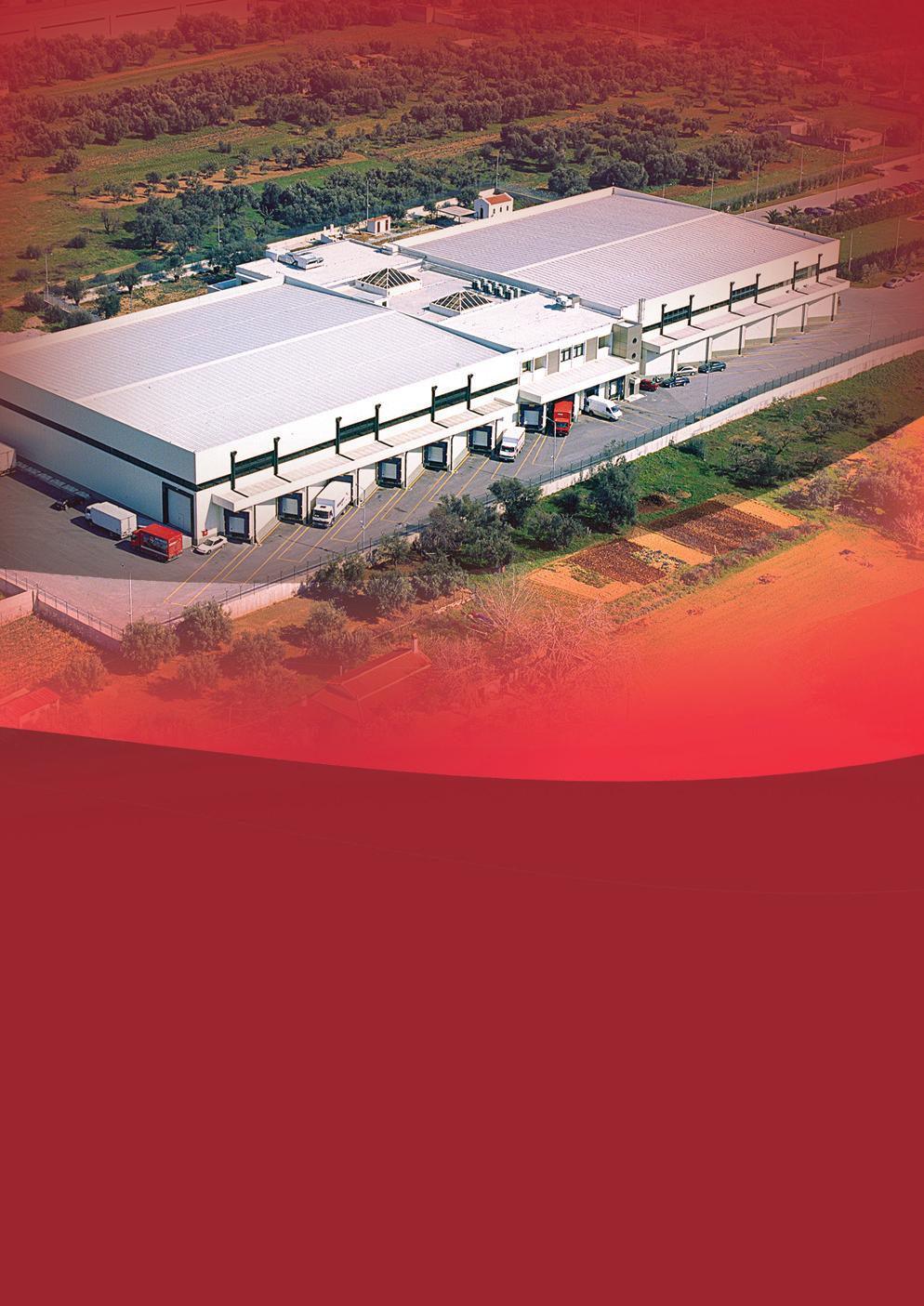
of our employees. This is done by providing them with best-in-class technology, systems and training in order to be effective and efficient, both internally and in the field. People are a key ingredient of our Vision To Action journey.”
Looking ahead, Mr Zarkadis affirmed that the company’s plans and objectives are well defined within the V2A.
“In general, we aim to be one of the biggest and strongest distributors in tobacco and FMCG in Greece, and regionally, to be the number one reliable choice for our partners and customers in the markets within which we operate. We have all the major elements and the recipe to make it work,” Mr Zarkadis concluded. n

from crop to consumption

ikibana vittoria group savona foodservice whole foods market crowne plaza warsaw – the hub

Barcelona’s Ikibana restaurants are a phenomenon: The company’s menu offers a unique culinary style that it calls Japanese and Brazilian fusion, which blends Japan’s culinary precision and freshness with Brazil’s tropical fruits and exuberant culture. The Ikibana groups’ General Manager, Leandro Ybalo, spoke to Richard Hagan about how this unusual concept has flourished into a successful restaurant business so popular that its store openings have become local news events.
The Ikibana group of restaurants is based around a culinary style that is pretty unusual, even by its own admission.
“Japanese-Brazilian fusion is not a very popular or well-known concept; it’s still emerging,” admitted Leandro Ybalo, Group General Manager at Ikibana. “Its origins are based more in Brazil, in San Paolo’s Japanese community.
“The story of this fusion is that the Japanese landed in Brazil and brought their gastronomy with them, which they combined with local ingredients. That’s where it was born. What makes JapaneseBrazilian fusion great is the combination of these two gastronomies: the pure technique of Japan mixed with the tropical fruits of Brazil.”
The group opened its first restaurant almost 15 years ago and enjoyed almost immediate success.
“Our first Ikibana restaurant opened in 2007 in El Born, a neighbourhood of Barcelona,” Mr Ybalo recalled. “It was a surprising restaurant for the area and something new for the town, because our Japanese-Brazilian concept was something that nobody was familiar with. That curiosity got people coming in to see what it was all about. They liked it and it became a hit.”
The success of that first restaurant convinced the company that it was on to something big, and so its second, bigger restaurant, Ikibana Paral.lel, opened its doors in 2012.
The fusion of Japanese and Brazilian cuisines introduced an interesting challenge in the design of the restaurant, particularly based on the search of shared singularities between two cultures that, at first glance, may seem antagonistic when combined: the quiet and minimalist approach of the Japanese; and the lush and bustling style associated with Brazil.
The restaurant received a finalist award in the 2013 edition of the Restaurant & Bar Design Awards. This success and concept has been echoed in more than 70 specialised publications worldwide. One prominent worldwide publication in the hotel business and restaurant sector selected Ikibana as one of the 25 most amazing places in the world.
The success of Ikibana Paral.lel and El Born lead to the group opening its third and also its biggest location, in December 2015.
That third restaurant, Ikibana Sarria, is a fascinating marvel of restaurant interior design. The massive 2,000sqm space is spread across two terraces surrounded by a lush garden. The upper floor is conceived as a relaxing indoo r /outdoor restaurant space on a timber deck. The tables are encapsulated by greenery and filled with slightly shaded natural light.
The terrace below that deck is the restaurant’s club space. Here, seating is arranged into colourful ‘bowl’ shaped islands with large irregularly-shaped tables. Each island is brightly coloured to represent fruits. These spaces are designed to be modular so that they can be pushed together to create even bigger social spaces for larger groups.

The restaurant’s menu is designed to encourage the social atmosphere of this seating arrangement, with dishes that are made for sharing.
The club hosts party events over weekends, specifically on Friday nights and on Sundays during the day. Some of these events include Japanese fusion events and Brazil-themed parties.
Ikibana’s unique gastronomy mixed with its fun, entertaining and unusual interior spaces have guaranteed that its store openings are a media event in and of themselves, as Mr Ybalo noted: “Our store openings are full of famous people including footballers, singers, actors and artists. We had 1,500 guests at the one opening event so it’s a big moment for the city.”
Alongside its reputation as a party destination and popular club, Ikibana is ultimately a high-end restaurant, and diners arrive expecting the very best.
“Guests these days are more prepared and more knowledgeable about the food business; everyone knows more about what to expect in the quality of the products which personally, I feel is a good thing,” remarked Mr Ybalo.
“It’s very rewarding when you have a good customer who can appreciate highquality food and differentiate it from bad quality products; it makes us better. It pushes us forward and encourages us to try things that we may not have considered before, to push the limits and test the boundaries.”
In order to ensure that its menus stay interesting, continue to meet cus -
tomer demands and that they stay at the top of current food trends, Mr Ybalo said Ikibana has an ongoing process of regularly reviewing and revising its menus.
“Normally, we make changes to our food and cocktail menus every nine months to a year. Our signature dishes are relatively permanent, but we always try to change other menu items to give returning diners different options. We also use this opportunity to try new things that we call ‘Iki Specials’; these are dishes that our chefs are testing for customers’ reactions. If we receive positive feedback on those items then they can be permanently added to the menu.”
Producing those high-quality dishes to satisfy guests expecting the high-end restaurant experience that Ikibana is famous for,

Experts in fresh fruit, vegetable and a range of gastronomic products, Grup Cano has been supplying customers for over 50 years.
Throughout our journey, we have established excellent relationships with a number of key customers and partners. Ikibana is one such customer. We thank Ikibana for their continued support.
editorial mention

requires sourcing some of the best ingredients available anywhere in Europe.
To make this happen, the company makes use of a range of raw ingredient suppliers with whom it has enjoyed very long-term relationships, such as Balfegó, who “provide us with the best tuna quality,” Mr Ybalo acknowledged.
He added: “We stick to the same suppliers for our meat, fish, fruit, vegetables or spirits because they’re all so professional and always deliver exactly what we need, precisely on time. The only issue we do experience from time to time is in the availability of tuna for our sushi. We only work with the best quality tuna, and it’s the most difficult thing to find.”
Mr Ybalo noted that the Ikibana restaurant group is actively expanding and in particular, is actively exploring new opportunities outside of Barcelona.
“A year ago, we opened an Italian restaurant called Velissima, so that’s a new brand that we’ve added. With regards to Ikibana, our dream is to be part of the London gastronomy scene; we travel there a lot and love the restaurants it has to offer.
“We’re also looking at opening an Ikibana in Madrid, which is a natural step outside of Barcelona. Madrid is a great city and the restaurant trade there is booming right now. If everything goes well, that will definitely be the next step.”
The company is optimistic about its market segment, but it also recognises that achieving continued growth and


maintaining its popularity requires an ongoing effort.
“The biggest challenge, for me personally, is maintaining our success,” outlined Mr Ybalo. “We’ve been operating our brand in Barcelona for 14 years and over that period of time, a lot of people have grown used to us and have visited us many times. The challenge is to keep reminding people that we are still relevant and still the place
to be, even when there are new places opening in Barcelona.”
He added: “We care a lot about our customers and the quality of our service and food. We’re a passionate team, so all things considered, I think we’re currently achieving that objective.”
Mr Ybalo concluded with the company’s thoughts on the coming months: “We’re optimistic; restaurants in Barcelona are
generally doing well and things are good. We’ve come through a tough time but for now, everybody is happy and the numbers are looking positive. For the time being, we’re expecting that we’ll have enjoyed a strong finish to 2021, and a super 2022.
“The last year we realized that the brand was really consolidated, and we understood that it was time to start expanding.” n

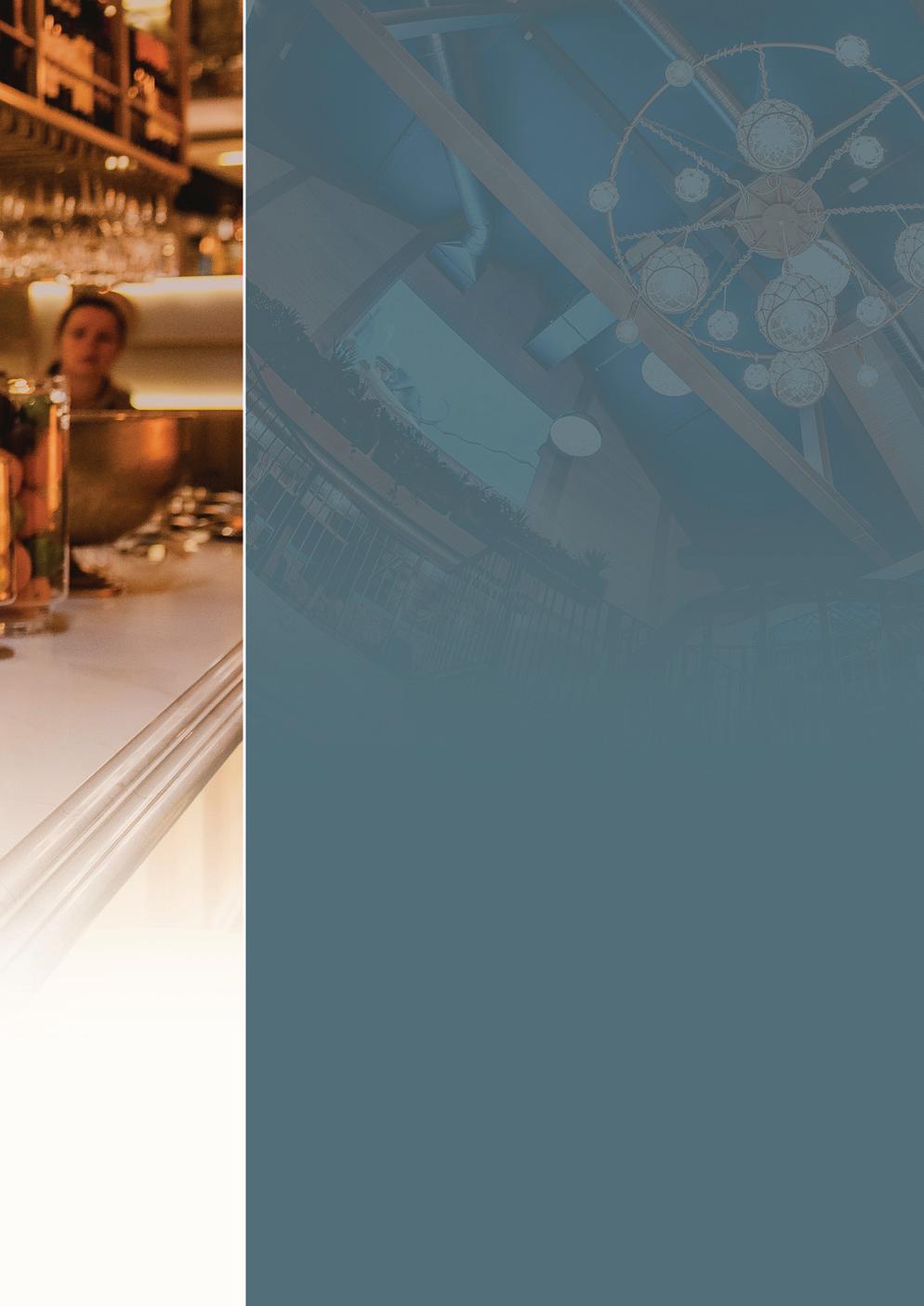



The Vittoria Group of Italian restaurants is an Edinburgh institution. Starting with the opening of its Vittoria On the Walk restaurant, the group has grown to now include six restaurants, five brands and two takeaway/delivery units. More than 50 years later, the group remains owned and run by the same family. Alberto Crolla, Group Operations Director of Vittoria, spoke to us about family, food, and whether pineapple belongs on pizza. Report by Richard Hagan.
Apassionate debate between friends, families and even strangers on the internet has raged for decades: does pineapple belong on pizza?
But according to Alberto Crolla, Group Operations Director of the Vittoria Group of Italian restaurants, the question doesn’t matter.
“We’re not in Naples, we’re in the UK,” he smiled. “Whoever wants ham and pineapple together on their pizza can have it as far as we’re concerned. And as long as there’s demand for it, we’ll supply it. Personally, though, I love it. I like the sweetness of the pineapple and the savoury flavour of the ham.”
As much as this was a fun icebreaker leading into our discussion, Mr Crolla’s answer revealed much about the mindset behind the Vittoria Group’s ongoing success more than 50 years after its first restaurant opened. As he explained, the key to the brand’s longevity has been its willingness to supply and then constantly adapt to its customers’ needs whilst continuously evolving its own presentation.
“Over the last 50 years, our brand, primarily starting with Vittoria 50 years ago, has changed and evolved; it’s never really been the same restaurant. Every decade has been different. The business has moved from very casual to the modern 2021 restaurants we have now, offering fresh cocktails, pizza, pasta, steak, chicken, fish… you name it.”
Mr Crolla added: “We have five brands and every brand has continuously evolved; we’ve never settled. We refurbish the restaurants constantly, every six to eight years. They’re always up to date, always evolving and as a business, we’ve always changed, always adapted.”
Edinburgh has been the home of Vittoria Group ever since the business sliced its first pizza for customer consumption in 1970.
“Being over 50 years old sets us apart from a lot of these private equity big chains that are filling up Edinburgh,” Mr Crolla remarked. “Even ten years ago you didn’t have all these big London firms that are dominating the main streets of the city. But they push us to improve and to get better. More competition is good.
“Still, nothing can take away from our history. Having everyone from my granddad to my father, mother, myself and my wife all heavily involved in the business is, I think, the biggest asset that we have.”
He added: “People can trust that when they come into our restaurant, it’s familyrun. They can come in and identify the people who own the restaurant. After all, it’s the people who make the business rather than the product and we’re in the people game.”
The Vittoria Group remains in the hands of the same family who established it all those years ago. Mr Crolla said that the family’s hands-on involvement in the dayto-day operations of the restaurants is a key ingredient of the group’s success, along with a program of constant training.
“We do lots of training. Our DNA as a business comes from our service and from our personal touch. The presence of the family on the floor gives us that extra edge. As hard-working as the family is, we pride ourselves on being very hands-on and, as a business, we pride ourselves on our great service.”

Of course, great service doesn’t on its own make a popular restaurant business, such as the Vittoria Group, and as the old adage goes, a chef is only as good as his last plate of food. Constantly delivering the best possible food is an artform in itself.
Primarily made up of Italian restaurant brands, the group owns two Vittoria branded restaurants, specialist pizzeria
La Favorita, upscale Italian wine bar Divino, and Taste Of Italy, a coffee shop and casual dining Italian restaurant. Additionally, the group owns Bertie’s Restaurant & Bar which is the biggest fish and chips restaurant in Europe and has an impressive capacity of 320 diners.
Patrons at the Vittoria Group are served by a staff complement of between 150 and 200 waiting staff, depending on the season. Impressively, many have been with the company for over ten years but this is less by chance and more by design, noted Mr Crolla.
“We pride ourselves on having longterm staff relationships rather than just hiring brief seasonal staff. Customers don’t want too much change, so we ensure that we look after our staff.”
Each of the company’s brands offers its customers a unique atmosphere or unique experience. The two Vittoria branded restaurants are “all-round Italian restaurants, great for casual occasions, special occasions, and both large or more intimate groups,” said Mr Crolla.
Meanwhile, Taste of Italy is a large venue offering a more casual experience. It also opens the earliest of all of the group’s restaurants, at 8am, in order to draw in the early morning coffee crowd.
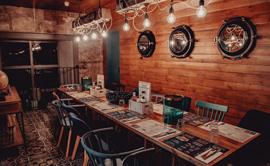
It remains open until 11pm, serving both lunch and dinner customers as well.
Bertie’s is, as Mr Crolla noted, “all about creating the biggest and best experience that fish and chips can offer”. With its 320 seat capacity, the restaurant is designed to cater for large groups. Divino is the group’s premium offering, with an Italian wines menu topping 200 selections. It’s located down a quiet side street and is focused on upscale, slow dining experiences for between 50 and 100 covers a day. And finally, La Favorita is a wood-fired pizzeria that also offers a pizza takeaway and delivery service – a key revenue stream during lockdown periods.
Filling all of those seats every day requires offering menu items that its surrounding communities actually want. As Mr Crolla explained, that’s something that Vittoria Group specialises in.
“We’re a family brand; we’re not pretentious and we’re not trendy. We give people what they want; we meet our customers’ needs. Whether they’re young, old, or even a young family. What people want is quick, easy, tasty, filling food.
“But we also need to cater to the practicalities of our large venues. So our food has to be simple for our chefs and easy for our customers. We’ve adapted so that the


process isn’t overly complicated. We’re in the city centre where people want to be able to come in, in the middle of other things, quickly eat, and go. It’s a different type of experience but we are intentional about meeting those needs.”
In order to ensure that the company constantly ticks all of these boxes for its restaurants and customers, it has centralised the production of a number of its menu items.
“We want consistency and to keep our standards high, so we believe in keeping everything centralised,” he detailed. “Our menus are quite big, and apart from Bertie’s being the only British brand, all of our Italian brands tend to do the same sorts of things, like pizza and pasta.
“For that reason, we’ve centralised production for our bread (like Focaccia),

our sauces, meatballs, Arancini, different types of Italian antipasti type dishes, and also a number of cured meats. We have a dedicated, separate team that handles all of this production. We take it quite seriously.”
With eyes now set on closing the year and starting the next with renewed vigour, Mr Crolla said the restaurant group will keep evolving.
“There’s always room for expansion and we’ve always got new projects on the go,” he said. “There are a few things internally that we want to expand on in the next year – not in terms of big venue expansions, but with things like expanding on our delivery brands and on outside events.
“Internally, we are consolidating; we don’t feel it’s the time to expand and

frankly, we’ve got enough on our plate at the moment. We’re putting our energy into doing the best job possible with the restaurants that we have.”
Mr Crolla concluded: “Fundamentally, we want to keep our standards and consistency, and keep our venues healthy and refurbished while looking after equipment and staff. Now is not the time to go mad!”
Savona Foodservice is renowned for its pioneering innovations to ensure a seamless flow to clients across the UK’s southern counties. And as Managing Director Mike Morgan explained, high-tech solutions to improve service and the customer experience have also included harnessing artificial intelligence. Profile by Andy Probert.

ASmore high-tech solutions continue to breeze through the food industry, Savona Foodservice has been at that cutting edge for a few years now, and continues to evolve in making its systems and services the envy of the sector.
When you’re handling more than 4,000 ambient, chilled, frozen and non-food items and 800 own-brand products, the pressure to be efficient is an absolute priority when clients are scattered across 32 English counties in the Midlands, South East and South West.
Hence Savona’s strategy to maximise technology to the fullest in almost every corner of the business. In 2019, it even pioneered an artificial intelligence-led, online ordering platform: a first for the UK foodservice.
“We’re a modern brand on a mission to provide excellent customer service, and care passionately about the quality of service, our staff and partners,” asserted Mike Morgan, Managing Director.



Savona was founded in the 1960s by brothers Terry and Clive Holloway, who formed Grand Pont Bakery in Oxford. They bought loaves from a national bakery and produced their own label bread.
The idea of distributing continental meats and cheeses was introduced to them by businessman Frank Brandini, who hailed from Savona, in Northern Italy. The operation flourished, and the business soon expanded into importing a range of meats, cheeses, canned goods and dairy products.
The business was bought in 2003 by current owner Ken Knowland, who began to modernise its infrastructure and expand its distribution beyond Oxfordshire’s borders. Under his stewardship, sales growth rose from £4.5 million to £32 million by 2019.
Savona absorbed Ilfracombe Wholesale Grocers into its operations in 2016 and continues on an upward trajectory. The group has focused on reviewing and streamlining its IT architecture into a single suite of online systems. “We have also implemented electronic proof of delivery, transitioning to a paperless environment and improving customer service as a direct consequence,” commented Mr Morgan.
The list of changes goes on to include a complete replacement of ERP, business intelligence, finance package, HR and internal communications systems.
At the heart of operations are two warehouse facilities in Oxford and Ilfracombe, with a combined total of 85,000 sqft, underpinned by a committed 150-strong workforce and a fleet of 40 multi-temperature vehicles.
“The group enjoyed 30% growth in the three years before the Covid outbreak,” Mr Morgan remarked. “While our turnover in 2021 is expected to reach £32 million, it is predicted the group will, for the foreseeable future, again crest 2019 double-digit growth levels.”
In its dedication to furthering customer service, Savona became the first UK wholesaler to adopt Track My Order; a 202-launched digital solution offering clients an outstanding, frictionless experience. Customers are kept updated on the progress of their order as they receive notifications at four stages: order acknowledgement, assembly, despatch and delivery confirmation.
“A client can track where their delivery is. When our driver signs into their device, we can tell clients the order is on its way, which driver and vehicle it will be, how many drops there are, and at what drop point they will be,” detailed Mr Morgan.
“That same email has a link to show them where the vehicle is, so they can get an idea of how far away it is. Ultimately, the system helps customers optimise their time because they get predictability as to when their order will arrive.”
While the company plans to expand its warehouse at Kidlington, Oxfordshire, the facility was recently awarded AA Grade, the highest standard for a planned audit from the BRCGS (formerly BRC/British Retail Consortium), and Grade A at its South West depot. These awards, which very few foodservice wholesalers achieve, represent the company’s commitment to delivering the highest quality products with the utmost care to its customers.
Holding the BRCGS certification demonstrates that Savona operates a structured, comprehensive and effective food safety


programme and conveys the quality assurance standards customers require. This is exceptionally important when Savona’s client base comprises private and state educational institutions, care homes, cafes, pubs, restaurants, hotels, theme parks, and workplace catering.
He added: “All the systems, processes and platforms that we have invested in means we have reduced our error rate by more than three-quarters. Our suite of systems allow us to grow profitability and are flexible for potential expansion.
“Importantly, we also have access to the data, so we can understand where the products are successful or not, and we can analyse sales and stock. At the touch of a button, our staff can have their fingers on the pulse of the business and ensure more access to more information to our clients. That translates as Savona is easy to do business with.”
Mr Morgan said the fundamental principles for the business over the next couple of years would revolve around effortless convenience, service enhancements, more self-service access for cus tomers to get information directly, and enhancements to the product range.
“Underpinning all this will be two key objectives: people and planet. We are designing a people plan that we will roll out internally, and, in its broadest sense, we will look at sustainability gains.”
He disclosed the group is to order two electric vans and is looking at using alternative fuel – hydro-treated vegetable oil

The Dukes of Chippingdom are proper British pub chips, made from quality Maris Piper and Challenger potatoes (including all those lovely natural off-cuts!) and harvested exclusively from British farms and growers. This means operators that serve DUKES can proudly promote Britishness on their menus, which is a promise of quality that diners are happy to pay extra for.
Available in Skin-on and Skin-off varieties, DUKES are characterful in cut, fluffy and light, yet reliable as a gentleman’s character and as crisp as his tailoring. Oh, and they’re also Red-Tractor assured, vegan-friendly and gluten free too!

instead of diesel – at one of its depots that will help reduce emissions by 90% from the commercial fleet.
“Other ongoing sustainability changes include converting our sites to LED lighting to help reduce our electricity consumption.
In addition to people and planet plans, Savona is holding its annual exhibition at Sandy Park in Exeter on 15th March 2022. This is a key date in the diary and will see a gathering of approximately 100 suppliers, featuring product sampling and innovation for the year ahead.
Savona will also remain resolute in its commitment to the Country Range Group, which continues to provide top chefs and establishments with a value for money proposition without any need to compromise on quality.
The range of grocery, chilled, frozen and non-food products covers essential ingredients, such as allergen-free bouillons, finished products like handmade cakes, pre-portioned for convenience. In addition, Savona offers simple product solutions to help unskilled caterers, as many of its hospitality customers face staff shortages.
Mr Morgan admitted the pandemic had forced the group to be decisive on various objectives and maintain open communications with staff and clients on any issues.
“No matter how unpalatable the news was, we told people, because honesty and integrity remained at the forefront whether it was people’s jobs, going to a three-day week, furloughing staff, or telling clients about stock availability. As a consequence, we now have a more loyal client base and an even more committed workforce.”

But challenges do remain, as they do in any business. For Savona, these currently include recruitment, rates of pay, global supply chain pressures, and what the future holds for the green agenda.”
He said: “We still have fundamental problems for the industry such as delivering with diesel-guzzling vehicles. Right now , there simply is no viable mass-produced solution that offers an alternative to running a fleet of conventional diesel powered, dual-temperature commercial vehicles.”
Mr Morgan added the company differentiates itself from competitors by having quickly embraced digital innovations and maintaining constant communication with clients.
“Understanding their needs and business is more important than ever. That has translated in us winning new clients. As a flat, non-hierarchal structured business, Savona never hides the truth.
“It’s good to remember that in one period, we did a third of a million products in 14,000 deliveries on 37 lorries in 32 counties. And we made every single delivery without any staff shortages. We have not had to restrict service levels.
“Being honest, available, flexible and transparent is always appreciated by customers. What we promise is what we deliver.”
Mr Morgan concluded: “We aim to be the favoured foodservice partner with our customers; be a trusted wholesaler to our suppliers, and a company that employees can be proud to work for. In short, we aim to be the friendly face of foodservice because our knowledge and wealth of experience go far beyond product delivery.” n


SonyaGafsiOblisk,ChiefMarketing&CommunicationsOfficer

Known for its uncompromising views with regards to the quality of the products it stocks, Whole Foods Market holds its suppliers to the same standards that it employs in its own business model. In recognition of its suppliers, Whole Foods Market holds an annual award to show their appreciation.
“It is Whole Foods Market’s honour to celebrate our suppliers who have demonstrated fantastic cooperation, resilience, creativity and commitment to quality, rising to excellence in a year unlike any other,” said Sonya Gafsi Oblisk, Chief Marketing & Communications Officer at Whole Foods Market.

Whole Foods Market is a business dedicated to providing the highest quality products and service to its loyal cus tomer base across the USA, Canada, and has more recently made steps into the UK market.
The company’s supplier awards were set up in 2012 with the intention of honouring the company’s suppliers for their outstanding achievements and have been run consistently for nine years, highlighting ongoing commitments to quality, environmental stewardship, organic integrity, innovation, purpose and partnership.
The most recent of the Whole Foods Market Supplier Awards was held in May 2021 to recognise those 42 suppliers who had excelled themselves in the previous year. The award is split into three main categories; supplier of the year, purpose and core values, and quality and innovation, which in turn is awarded to two types of recipients – both global and regional suppliers.
“We’re honored to work with and celebrate the remarkable contributions of these suppliers that embody Whole Foods Market’s core values and consistently raise the bar in our industry,” said Don Clark, Senior Vice President of Non-Perishables Merchandising at Whole Foods Market. “Their dedication to excellence, quality, innovation and partnership is critical to our success and delivering on our mission to nourish people and the planet.”
There are a number of specialist sub-categories under the supplier of the year category such as the Special Recognition awardthis is for suppliers that go above and beyond in helping Whole Foods Market grow and drive business as well as inspire and delight customers. One of the of the 2021 global winners under this sub-category is Great Range Bison, a company that not only provides Bison meat of the highest quality but also cares about the continued sustainability of the meat industry.
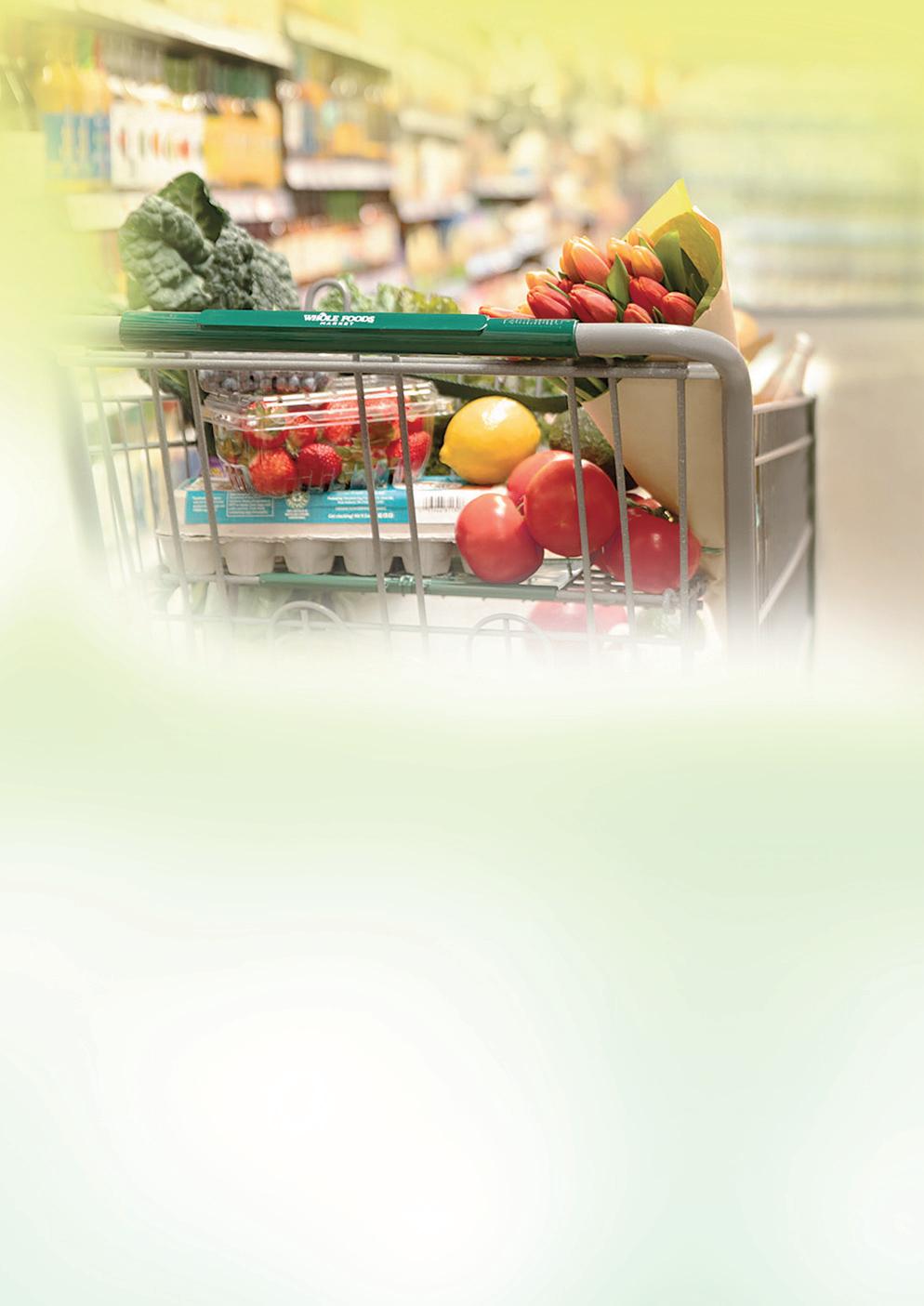
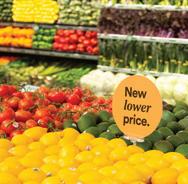


The brainchild of John Mackey and Renee Lawson, Whole Foods Market started in 1978 as a single small vegetarian natural foods store called SaferWay in Austin, Texas. The store in question was opened with the help of a $48,000 loan being given by family and friends.
It wasn’t all plain sailing. In the early years, they were evicted from their apartment when the landlord discovered they were keeping vegetable stock on the premises, which saw them move into the newly acquired retail premises. However, because it was zoned for commercial use, they had to bathe with a water hose attached to a dishwasher due to there being no shower stall in the building.
The Whole Foods Market brand as we know it today first came into being two years later in 1980, when Craig Weller and Mark Skiles, owners of Clarksville Natural Grocery, partnered with the SaferWay owners to create the first Whole Foods Market. This progenitor store was quite large for the time, standing at an impressive 10,500 sqft and employing 19 staff at a time when health food shops were fairly uncommon. It was a resounding success and set the trajectory that Whole Foods Market has been on ever since.
The company did not move outside of Austin until 1984, with the opening of further locations, yet by the 1990s, Whole Foods Market was enjoying rapid growth as it acquired other organic and heath food chains across the USA.
A far cry from those initial start up days, Whole Foods Market now has over 500 locations spanning two continents and employs 91,000 people across all facets of the monumental business.
On September 30th 2021, founder John Mackey revealed he is to step down as acting CEO. In an open letter Mr Mackey wrote: “Honestly, it’s very hard to retire from a company that I have helped to create, nourish and grow for 44 years. As a co-founder of Whole Foods, I’ve often explained my relationship to the company with a parent-child metaphor.

“As a parent, I have always loved Whole Foods with all my heart, I have done my best to instil strong values, a clear sense of higher purpose beyond profits, and a loving culture that allows the company and all our interdependent stakeholders to flourish. All parents reach a time when they must let go and trust that the values imparted will live on within their children. That time has nearly come for me and for Whole Foods.”
Even in its modern form, Whole Foods Market still upholds the original core values that the company was founded under: its unwavering commitment to providing the best natural and unprocessed goods. The company stated: “When you walk in our doors, you’ll find vibrant stacks of produce, animal welfare rated meat, responsibly farmed and sustainable wild-caught seafood and body care products with ingredients you can trust. That’s because we have experienced team members who help make it all possible.
“They partner with farmers and suppliers and carefully vet our products to make sure they meet our high standards by researching ingredients, reading labels and auditing sourcing practices – all to make shopping easier for you. Remember, if it doesn’t meet our standards, we don’t sell it.”
This ethos that natural is best also extends to the company’s views on the environment and sustainability, as evidenced by the recent launch of a certification program called Sourced for Good. The aim of this program is to promote and support responsible product sourcing – this encompasses advocating for environmental stewardship and making improvements in farmworkers’ lives.
“At Whole Foods Market, our Sourced for Good products not only are good, they do good,” said Karen Christensen, Senior Vice President of Merchandising for Perishables. “Our commitment to equitable trade has funded numerous community projects – from dental clinics to housing facilities to student scholarships to bird sanctuaries.

“By purchasing select products, customers help us in our goal to make a difference, and now with Sourced for Good, we’re offering shoppers an easier way to find these special products in our stores.
Always one to recognise the current trends, Whole Foods Market has been quick to cater to the millennial demographic, understanding that the quality of the product is one of the main driving forces in their shopping habits and the fact that they are willing to pay for that quality.
A YouGov poll found that 80% of millennials value quality in their food above all and 70% of those were willing to pay more if the quality and provenance of the product could be assured. Furthering this fact is the trend of transparency in shopping and food sourcing, particularly in the seafood and fresh meat market; more than half of this demographic said they will happily pay more for produce whose supplier has adopted responsible sourcing and animal welfare standards.
“We’re always striving to better understand our customers’ passions when it comes to food,” said Sonya Gafsi Oblisk, Whole Foods Market’s Chief Marketing Officer. “Millennials don’t settle for just any food in their shopping carts, and neither do we. The stories of how food is produced and grown matter to them – and to us.
“That is why we ban more than a hundred ingredients in the food we sell. Going beyond the USDA requirements, we prohibit antibiotics and added hormones for all meats in our meat department, and we only sell sustainable wild-caught or responsibly farmed seafood. Our standards drive the work we do.”
Whole Food Market is no stranger to charity either, having set up The Whole Planet Foundation in 2005. This charity is dedicated to alleviating poverty and empowering the world’s poorest places by using microcredit loans in locations where Whole Foods Market sources its products.
Microloans are characterised by giving comparatively very small loans to borrowers who are living in poverty, who lack the usual requirements for loans such as collateral, employment and a credit history. This method of charitable loan is to support entrepreneurship and once it has been repaid, the loan can be sent to another person who needs it; it is a proven method of alleviating poverty.
Whole Foods Market has said its foundation has already supported innovative and hardworking entrepreneurs all around the globe, most of which are women who traditionally have access to fewer resources.
Philip Sansone, President and Executive Director for Whole Planet Foundation said: “For a woman investing in her homebased bakery, neighbourhood shop, small scale farm, or artisan goods she sells in a marketplace, a microcredit loan of $200 or less can give her the chance to create or expand her business, and help lift her out of poverty.”
The Whole Planet Foundation is not alone though; Whole Foods Market has a roster of three charitable foundation, the other two being Whole Kids and Whole Cities. The former was founded in 2011 and the reason for its creation was to improve children’s nutrition and connect them to real food. The foundation, has stocked and donated salad bars to schools, as well as adding environmental education to the curriculum. The foundation has served more than 8.2 million children and nearly 12,000 schools.
The Whole Cities Foundation was founded later in 2014 with the onus of expanding access to healthy food and nutrition education at a community level.
“Whole Foods Market’s higher purpose is nourishing people and the planet and one way we do this is through the work of our foundations,” said John Mackey. “As a company, we deeply value giving back. Each of our stores has a unique way of connecting with their local communities to best serve that community’s needs.
“Our foundations also support strategic programs that make an impact where our stores operate and source products across the globe.” n

North American bison have come a long way since 1890, when less than 1,000 bison existed. Thanks to the dedicated ranchers, conservationists and bison consumers, that number has grown to nearly half-a-million, preserving bison’s link to our American heritage.
Great Range Bison’s network of ranchers are true stewards of the land. Pride is taken knowing that we are doing things “the right way”. Purchasing bison from producers who partner in bison restoration helps ensure the sustainability of America’s national mammal.
editorial mention
Based in Warsaw’s business district, Crowne Plaza Warsaw – The HUB is taking the Polish capital by storm. Offering opulent decor, local delicacies and a rooftop bar, it’s no wonder that this hotel-restaurant has a cabinet of awards. Laura Watling spoke to Magdalena Smigasiewicz, Marketing and Administration Director, to find out more about the hotel’s quick rise to success.

Directly employing 100 people, Crowne Plaza Warsaw – The HUB is one of the newest hotels to join IHG Hotels & Resorts, and the first Crowne Plaza branded hotel in Poland. IHG Hotels & Resorts has over 6,000 hotels in more than 100 countries. There are a further 1,800 hotels in its development pipeline.
Opened in November 2020, Crowne Plaza Warsaw – The HUB boasts over 200 rooms, a fitness centre, along with a host of dining options – the Signature Bar, The Roof, and in November 2021 opened Nova Wola restaurant. Situated in Warsaw’s newly emerging business district, the hotel has plenty to offer both business travellers and tourists.
“Crowne Plaza is based in one of the most dynamically developing areas in the centre of Warsaw,” shared Marketing and Administration Director Magdalena Smigasiewicz.

The Crowne Plaza’s location has plenty to offer visitors; from the popular Warsaw Rising Museum to the Warsaw Breweries (Browary Warszawskie), both just short walks away. Conveniently, the hotel also offers easy access to the Warsaw Chopin Airport and Rondo Daszynskiego underground station.
Crowne Plaza Warsaw – The HUB has ensured it has something to offer the modern day market:
“Meeting the demands of today’s market means offering a space which enables our guests to retain a good
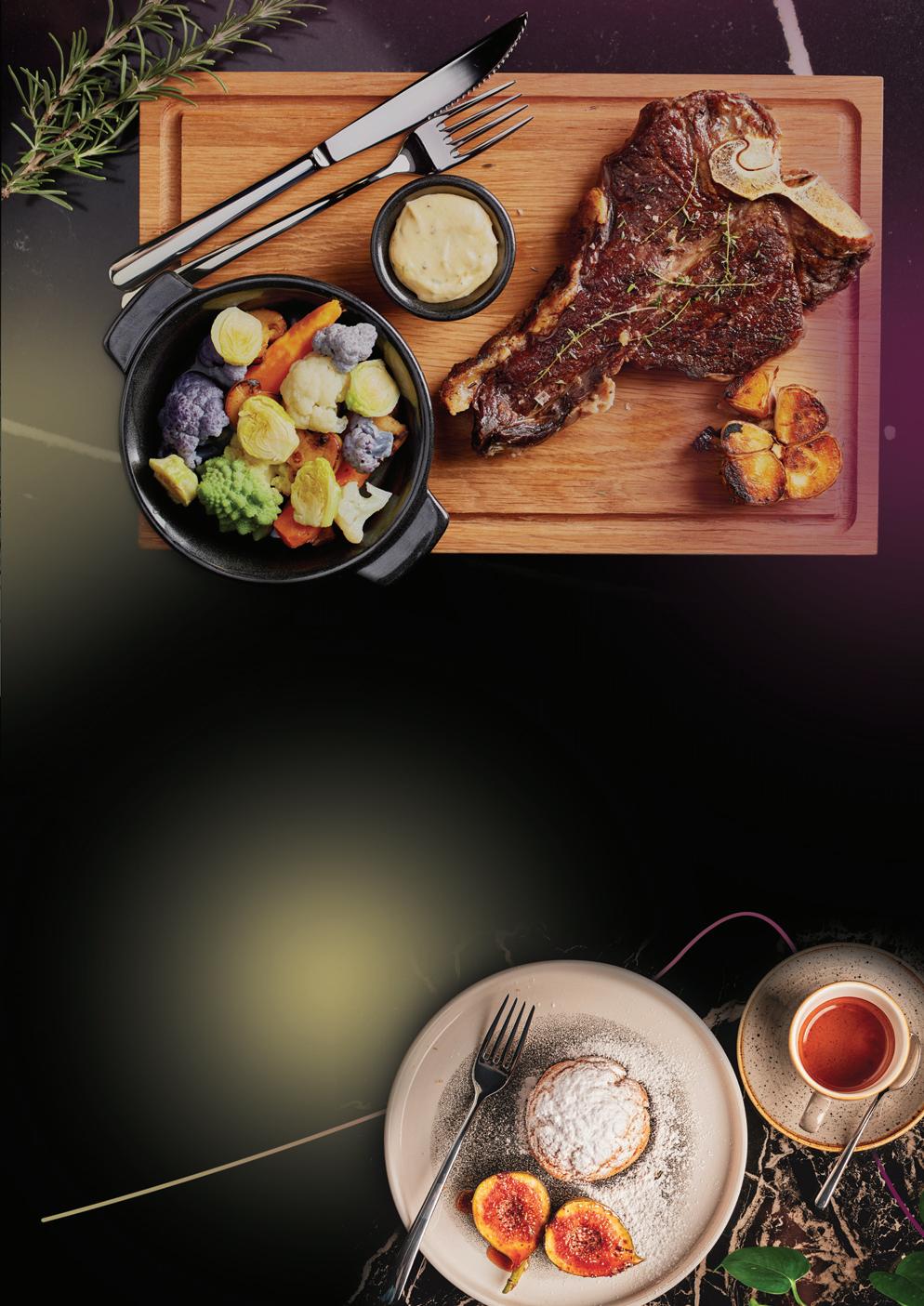
wor k /life balance,” explained Ms Smigasiewicz. “Our visitors are looking for inspired, flexible spaces where they can relax and work.”
The venue recognises the modern day importance of accountability, too.
“We offer guests products sourced locally, which adds the personalised touch, as well as giving a taste of the region”, said Ms Smigasiewicz. “Our guests want an extraordinary atmosphere, high quality service, but at an affordable price. We offer just that.”
There are several dining options for guests of the Crowne Plaza Warsaw – The HUB.

The Signature Bar offers all-day
dining, situated in the lobby of the hotel. The menu focuses on sustainably and locally sourced produce, including healthy hits such as Shakshouka with spinach and pita, avocado toast with kale tapenade and shrimp bowls with Israeli couscous.
“The Signature Bar features floor to ceiling windows overlooking the city, offering an abundance of light for day time dining,” explained Ms Smigasiewicz.
Head from the lobby to the 21st floor and guests will find the Crowne Plaza’s The Roof Sky Bar, with panoramic views of the city.
“Hosted by our world-class bartenders, the Roof Sky bar is an excellent place for drinks with friends or impressing corporate guests,” said Ms Smigasiewicz.
Rest your head and fill your stomach
The latest dining experience to be launched at the hotel is the Nova Wola restaurant. Opened in November 2021, Nova Wola offers a modern take on traditional Polish food.
The local touch
Heading up the dining offering is Crowne Plaza Warsaw – The HUB’s executive chef Pawel Suchenek, who brings with him 20 years of experience working in luxury hotels around the world.
“Pawel has created a passionate, talented team,” said Ms Smigasiewicz. “Part of our success over the last year has to be credited to our skilled team.”
The menu curated by Pawel Suchenek focuses on simplicity, combining high quality ingredients sourced from local suppliers with ingredients foraged locally in the wild. At Nova Wola, sharing plates are to take centre stage, with handcrafted
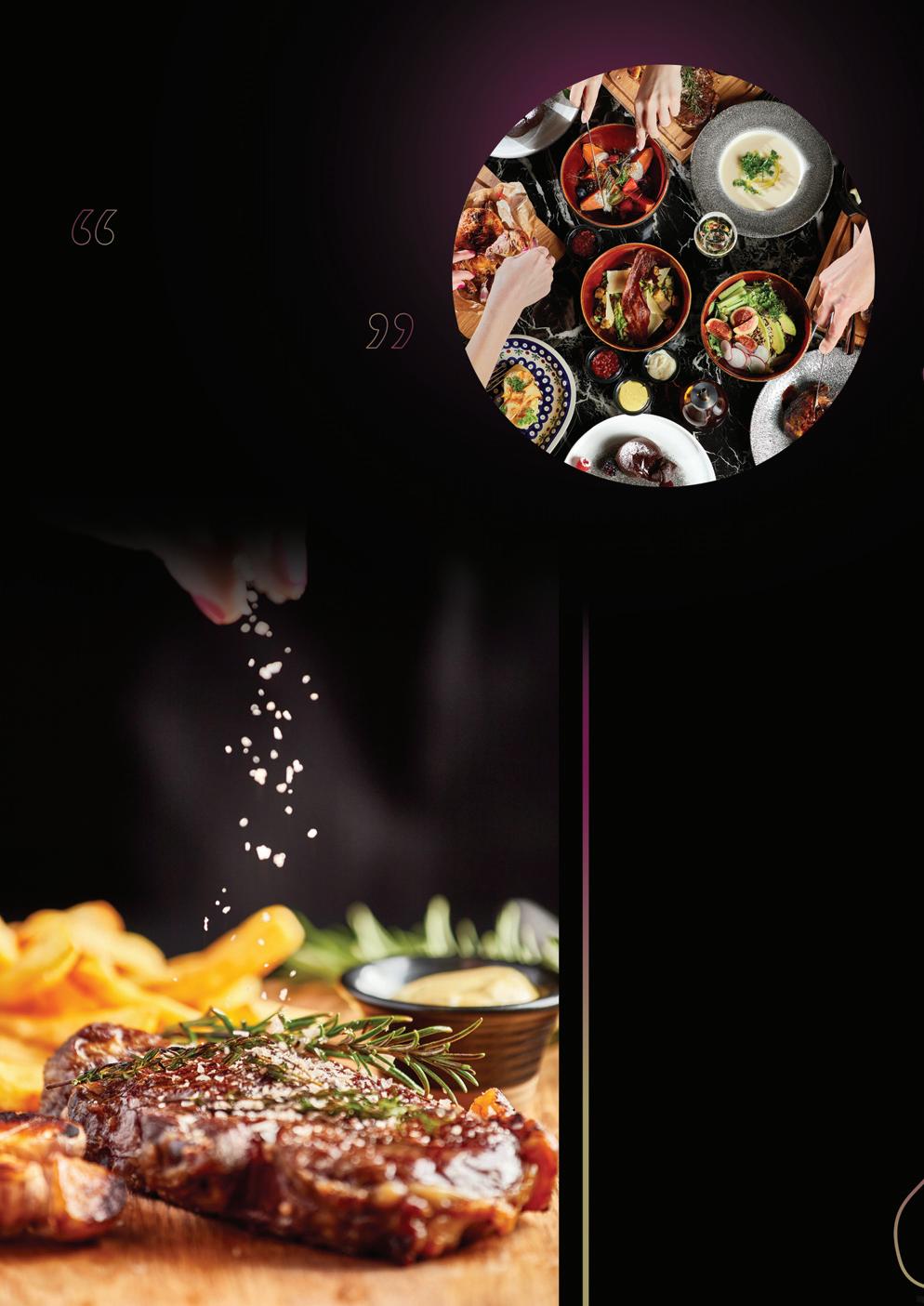
meats and cheeses and organic eggs proudly sourced from award-winning Polish producers.
“We love to showcase the very best of Polish cuisine, especially to our international guests,” shared Ms Smigasiewicz, “we also want to share our local stories. Supporting local producers is one of our main goals, along with respect for the environment.”
As such, guests of the Crowne Warsaw –The HUB’s restaurant can indulge in traditional Podlasie Koryci ń ski cheese and Chleb Kazdy Inny, a unique bread made from a 15year aged sourdough.
“Chleb Kazdy Inny translates to “each piece of the bread is different,” Ms Smigasiewicz explained, “as the producer emphasises, the indispensable ingredients of baking are ecological ingredients; passion and heart!”
When visiting the Crowne Plaza Warsaw –The HUB, guests will be surprised and delighted by the opulent decor. The interior design of the hotel-restaurant was entrusted to local design studio Tremend, based in Warsaw.
Throughout the interior, respect is paid to nature by the conscious choice of materials used, such as green plant walls, wood and stone panels, and a recurring river motif.
“We wanted the look of the hotel to symbolise life, energy and changeability, as well as the power and strength of eternity,” shared Marketing Director, Ms Smigasiewicz.
From dark wood and gold furnishings in Nova Wola to white marble and green velvet found in the Signature Bar, the hotel offers guests a stylish and elevated venue to meet and relax.
“The Roof Sky Bar is versatile and takes on a completely different character at night,” said Ms Smigasiewicz, “inspired by art deco and complemented by modern solutions, the panoramic rooftop bar has timeless elegance”.
Having only launched in the final few weeks of 2020, the Crowne Plaza Warsaw – The HUB already has a healthy list of awards.
Unsurprisingly, thanks to the hard work of both IHG Hotels & Resorts and Tremend, the hotel has been praised for its interior style, picking up awards including: Winner of the Hotel Interior Poland category at the European Property Awards; Winner at The International Hotel and Property Awards 2021 (category: hotels over 200 rooms, Europe) organised by Design Et Al Magazine; and also picking up an accolade at Hospitality Design Magazine’s HD Awards.
“Amongst our wins, we’re proud to have also received Gold in the A Design award and Platinum at the Muse Design award for Interior, under the Hotels
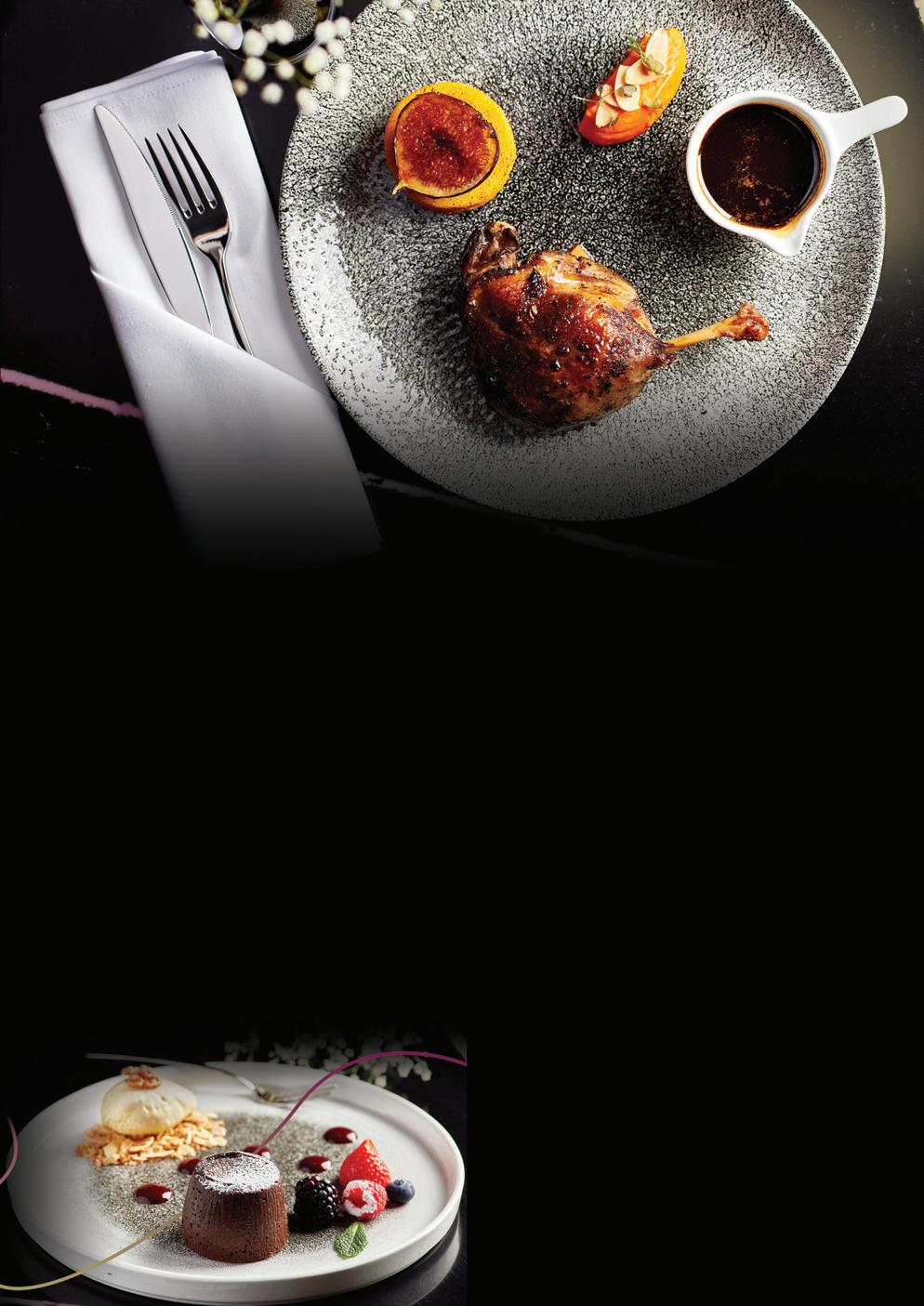
and Resorts category,” stated Ms Smigasiewicz. “We must credit the wins to not only the design studio and our IHG management, but all those who work for the Crowne Plaza Warsaw –The HUB. Without their hard work and diligence, our hotel wouldn’t be quite so decadent.”
With travel around the world reopening, inter-European travel is back on the cards. Soak up everything Warsaw has to offer whilst enjoying world-class local food and relaxing in decadence. To do so, rest your head and fill your stomach at the Crowne Plaza Warsaw –The HUB. n
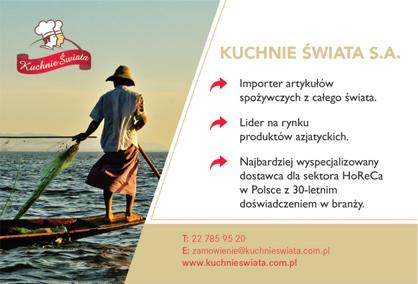


from crop to consumption
o’hanlon herbs arivia whitworths gcl food ingredients antico forno della romagna group i F D &
O’Hanlon Herbs has transitioned from a small market garden operation to one of Ireland’s leading herb suppliers to multiple retailers. At its heart remains its visionary owner and Managing Director, Tom O’Hanlon, a passionate advocate for horticulture and doing it right, sustainably. Profile by Andy Probert.

Fresh out of college, a young Tom O’Hanlon was looking to create a bit of extra income for himself so he decided to use his knack of growing plants by setting up a small market garden in his small suburban garden.
More than three decades on, he oversees O’Hanlon Herbs, a 16 acre operation, producing over 5 million potted herbs and in excess of 5 million cut herb packets per year. And all supplied to Ireland’s leading retailers and independent stores.
“No farming heritage, no family horticulture history, no formal background in planting, and no grand vision,” reflected Mr O’Hanlon on his first tentative steps starting in 1988.
“I was just a suburban Dubliner who liked planting and growing. The first few years, I was just messing around. I was just a youngster. But I had a germ of an idea to
make a micro-herb garden because I had an instinct there was a market opportunity.”
Over time, he has ridden that instinct, gradually upping the ante of the business, buying a plot of land in Glenealy, in neighbouring County Wicklow, where O’Hanlon Herbs continues to flourish.
The lion’s share of production is geared towards basil, coriander and parsley, as well as mint, rosemary, chive, thyme, and dill. There are ambitions to venture into Thai basil and diversify into a living lettuce range for the living greens sector.
But he remains relatively matter-of-fact about his success: “We got a supermarket contract; it was a bit primitive, packing a few herbs, buying from some producers. I grew pots in season. The deal was to set up some tunnels. It was a seasonal business and packing other people’s product lines. And we remained like that for years.”
Then two external influences fuelled the business boom.
“The arrival of Tesco to Ireland in the 1990s was a big sea change, as they brought knowledge and experience from the fresh herb trade from a more mature UK market,” he acknowledged. “And secondly, TV cooking programmes, most notably Jamie Oliver on Channel 4, among others, offered us a huge boost as he was such an herb aficionado,” pinpointed Mr O’Hanlon.

People expanded their cooking knowledge by travelling abroad and the internet took off. “All these things played into greater fresh herb usage in the kitchen to the point in 2008 things got pretty serious. The question was whether we wanted to invest properly in the business and become a year-round operator, or remain as a market gardener.”
He opted to do the latter, investing in a 2,500 sqm glasshouse, built to scale for market demand.
“We expanded again in 2012 and 2015. We have recently expanded again, and have just over 12,000 sqm of glasshouse of significant production.”

The company also has an herb packhouse that covers the total herb category for the supermarkets. It can pack local products in season and import herbs out of season.
“We have ambitions to grow our cut herbs, but we have tended to specialise in pot herbs,” Mr O’Hanlon remarked. “We hope to take on more local production as we have some spare acreage.”
O’Hanlon Herbs currently produces 80,000 pots per week, and according to the company’s owner, the market has potential to get that to 100,000 to 110,000 pots per week in 2022.
“As an expanding business, we are also looking into greater automation, mechanising processes and more operational efficiencies,” he said. The company presently

employs around 100 people and takes on an extra 40 during peak seasonal times.
Mr O’Hanlon said: “There was a massive leap in demand in the pandemic, being driven by at-home cooking. While the business enjoyed single-digit annual growth in 2020, demand simply outstripped supply. That was a relative one-off phenomenon above and beyond the capacity of the business.
“Once finalised, we expect 2021 to be an improvement over 2019, and we are aiming to grow the business, diversify further and improve our service all round.”
An exciting development will be the transition away from sodium to LED lighting for the glasshouses.
“With LED, we expect a fundamentally superior product,” asserted Mr O’Hanlon. “From trials and other grower reports, LED gives the herb a better leaf structure, better shelf life and a better flavour profile. Therefore, improved production.”
The knock-on effect, noted the Managing Director, will mean fungicides for basil mildew disease will no longer be needed, as the combination of better airflow and LED will deal with that through an overall better environment and micro climate.
“It will mean, ostensibly, we will have reduced need for treatments which we aim to reduce by 100%. That will be good for food traceability and one less critical control process on-site,” he added.
LED will be first installed in one glasshouse and eventually be rolled out to the entire structure in due course.
Another innovation aimed at customers who struggle maintaining living herbs at home, is a self-watering herb planter designed exclusively by Boskke for O’Hanlon Herbs. It allows you to top up a water reservoir every week or so, with the planter keeping the herbs perfectly watered with no fuss. This is available online and through direct-to-consumer shows such as the Bloom festival held every year in Dublin
He added: “Looking ahead, the company wants to make the expansion successful, prime future investments on-site to help us become best in class, and continue what we’re good at doing.”
The company is highly committed to sustainability, including being a member
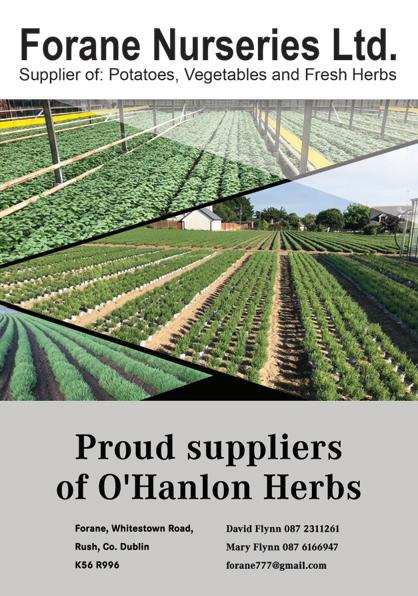

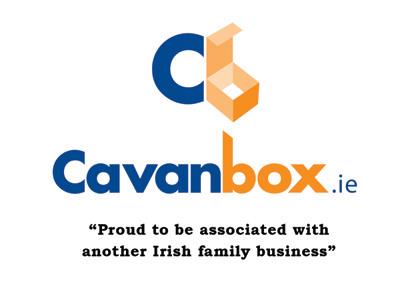




of Origin Green, Ireland’s pioneering, and the world’s only national food and drink sustainability programme. It unites government, the private sector and the entire supply chain, enabling the industry to set and achieve measurable sustainability targets that respect the environment and serve local communities more effectively.
O’Hanlon Herbs has developed several sustainability projects, such as enabling its state-of-the-art glasshouses to harvest rainwater stored in harvest tanks on site. This allows them to minimise the impact on local water sources.
On the energy front, the company has replaced an oil-based heating system by installing a woodchip burner – supporting local woodchip producers and reducing the company’s environmental impact in one fell swoop . The business has also con verted much of its packaging to compostable and recyclable, with its pots also now 100% recyclable.
“On top of this, 75% of the pots that leave us are either recyclable or compostable sleeves; this figure was 0% before 2019,” commented
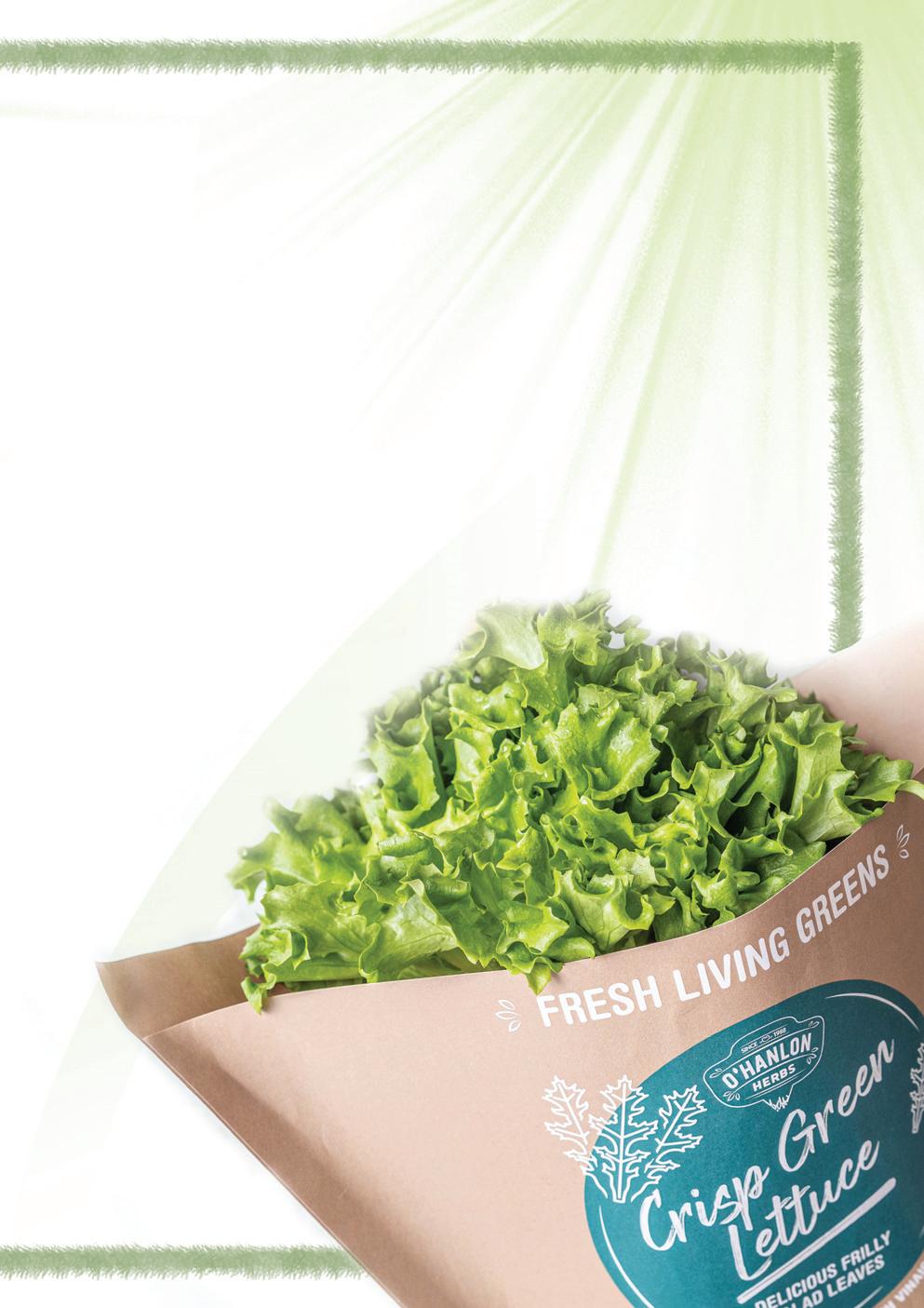
Mr O’Hanlon. “We are very proud of our progress and constantly aim to improve all aspects of sustainability.”
Citing labour costs and retention, supply chain, and quality of service in the post-pandemic era as current challenges, Mr O’Hanlon said he is overcoming these obstacles through a combination of investing heavily on-site, and constantly striving to keep on top of everything.
“It is still a niche business; we’ve become quite specialist and are in a good position. We just have to ensure that we don’t drop the ball and rest on our laurels to ensure our herbs are always top quality and customer service is at its best.
He concluded: “Looking back, it’s been quite a journey. It can be quite a rollercoaster ride, and has moved well beyond a hobby. The only way now is forward and upwards as the sector expands and matures.” n
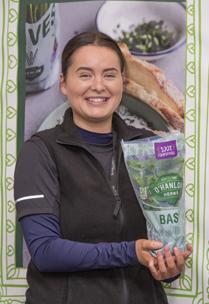

could it be the best plant-based cheese alternative on
Cheese is regarded as the Holy Grail of the fast-growing plant-based sector worldwide. Yet Greek-based Arivia, part of largest global plant-based foods company Upfield, has cracked the code of the popular dairy produce with its highly versatile Violife alternatives. Having grown consistently and become number one in its category in 30 countries, Violife continues to expand its portfolio with a mission to convert millions of mainstream consumers to plant-based alternatives. CEO of Arivia Anthimos Misailidis and Head of R&D Thanos Korokas spread the word about Violife’s turbocharge to the top with Inside Food and Drink’s Andy Probert.
Everything is on the up for Violife, the plant-based cheese brand is seriously rattling traditional dairy produce segments.
While taste, texture and functionality of traditional cheese have proven its unique versatility for almost every mealtime occasion , Violife has seamlessly eased into consumers’ consciences and shopping slipstreams. Why? Simply put, it can do the job of its dairy rival.
Violife chimes with vegans, vegetarians, flexitarians and the curious who see plantbased food as a positive contribution to their diets, but also aligns with the need for global action for carbon footprint reduction.
“Our goal with Violife is to be present in everyday meal events and promote more sustainable diets through plant-based nutrition,” said Arivia CEO Anthimos

Misailidis. “Cheese is the Holy Grail of the plant-based sector, but that’s probably why Violife is the number one choice in 30 countries.”
Established in 1990 in Thessaloniki, Greece, Arivia initially produced cheese alternatives containing dairy proteins in an attempt to match as much as possible the dairy equivalent. Sales boomed in Eastern Europe, the Middle East and Balkans.
Gradually, the company began to penetrate the plant-based movement, not consciously targeting vegans, but with the basic understanding that plant-based nutrition would become mainstream; given there were not adequate resources to feed the world’s entire population, revealed Mr Misailidis.
Its whole business dynamic shifted in 2014 when Arivia began to concentrate on producing a 100% plant-based cheese alternative that heralded the launch of Violife.
Violife has grown exponentially since, and in 2020 Arivia was acquired by Upfield, the world’s largest plant-based foods company and leading producer of plant-based spreads, butters and creams, including Flora. The acquisition was considered by Upfield as a strategic move to enter the fastest-growing food segment – plantbased cheese alternatives.
Mr Misailidis said: “As part of the Upfield family, we can pursue shared goals on sustainability and offer higher quality, delicious alternatives to dairy products. Being firmly committed to growing consumer satisfaction, we are convinced

Since 2003, Acmon Data has provided specialised information systems for production control (MES) and warehouse management (WMS), aiming at collecting, processing, managing, and evaluating information by coordinating all production processes with the software suite TracePro, which is designed and developed by Acmon Data.
Since 2007, Acmon Data has been the official distributor of Mettler Toledo’s product systems in Greece. Numerous multinational companies have trusted their brand reputation on our expertise and know-how combined with Mettler-Toledo’s finest quality and support.
Being a member of Acmon Group makes our services priceless, as we offer our clients a 360-degree approach and an efficient team of people integrating multiple expertise sections.


Upfield’s global footprint and Arivia’s unique portfolio will act as a catalyst towards increased availability of premium, plant-based food across retail and foodservice outlets.
“We at Arivia acknowledged we needed a growth platform that would enable us to gradually mainstream the brand and the category as a whole. We have penetrated the health store part of the market, but to go into the mainstream required additional resources and partnering with a global plant-based leader like Upfield.”
Head of R&D Thanos Korokas said: “The fact is that we are Greek and grew up with the Mediterranean diet; it was natural for us to develop products from plant sources. Now having been with Upfield for two years, we have gained access to resources we didn’t have before from the standpoints of ingredient technology and food technologists.”
Five years ago, Arivia had a 150-strong workforce, but today employs 800 people, with 700 at its production plant in northeastern Greece. With its headquarters and sales and marketing units also located in Greece, these are further supplemented by Upfield staff representing Violife worldwide.
Violife has firmly established itself as the number one plant-based cheese alternative brand in the UK, with availability across all major retailers in the UK, including Sainsbury’s, Asda, Tesco, Morrisons, Waitrose and other speciality food stores.

“Violife is the only genuine global bran d in the plant-based cheese category and is now present in more than 60 countries,” Mr Misailidis asserted. “We have a 22% global category share based on industry data, and we have been growing on an average annual basis of 50%, although in 2020 we achieved 55%.
“We don’t foresee growth slowing down, and we have a wide variety of every cheese type, whether it’s sliced, semi-hard, hard,
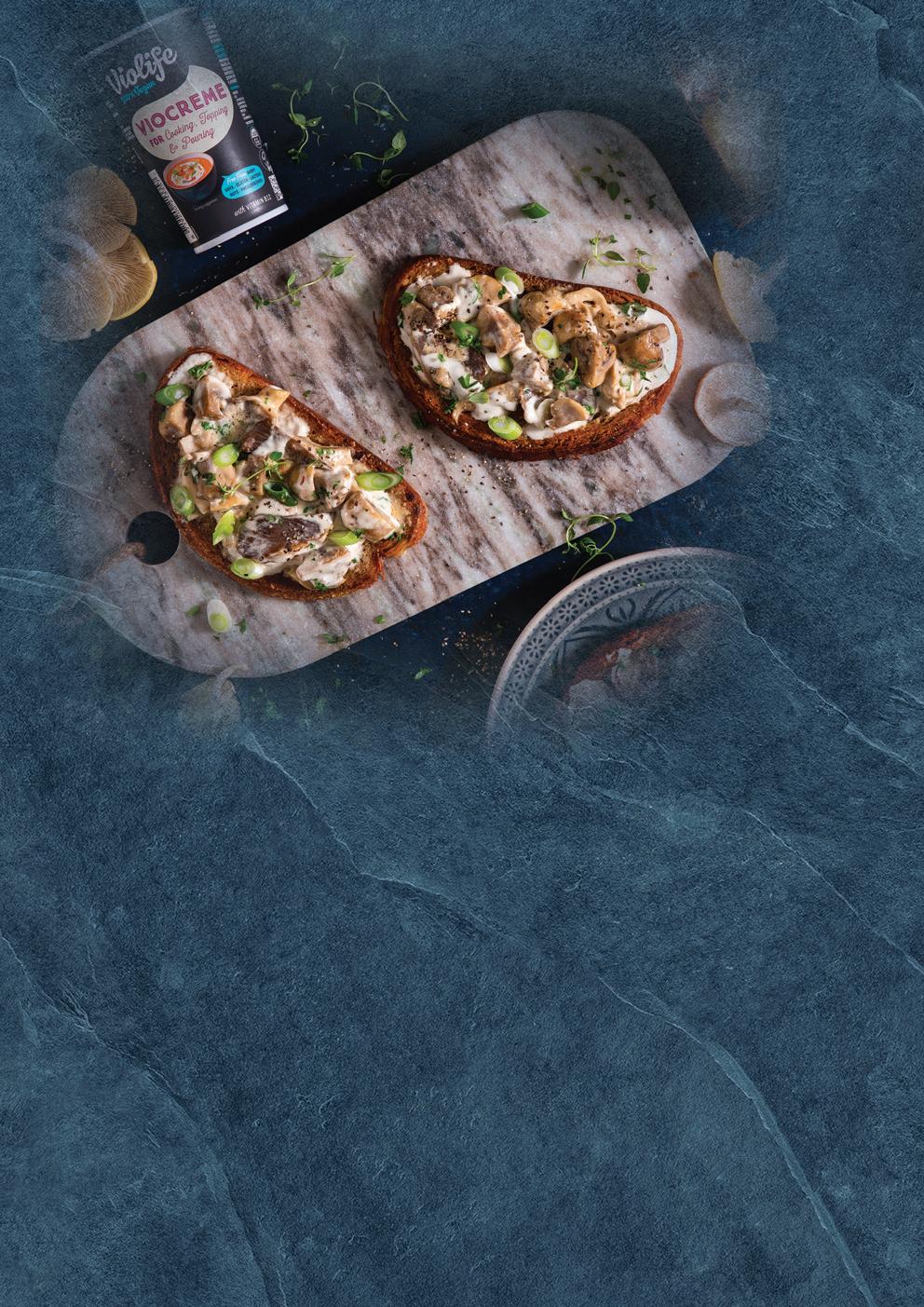
blocks, specialities, spread, or in cream form. Violife has a unique proposition that, for a non-dairy cheese, is all-encompassing and versatile for consumers.”
“We have a great global presence, leading in the Scandinavian countries and across wider Europe. Although we entered relatively late, we are also very strong in Germany and Canada,” detailed Mr Misailidis, noting that Violife is presently running ‘hot’ in the Middle East and Latin America.
“Because Violife is a ‘free-from everything brand’ – and that includes dairy, soya, gluten, lactose, nuts, preservatives, and emulsifiers – it leads in terms of taste and functionality. It is vegan, but you don’t have to be to enjoy Violife,” said Mr Misailidis.
Several slices of Violife’s profile
He added: “Our portfolio allows us to further enhance our presence in the consumer’s daily nutrition and for all daily occasions. Providing them options makes it easy for us, whether it is an addition to a salad, pizza, sandwich, a burger, risotto or mac and cheese.
“The end goal is that eating in-home and out of the home have not been as distinct as they have been in the past. So this allows us, in a more enhanced way, to be a presence in the eyes of the end consumer. The portfolio also serves the overall strategy of Upfield: a more plant-derived food planet. Violife’s options can act as an accelerator to fulfil that vision going forward.”
Accelerating into people’s lives have been Violife’s latest releases, with Mr Misailidis declaring: “there’s more to come in the near future”. This includes Le Rond Camembert, a coconut oil-based product that can be served hot or cold with recipe ideas included in every box. The camembert-flavour product is also free from dairy, soya, gluten, lactose, nuts, preservatives, and emulsifiers.
Violife also launched Viocreme, a vegan alternative to cream. It pours the same way as dairy cream and can be used for cooking, baking, and toppings. It is made from natural ingredients.
In 2021, Violife expanded its portfolio with two new plant-based spreads: Viospread with a reduced fat content, and new vegan butter alternative VIOBLOCK. Providing a buttery flavour, VIOBLOCK contains
vitamins B1, B2, B6 and B12 and folic aci d while being free from dairy, soya, gluten, lactose, nuts, and preservatives. It also marked Violife’s first butter alternative.
Violife also launched a vegan BBQ pack last summer, containing three varieties of vegan cheese alternative: Violife BBQ Slices; Violife Greek White; and Violife Mediterranean Style Block.
The BBQ Slices (new and exclusive to the BBQ pack) have a sweet and smoky flavour with a touch of paprika and are designed to be paired with vegan burgers. Greek White is perfect for salads and the Mediterranean Style Block for grilling.
With Violife also releasing a Mexicanstyle three-cheese blend in the US, Mr Korokas commented: “It’s all about the cheese. We never lose our focus as this is what made us popular, and the goal is to create the best plant-based cheese alternatives in the world. It’s our ambition, and over the last two years, we have achieved many milestones.
“We use starches, proteins and fibres derived from all sorts of fruits, vegetables and roots. What defines the Violife taste is our use of coconut oil, while we use carrot and paprika for colouring. Flavour is achieved through many dif -

ferent extraction and fermentation processes of plant sources.
“We can easily adapt our products to fit the regional needs of consumers. For example, we designed a cheese alternative to the Spanish Manchego, but then we received a request for a Mexican Manchego, which is completely different.”
Mr Korokas said: “We have also matched Cheddar, and it has proved one of our most popular to date. But Cheddar is an intercontinental product consumed everywhere. One in the US is different to one in the UK, which is also different to others in Europe We can change the taste to suit the region with all the functionality and taste.”
Mr Misailidis said Upfield is now embarking on its fourth generation technical innovation process in its plant-based cheese development, having covered improvements in the first three waves over the last seven years.
Violife’s sustainable agenda falls into Upfield’s strategy of working towards A Better Plant-Based Future while actively pursuing neutral emission ambitions.
As part of its sustainability drive, Upfield estimated it has helped consumers and chefs

avoid emissions of up to 6 million metric tonnes of CO2-equivalent in just one year based on a theoretical assumption they chose plant-based butters, margarines and spreads over equivalent dairybased products.
In an industry first, Upfield’s ‘avoided emissions’ is supported by product-specific, peer-reviewed life cycle assessments and complements its ambition to achieve “better than net-zero” emissions by 2050.
Upfield also plans to drive change with a strategy focused on four pillars: providing plant-based foods, enabling nutritious lives and happier people, and contributing to a better planet for all. Another ambition is to positively impact one billion people’s lives by 2030 by encouraging the switch from dairy to plant-based options.
Upfield has also committed to being 95% plastic-free and having better packaging by 2030.
Mr Misailidis said: “Upfield also plans to introduce carbon-free labels to more than half a billion packs by 2025 and produce 100% plant-based products also by
2025, not just on Violife, but across the whole Upfield portfolio of margarines, butter spreads and creams too.”
In the last few years, Upfield has also been seriously engaging in more sustainability goals, including concluding its life cycle assessment, the only plant-based cheese brand to do so.
“We have just concluded 20 SKUs covering the EU, UK, US and Canada. Compared to a similar dairy format, our LCA study, carried out by Quantis, shows that our products have less than half the carbon footprint and occupy less than one third of the land,” Mr Misailidis reported.
This report, which can be read on Violife’s website, led to the creation of Violife’s ‘Change’ campaign which launched during Veganuary this year. This new campaign from Violife encourages consumers to ‘Change Your Cheese’ from dairy, to reduce their climate impact on the planet with deliciously tasty ‘change’ meals.
The goal is to radically reduce plastic consumption per kilogram of the end product by 50% in the next two years, and
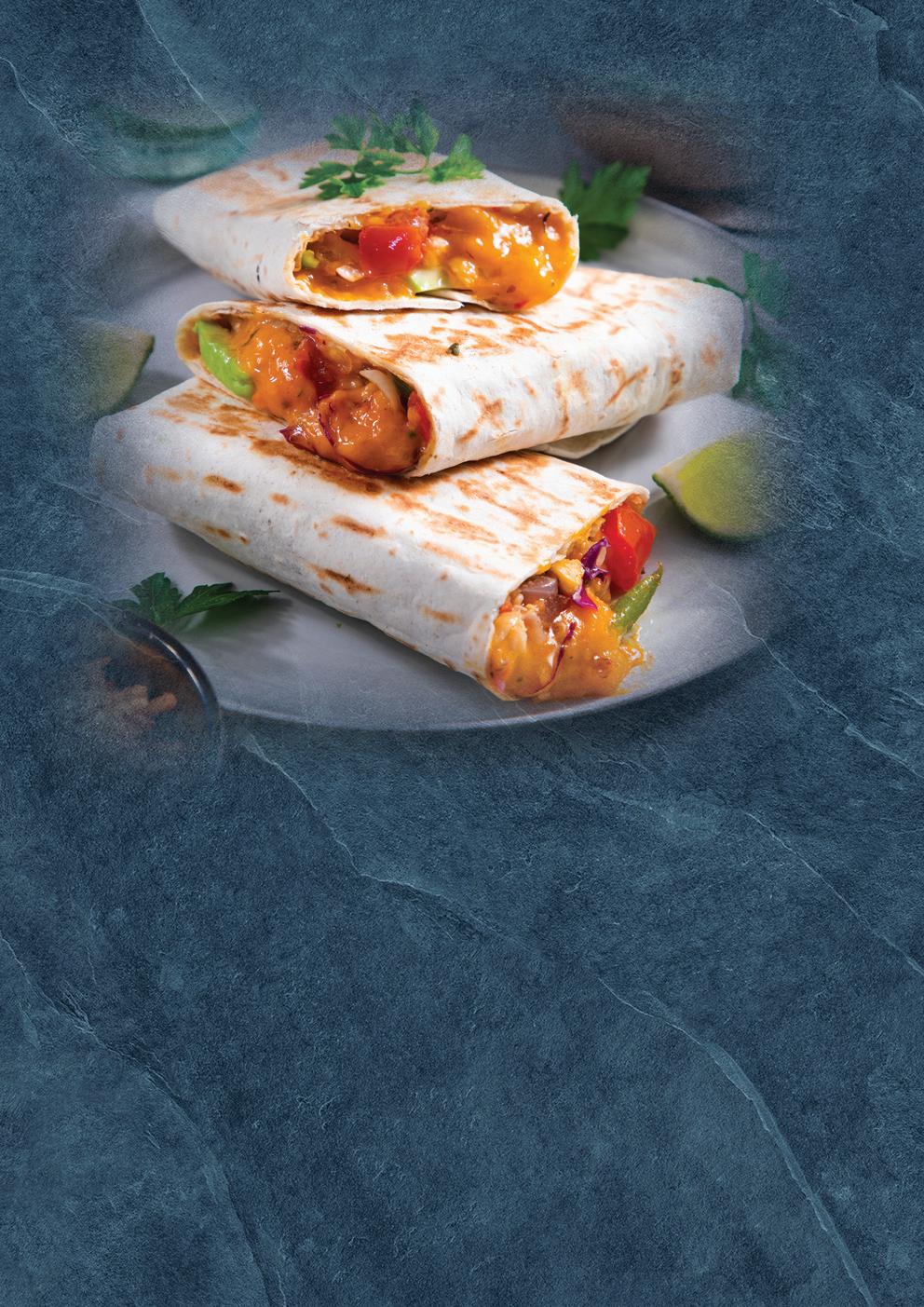
whatever plastic is used, the company’s aim is for it to be fully recyclable.
All solid organic waste is also directed for biogas and electricity production. There are plans to install solar panels in its production facility to derive electricity from alternative sources.
“We are also certified that all our energy comes from renewable sources, and we have a wastewater treatment plant, which allows us to reduce organic liquid waste by more than 97%,” said Mr Misailidis.
“But we need to be even more aggressive and, as technology progresses, we will be able to enhance further and accelerate our sustainability agenda, and our core focus will be a more sustainable future and plastic-free packaging.”
Both revealed that Violife and Upfield are ‘obsessed’ with scrutinising the supply chain.
“We have all vertical traceability back and forth through the supply chain from every single supplier, and that demonstrates the way we achieve Upfield vision and mission,” Mr Misailidis added.
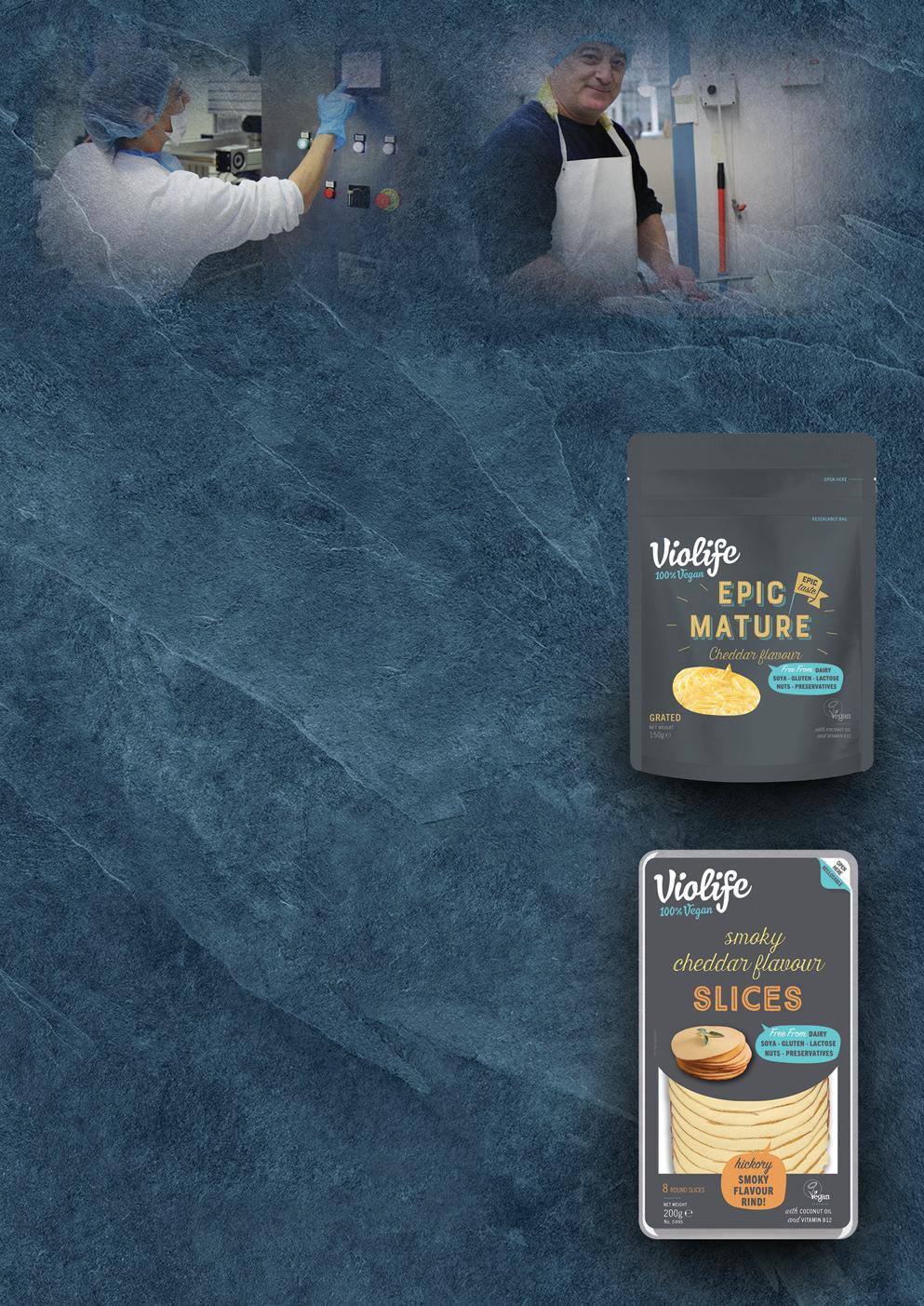
With the US, in terms of a cheese market, valued at $20 billion, with service adding that to $30 billion, the plant-based cheese category has a penetration of 1.4%, and it is predicted to double in the next three years. In the UK, cheese retail is worth around $10 billion, with a 1.2% market penetration in the plant-based cheese category, but with the growth of the foodservice input, that could double within four years.
Mr Misailidis emphasised: “These statistics and predictions suggest this category is in the early stages of high-growth potential and the more we can offer in quality products to the end-consumer, the more it will grow.
“By 2050, WHO predicts that more than 50% of human nutrition will be plant-based because the planet can’t afford to provide food from animal resources. It’s not a matter of if, but a matter of when. With the aid of Upfield, we want to provide products that satisfy that need, not only out of necessity but in a tasty and enjoyable way.”
He revealed that Violife’s Greek facility is close to concluding its second expansion to help increase operating capacity by 35% and bring its covered operating area to more than 200,000 sqft. It presently produces 2,500 tonnes per month, but that will rise to 3,500 tonnes per month following the expansion.
Upfield is also contracting its first facility in Canada. This 60,000 sqft facility is expected to be operational by late 2022 to exclusively serve clients in the Americas.
Mr Misailidis added: “As we are growing so fast, the aim is to keep up with that growth, and it is an investment-intensive project. Our investment in the last three years, and with the expansion of our facility in Greece and the new plant in Canada, will total about €50 million.”
Violife has also been reaping the rewards and achievements with its global presence.
These have included its Smoky Cheddar Slices being voted the best product for the dairy alternative category by The Grocer magazine in the UK. It was also awarded the number one plant-based cheese in East Europe, covering the Czech Republic, Slovenia, and Poland.
According to a highly reputable publication in Japan, Violife was one of only three food products among 30 that are expected to excel in the Japanese market in 2022.
“Japan is an important and new market that we have launched in September 2021, and we see a huge potential to succeed there as the Japanese are quality and health-conscious. Our brand proposition is an excellent fit, and Japan will also be central to help us grow in South-East Asia in the coming years,” said Mr Misailidis.
He added: “We are looking for better products from competitors in the market because once they do, they will help accelerate the penetration of the overall plant-based cheese category and be more visible to the end consumer.
“I think it will be a blessing to have more quality products in the market. This category is all about trial – if you enjoy that product, then you will stay within the plant-based cheese category.”
Mr Korokas added: “We are the only ones in the market that can guarantee high shelf life without using preservatives because of our unique production process.
“From a product development standpoint, we approach it differently from others. We start by trying to benchmark a target product to match: We look at the dairy equivalent, and the process is to get a good understanding of the functionality of the cheese so that we can begin innovating.
“We achieve amazing results, and when this happens, it is really exciting. Some see us as magicians, but we are simply perfectionists with innovation at our core. ”
n
Whitworths is the leading importer, manufacturer and distributor of dried fruit, nuts and seeds in the UK, specialising in sourcing the highest quality commodities. The company is not only highly responsive to emerging trends but demonstrates unerring respect for the environment while bringing the best of nature’s goodness in promoting a tastier, healthier diet. Profile by Andy Probert.
Established in 1886, Whitworths has enjoyed a rich, fruitful and varied history that today sees it consolidated as offering a wide range of quality assured natural products, sourced within an ethical Sedex-registered supply chain.
Since 2017, Whitworths has been owned by Anatolia, an Izmir, Turkey-based familyowned dried fruit company, and also one of its biggest and long-standing suppliers.
“That private ownership has allowed us to provide the business with stability,

establishing and investing in strong foundations, providing a platform for a positive and successful future,” commented Commercial Director Phil Gowland.
“For Anatolia, it has been a fantastic investment, and for us, it has allowed us to take the benefits of a private company that is not chasing short-term exit plans. We have invested everything that we have earned back into the brand, the people and the site.”
Whitworths’ core impetus has been sourcing worldwide for natural produce, such as dried fruits, nuts, seeds, beans and pulses, then processing them back at its Irthlingborough complex in Northamptonshire before selling them on.
Mr Gowland explained the product range is sold under Whitworths’ own brand and private label to major retailers.
“Whitworths’ branded products go into all the major grocery retailers in the UK,
such as Tesco, Waitrose, Sainsbury’s, Morrisons, Asda and Co-op, and also through high street names, such as Poundland and Superdrug.”
Also, shortly before the Covid-19 outbreak, the company began selling directly to consumers through its own ecommerce platform.
Over the years, Whitworths has been the first to offer access to a wide range of new, unusual and exotic fare from all over the world. That knowledge and experience is being utilised to provide innovative, tasty, healthy products that enable families to create delicious recipes at home or on the move through the company’s snacking range.
Whitworths’ range touches many corners of nature’s goodness, including sultanas, raisins, apricots, dates cranberries, walnuts, almonds, cashews, tropical fruits and heattreated seeds.
Over 95% of its raw materials are sourced from more than 30 countries, from more than 100 suppliers and thousands of producers, ultimately demonstrating the complexity of Whitworths’ supply chain. The products are from diverse locations such as Turkey, USA,
Burkina Faso, Tunisia, Mexico, Bolivia, Peru, and Far East Asia.
Once products arrive inbound at the company’s 22-acre site, they are allocated to one of four production centres dedicated to dried fruits, nuts, and dried pulses, grains and pasteurisation where they are then processed and packed ready for distribution.
Mr Gowland said that substantial internal investment had helped fuel a factory regeneration programme.
“One of the previous disadvantages of the site, having been here many decades, is that some of the facilities and equipment had become tired and old, and there hadn’t been a lot of investment.
“But since 2017, with Anatolia’s arrival, we have kicked on with a £10 million regeneration programme. This has ranged from basic but critical site maintenance to new production equipment and completely new production factories.”
A new state-of-the-art nut production hall was opened in mid-2020. Since then, the

regeneration project has focused on onsite infrastructures, such as major updates to the electrical supply onsite. This has included new transformers and switchgear to power the new production halls and warehouses.
Work has also begun on cereals packing (BPC) and pasteurisation facilities, plus the construction of a new waste management area to the rear of the site to consolidate recycling and zero landfill waste streams.
Whitworths takes food safety and security immensely seriously, adopting leading food safety measures, and its production site is BRC-accredited. It also has a Soil Association accreditation to supply organic ingredients.
“There has also been investment in embedding the right IT infrastructure and the right business processes,” clarified Mr Gowland. “Critically, we are investing in our brand; it is less about what it stood for yesterday, and making sure we invest in its relevance for the future.”
The £140 million turnover business has enjoyed 15-20% annual growth and has continued on an upward trajectory, even throughout the Covid-19 pandemic.


At AJA CC LTD, we advise on buildability, construction methodologies, and sequencing of works. Our designers work alongside the plant engineers to ensure the building detail designs meet all the requirements of the plant.
We manage the interface between food plant contractors, civil contractors, third party plant suppliers and the direct client works. Our approach promotes regular review of scheme designs, allowing foresight for risk management and cost effectiveness. We develop a detailed master programme to identify key milestones and costs (including building works, mechanical and electrical, services, plant, and automation), mitigate risks, and manage and control dependant activities.
AJA Principal Contractor Ltd (AJA PC LTD) was created to work alongside AJA CC Ltd on food related projects to deliver the sitebased construction activities. Acting as principal contractor, we take control of health and safety, site-based programme management, quality control and coordination and supervision of contractors.


Mr Gowland said the company had successfully repositioned the brand away from its heritage, traditional home baking position, through to leading the use of natural produce primarily in healthy snacking and healthy eating occasions.
As part of that dynamic, in the last 12 months, Whitworths has launched the Protein By Nature product range.
“Protein By Nature really epitomises what Whitworths is all about,” he said. “We stand behind a purpose that we call ‘Helping everyone eat a little healthier every day’ –which is very different to the wholesome heritage eating of yesteryear.
“We have repositioned the brand into new eating occasions by making great tasting healthy products from things that nature gives us. We use beans, lentils, pulses and grains and make them super tasty, super convenient products and add nothing to them.”
This strategy has redirected Whitworths towards healthier snacking and into healthy mealtimes too. A small main meal or an aside of totally natural ingredients makes up 20g of protein per portion.
“This has moved us to a different location in store where you would not necessarily

see Whitworths, and into different eating occasions during the day,” continued Mr Gowland. “But remaining at its heart are natural ingredients and great tasting products, made as easy as possible.”
Protein By Nature, which was launched at the start of 2021, has been warmly accepted by consumers and is available in Tesco, Morrisons and Ocado, and will be on shelves in the Co-op and Sainsbury’s in early 2022.
Mr Gowland continued: “We feel Whitworths is now a well-run, slick business that has repositioned from a well-celebrated, muchloved heritage brand that is more in line with today’s modern trends around healthy eating.
“To shift people’s minds has been ongoing for five years to show that Whitworths has transitioned to a healthier snacking and eating brand. Over 90% of the usage of the brand is not in home baking anymore, but is part of breakfast, healthy meal times and healthy snacking occasions.”
Over the next two years, the company wants to expand its brand relevance through reaching more consumers, consumption occasions, more purchase opportunities and evolving its presence in new markets abroad.
Mr Gowland said: “We want to be seen by more consumers through a variety of eating opportunities, with on-the-go, snacking and healthy indulgence options. Whitworths wants to show that its range is all about higher quality and better standard products, and drive these through healthy inspirations and solutions.”
In the last 18 months, the company has increased branded exports to several countries in the Middle East, China and Canada, with plans in 2022 to launch in the USA, South Korea, Australia and Israel.
“Where and how we can embed the brand and expand it, and become more familiar and famous to consumers, is a key focus,” stated the Commercial Director, adding the second part of the plan is about strategically positioning its retail branded business.
“This is all about aligning the different needs of retailers with our advantages and creating fewer, but deeper strategic own label relationships.”
He added: “We have exited some areas of business in the past few years, but that has led us to diversify our customer base in new non-grocery product areas.”
The company received an Investor in People silver validation during the pandemic,
which demonstrated its engagement from across its 400-strong workforce.
“Our people responded terrifically well during this period, particularly when they had to put in extra effort, think outside the box, and help maintain our business performance,” Mr Gowland acknowledged. “We made active decisions to increase planned stock cover and increased lead times.”
The other element was dealing with the risks on site for the workforce. Mr Gowland said: “We benefited from putting things in place pretty quickly, but most significantly, we adopted a consistent policy stance which we have maintained to this day. We didn’t have any shutdowns or challenges with staff. They have been highly resilient and a key asset to our business.”
Inflation, shipping in raw materials from abroad, and the complexity of its supply chains remain challenges within the industry. But Mr Gowland added: “We believe in supply chain transparency because without that, how can you guarantee the ethical practices in the supply chain are sound, and pesticide control is fair and proper? We believe we lead that supply chain transparency across our industry.”
Health and sustainable evolution
He said the company’s brand and its scale helped differentiate itself from competitors, explaining: “Probably no other brand carries consumer awareness, trust and expectation of quality more than the Whitworths’ brand does.”
The company has four significant advantages, with consumer insight and innovation at the heart of what it does, and which leads
“ no other brand car ries consumer awareness, trust and expectation of quality than the Whitworths’ brand does “ ”
to a better understanding that it’s meeting shoppers’ needs.
“We have a corporate plan investing in specs and sourcing, to checks and final inspections to ensure we have highly consistent, quality products.
“Thirdly, is what value we can offer on a cost advantage. The way in which our experienced buying and supply chain team understand the markets, the way in which we buy, work in those strategic relationships, and make collaborative decisions with partners, can achieve real cost advantages.”
He said: “Understanding the needs of suppliers, clients and shoppers,

having great communication and transparency are the foundation stones of long-term relationships.”
Whitworths is also very focused on sustainability from the producers it uses through to carefully considering the impact on carbon emissions, packaging waste and food waste when specifying packaging solutions. The primary concern is to select packaging that will protect and preserve their products’ integrity, taste, and texture over time.
“Food safety is of paramount importance, and with careful selection of packaging, we can also help minimise food waste by optimising shelf life,” he added.
“We also consider how consumers will use our products, either in one serving or over a period of time. For multi-serving occasions, we’ll add a re-sealability or reclose option.”
To distribute and merchandise products, Whitworths uses corrugated cases. Up to 83% of the content of each case is made from recycled paper, the balance being from sustainable sources.
The company adopts a six-point sustainability plan across the supply chain. These touch on reducing energy, sustainable farming, ethical practices, using and controlling pesticides, better packaging and reducing plastics, and simplifying complex transportation solutions.
Mr Gowland concluded: “Within the industry, and accelerated by the pandemic, is the importance of healthy eating. The fact that we are in the business of supplying natural products, and with new HFSS regulations coming into force, Whitworths is incredibly well-positioned for the future.” n

Family-owned GCL Food Ingredients, a leading UK supplier of food and beverage products and manufacturer of premium ingredients, has built an enviable reputation with clients and suppliers in creating effective food chain partnerships. With vast industry experience in developing award-winning and innovative lines, the company remains committed to delivering a value-added product range. Profile by Andy Probert.
With customers becoming ever choosier over their food options, portions and diet, they can have no doubt that the product range from GCL Food Ingredients offers the right mix in quality, taste and freshness.
The family-run company supplies Italian products and offers a vast range of food ingredients manufactured at its headquarters in Nottingham, and from continental Europe.
Established in 1964 as Giorgio’s Continental by Giorgio and Anna Tudino, the company rebranded in 2016 as GCL Food Ingredients to highlight its transition to a manufacturer and supplier of premium food ingredients.
Today, the business firmly remains within the family. Tony Tudino, son of Giorgio, is the majority shareholder, and Salvatore Devivo, his brother-in-law, is Managing Director. There are also several family members within the company infrastructure.
“GCL’s brand identity is all about the quality of our products,” emphasised David Staiano, Head of Commercial. “They are at the heart of what we do, and we tailor-make them to meet and exceed clients’ requirements.”
The business is built on six principal lines – cheese, liquids, meat, pasta, Southeast Asian and most recently, vegan – with its

portfolio of about 150 products being supplied to UK-based manufacturers and foodservice clients.
The business counts industrial manufacturing businesses, travel and leisure, pubs and restaurants among its clients. These include Greencore, Bakkavor, one of the largest pub chains in the UK, and major Italian restaurant chains.
A key strength of the business sees the directors working closely with customers and suppliers to source and provide premium quality authentic products. GCL’s European suppliers are closely monitored by a technical team through visits and audits to ensure facilities are operating to the highest food safety standards and compliance.
Based on the Moorgreen Industrial Park in Newthorpe, the company has two state-of-the-art food manufacturing and processing facilities. With a 120-strong workforce, GCL has a turnover of about £40 million, having enjoyed an average 10% annual growth through to the end of 2019.
GCL’s purpose-built pasta plant produces fresh and filled pasta, individual quick freezing products, and a large variety of cooked pasta for industrial and foodservice clients.
Recently, GCL began manufacturing fresh and cooked noodles, cooked rice and a range of flavoured proteins.
Using in-house facilities, the company offers cooking for various products, which can be packed in either a chilled or frozen state. A fully automated line can cook and pack over 1,000kg per hour, providing customers with perfect cook consistency.
“We’re seen as a leading UK manufacturer of pasta products; this has become a key focus for the business, as well as providing an array of added-value cooked proteins,” said Mr Staiano. This attention to quality resulted in one of its manufactured pasta products winning an accolade at the annual Pizza and Pasta Awards
GCL’s meat plant manufactures sausages, crumbs and meatballs, and processes a variety of cooked, fermented and cured (not raw)


meats. It offers a flexible, practical approach to meat processing as products are used by industrial and foodservice clients in food manufacturing including finished dishes, soups, sauces, and pizza toppings
Through the company’s liquid processing facility, GCL supplies wines, fortified wines, beers, ciders, spirits, liqueurs, olive oils, and other vinegar products in a variety of packaging sizes. These products are also widely used for ready meals, soups and sauces, marinades, pizzas, bread, salad dressings and desserts.
Mr Staiano said GCL has recently evolved a range of vegan products to meet rising customer demand and in response to changing market trends.
“We have invested substantially in equipment to develop a dedicated area, enabling it to be segregated, so lines are only focused on vegan products. This is a growing market for GCL and we will continue to invest in this sector and stay ahead of the trend,” he affirmed.
GCL’s ambitions for the next couple of years are to expand at around 10% per year and continue diversifying into different areas, such as manufacturing new product lines, and partnering with other businesses to produce fried products.
“In any area where we see an opportunity that takes care of a labour shortage in a kitchen and allows businesses to manufacture pre-done and finish them in-store, GCL aims to have an influence,” he confirmed.
While GCL’s premises are BRCGS certified to AA grade standard, the company’s New Production Development suite is at the very heart of operations.

The modern and ideal environment enables GCL’s in-house chefs to combine their knowledge and experience to create and develop bespoke products, and perfect client briefs or their own designs.
Over the pandemic, the company furloughed 50% of its staff, but Mr Staiano emphasised that “in running a tight ship for the last 18 months, we are now coming out the other side pretty much unscathed, in a position to grow, and with investment behind us to be able to do that.”
Labour shortages, Brexit’s impact on increased lead times, and more general rising industry costs are challenging issues being actively managed by GCL as they are filtering throughout the sector.
He added: “What differentiates us from the competition is the ability to be flexible, bespoke, and supply in various areas of the market. Being specialists in different product areas, clients look to us as a one-stop solution.
“They also benefit from our trust and transparency in market data and trends to keep them ahead of the curve.”
Mr Staiano concluded: “The industry is very difficult at the moment. If you are trying to grow, there is a lack of labour to underpin that and it will be challenging at least for the next 12 months. For GCL, we are focusing on maintaining our margins, and what we do well, we want to do very well just as customers have come to expect.”



Quality, safety, and of course taste are just some of the hallmarks of baked goods titan Antico Forno Della Romagna (AFR) Group. Comprised of two well-established Italian brands – Glaxi Pane and Bassini 1963 (who are household names in their own right) the AFR Group has continued to expand its services and production methods without compromising the company’s unwavering commitment to quality. Article by Jordan Yallop.
The year 2018 saw Orienta Partners, together with a group of investors, including Indigo Capital and FAI (Fondo Agroalimentare Italiano), take over the much-loved brand Bassini 1963, a company specialising in the production of highquality frozen baked goods. The historic brand based in the city of Forli, located in Italy’s Emilia-Romagna region, originally started as a family run business. This company was operated with the ethos of innovation, research, and quality ingredients; something that the AFR Group has continued whole-heartedly.
In 2019, the group took over Glaxi Pane, a Veneto-based company with its feet firmly entrenched in the HORECA sector which provides products of the highest quality. Dedicated to supporting food-service professionals, Glaxi Pane originally started as a bakery in Padua in the 1950s.
Now fast-forward 70 years, add in cutting-edge industrial technology as a compliment to long-standing family baking traditions and you have Glaxi Pane as it stands today; the newest member of the AFR Group.
“Across our two companies, AFR Group currently has three production plants; one in Forli and the two in Cadoneghe, which is in
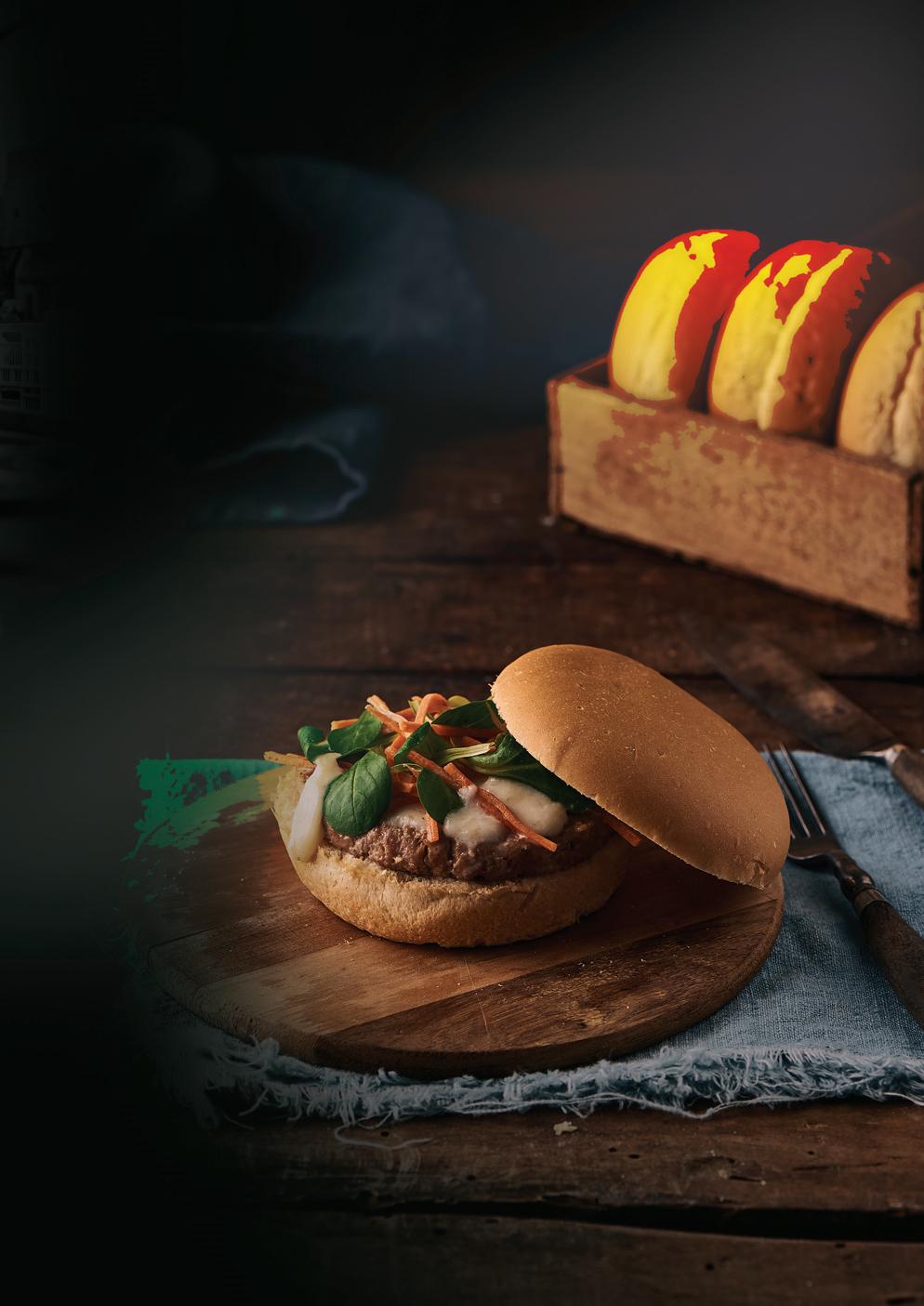
Massimiliano Bassi, CEO of the AFR Group.
Glaxi Pane creates an assortment of breads including those used for traditional Italian sandwiches and hamburgers. Bassini 1963 produces pizzas, flatbreads and other breads. Combined, AFR Group’s frozen line of products includes baked, part-baked and unbaked products, packaged products utilising flowpacks or carton packs, and also has a new line long-life products preserved at room temperature.
the province of Padua, in the Veneto region of northern Italy,” said
At the head of the table Currently manning the helm is Mr Massimiliano Bassi, who was appointed CEO of the AFR Group in early 2020. His extensive experience in the food sector long predates this and has been crafted over 13 dedicated years – experience he has needed to navigate the business through the past couple of years.
“The first day of the pandemic was the first day for me in AFR Group,” Mr Bassi commented. With the challenges this time presented across all industries, this is not an easy start for anyone in a new job, let alone the CEO of one of Italy’s most beloved food manufacturers. But Mr Bassi hit the ground running and shook up the company’s production criteria to meet these new challenges head on.
“The pandemic requirement has been to rethink the business model. As a result, we are defining our range of products and our
way to sell our products,” he said. We are moving from a company that was 80% HORECA and 20% mass market to a 50/50 split.
“In order to have a better balance, of course it cannot be 100% HORECA or 100% mass market, but you need to find the right combination in order to manage any potential future event like this one.”
Mr Bassi went on to explain this change and the differences between the two sectors: “Two completely different markets; you need different products, different approaches, and the different timing. HORECA is a 24 hour, seven day per week market that is less regulated, less rules, and easier to manage.
“Mass market is completely different. You have more bureaucracy, more rules. So it would take a lot of time to make new products. I think we are in the middle of the path.”
Bakers for over 70 years, AFR’s three production plants have six certified production lines, encompassed by 8,000 sqm of production hardware and manned by 95 employees across all sectors of the company. With the customers’ needs always in mind, and not one to shy away from investment when seeking to improve the production of products and facilities, the AFR Group has recently overhauled its production facility in Forli.
“We decided during the pandemic to invest in completely revamping this facility. We moved it from a facility that was not really automated, to a facility that is completely automated. So effectively, what we did in 2020 was ensure that this automation did not affect the quality of the product,” said Mr Bassi.
The CEO was keen to clarify that is the products baked by both Bassini 1963 and Glaxi Pane are the same as before and made by the company’s bakers, but all activities not strictly related to production have now been automated.
“The movement of the equipment is automated (how we manage machinery and equipment), but production is still handmade,” he confirmed.
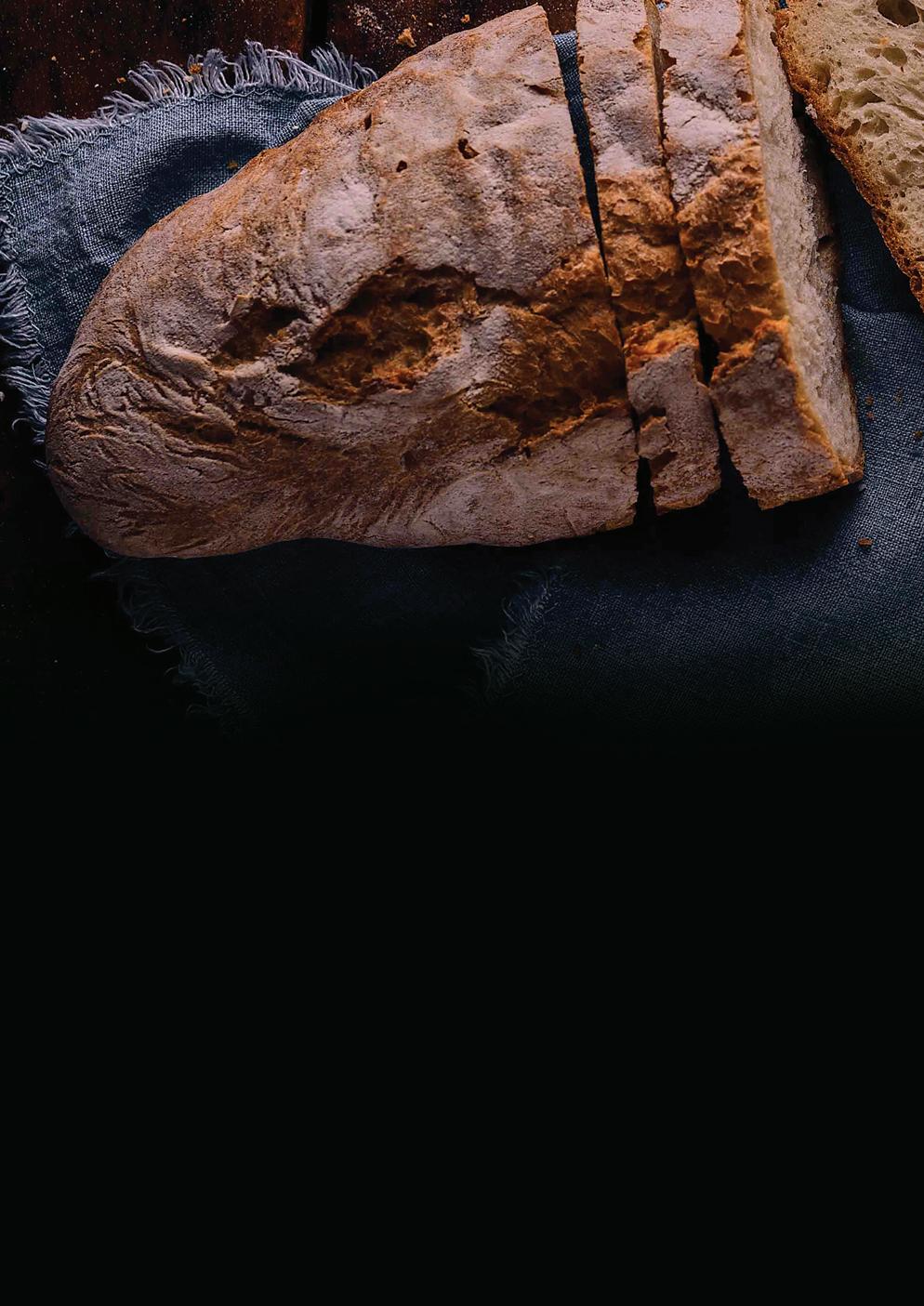
After talking to Mr Bassi, it is abundantly clear that this move towards automation is not the end of tradition; instead it is merely a move with the times and better allows the company to translate its traditional products to modern times, and as always, there is no compromise when it comes to the products.
Mr Bassi stated: “In fact, we were able to increase the quality of our products because our artisan bakers can now focus solely on managing the production without any distraction.
“Secondly, not only has the quality increased, but also we now have a standardised product. So, it is a key result that we actually have a product that when made is always the same as the last, and is consistently high quality.”
Even the best baker will recognise that no matter how skilled you may be, sometimes what you can produce may be limited by the quality of the ingredients you use. This is a factor that AFR Group has long since recognised. As such, with regards to ingredients, the ‘modus vivendi’ is to use the best ingredients to create the best products possible.
“Most of our ingredients are 100% Italian and our preference is for ingredients that come from the right area, so our mozzarella comes from Caserta,” he said.
“We decided to always use high quality ingredients. So when it comes to tomato and mozzarella of course we do, but we can do any kind of toppings. If the customer has chosen other toppings what we suggest is always use the best one on the market, and the one that fits with all of the other ingredients that a we are already using. We control each step of the process in order to have a product that is 100% perfect.”
“For example our pizza flour is the best quality you can find in the market and we try to purchase it close to our factory; we also use only the best oil. Only natural flavours are used in our products; no preservative, no additives, no palm oil. It’s a much cleaner style of product,” stated Mr Bassi

It would seem that it is not only the AFR Group itself that is traditional in its values. When speaking on his personal favourite product from AFR’s roster, Mr Bassi showed his own traditional tastes.
He admitted to being a fan of the Neapolitan Margherita pizza, an Italian institution, simple and unchanged, with just three simple toppings – tomatoes, mozzarella cheese and basil.
A story often recounted is that in 1889, a Neapolitan pizza maker created the ‘Pizza Margherita’ to honour the Queen Consort of Italy, Margherita of Savoy. It was garnished with only mozzarella, tomatoes and basil; to give homage to the three colours on the national flag of Italy.
Mr Bassi further explained that aside from pizza, other popular products include focaccia. The group produces a delicious array of options including Focaccia alla Pala, which is a almost cross between focaccia and pizza. Also, in keeping with today’s healthy eating ethos, the company also creates its version of


Pane all‘AcquaÆ, a bread without any additives, just water and the finest flour.
AFR Group also operates a private label, where companies can transform their “half-baked” ideas into reality by utilising AFR’s expert knowledge.
When talking about the goals for the future of the AFR Group, Mr Bassi first explained that the business has many people who have the historical knowledge and have been with the company for a long lime. As such, every effort has been made to guarantee their cru cial experience could be preserved and passed on.
Complementing the support of these traditional practices, AFR Group has also brought in commercial and marketing personnel during Mr Bassi’s tenure.
“We decided to hire people that can bring a different experience. We have hired a Commercial Director, a Marketing Director, a CFO, and technicians. We also create paths for them that allow them to grow inside the company,” he explained.
Seeking to expand brand awareness in the future and further build this already prodigious company, Mr Bassi concluded the interview with great optimism.
“I’m very optimistic because we did a great job, even if the pandemic events significantly affected the market. But we used the time to revamp the plant and improve our employees.
“Now we have an incredible range of products that are top quality in the market and so we are looking at the future in a very positive way. Instead of losing the factory during the pandemic a and waiting for a different outcome, we decided to invest a lot of time and money in investing in equipment and people.” n


from crop to consumption

With over 600 international awards under its belt, Jidvei is one of the most renowned wine producers in the world. From still and sparkling white wines, to wine brandies and grape musts, this historical Romanian business has secured its name as a leader in the market. CEO Claudiu Necs ¸ulescu spoke to Laura Watling about Jidvei’s specialities, and what’s next for the Romanian wine business.

Based in the heart of Transylvania, Romania, Jidvei’s vineyards spread over 2,500 hectares alongside the Târnave River. With its name renowned in the industry, it is fitting that Jidvei is based in one of Romania’s oldest wine regions. It boasts the largest, single-owned vineyard in Europe.
Established in 1949 (and privately owned since 1999), Jidvei currently owns four winemaking facilities – Jidvei, Tauni, Blaj and Baˇlcaciu. Despite its modern take on wine, branding and market vision, the winelands of Jidvei rejoice at a rich viticulture history that dates back thousands of years. Herodotus mentioned in his writings – around 484-425 BC – that the GetoDacians practiced viticulture in the valleys of the Târnave Valley from ancient times.
“Being entwined with the BethlenHaller Castle gives us an opportunity to venture into wine tourism,” explained

CEO Claudiu Nec s ¸ ulescu. “This is certainly something we have invested into in the last years.”
Across the company’s four facilities, it has an impressive storage capacity of over 35 million litres, employing around 400 staff, with the largest team based at the Jidvei facility. The Jidvei facility is also the location where most of the brand’s wines go through the final stages before bottling.
“We have the largest storage facility of 21.5 million litres at Jidvei, and have two bottling lines with the capacity for 10,000 bottles per hour,” shared Mr Nec s ¸ ulescu.
Jidvei’s newest facility, Taˇuni, established in 2014, is the largest wine making facility in Romania.
“What’s unique about Taˇuni is that the entire wine making process there is based

on gravity,” explained Mr Nec s ¸ ulescu. The Ta uni facility uses gravitational energy in the making process, ensuring minimal intervention. “This type of production is one of the ways we can work towards being a sustainable business,” the CEO shared.
“Despite moving into modern methods, we understand the importance of tradition too,” he added. “Many Romanians have grown up with our wine, and we still use traditional methods to ensure a consistent, quality product.”
This includes the operations at B a lcaciu, where wine distillates are aged for at least three years in oak barrels as well as traditionally made sparkling wine.
A wine for every week Jidvei is known for having one of the most diverse product portfolios in the Romanian wine market. Ranging from still and sparkling white wines, to wine brandy and grape musts, Jidvei currently has over 60 labels under its belt.

“Our most popular ranges are those from our Traditional and Grigorescu ranges. Most of our consumers either grew up with these wines or know them from their parents or grandparents,” explained CEO Mr Nec s ¸ ulescu. “As well as this, they have a very good pricesquality ratio.” Grigorescu wines are currently the market leader in their respective price segment.
In 2012, Jidvei launched two exclusive, and now award winning ranges – Mysterium and Owner’s Choice An a /Maria.
Impressively, in the last 15 years Jidvei has collected over 640 awards at prestigious international wine competitions, including 207 golds.
In 2019, Jidvei became the first Romanian wine producer to be awarded two Grand Gold medals at Concours Mondial De Bruxelles, for Owner’s Choice Ana Sauvignon Blanc 2018 and Feteasca Regala 2009.
“We own one of the largest Sauvignon Blanc plantations situated in one area in Europe,” Mr Nec s ¸ulescu said, “and with the numerous awards we’ve won in this area, we are proud to say Jidvei is becoming a reference Sauvignon Blanc producer around the world.”
Most recently, Jidvei has received international acclaim for its Eiswein Jidvei 2018, a dessert wine obtained from grapes harvested in the winter. As well as receiving three Great Gold, eight Gold and four Silver


medals, it received the trophy for Best Wine In The Competition at the Frankfurt International Wine Trophy.
Investing from stem to bottle Jidvei is the only integrated wine producer in Romania, owning the product from stem to bottle. An injection of €100 million over the last 20 years enabled the producer to invest in state-of-the-art technology, improved winemaking practices and new plantations.
In the last three years, a further €6 million has been invested in the business, including a new isobaric bottling line.
“The new line enables us to bottle 7,000 bottles an hour, as well as allowing us to produce new frizzante products,” shared Mr Nec s ¸ ulescu. The investment also saw a project that resulted in an increase in the facility’s controlled temperature fermentation capacity by over 2.5 million litres.
“We also understand the importance of investing in sustainability and efficiency,” said Jidvei’s CEO. “Recently we’ve worked on modernising the B a lcaciu Winery, installing a new distillation column and an automated bottling line.”
Of Jidvei’s many titles, the company is also known for being a leader in sustainable methods. One standout achievement in this area is being one of the first producers to use recyclable corks.
“Our main leadership objective is to focus on environmentally friendly strategies,” explained Mr Nec s ¸ ulescu. “This includes raising awareness of sustainable agriculture, supporting diversity, limiting chemical intervention and implementing the use of bi-products and sustainable water management.”
One such strategy has been implemented at the B alcaciu Winery, which capitalises on the biomass waste created by pressing grapes through the gasification plant.
Another area which Jidvei plans to capitalise on is that of wine tourism. Situated close to the Bethlen-Haller Castle, which has recently undergone significant renovation, Jidvei is perfectly located to tap into the realms of wine tourism.
“The tourism component of our business allows wine aficionados to meet with specialists in the industry, learn more about our brand and processes, whilst

tasting local and international varieties,” the CEO shared.
Trips to Jidvei also incorporate traditional Romanian food produced using ingredients from Jidvei’s farms, and local leisure activities, such as taking in the scenery on horseback.
As well as investing in wine tourism, Jidvei is currently focusing its efforts on its younger audience. This includes improving brand perception and launching innovative products to attract a younger audience.
“In an industry which is continuing to grow and evolve, it is important that we continue to choose a fresh and contemporary approach. This includes completing our rebrand, continuing to diversify our portfolio, and considering where we can form partnerships,” Mr Necs ¸ ulescu concluded.n

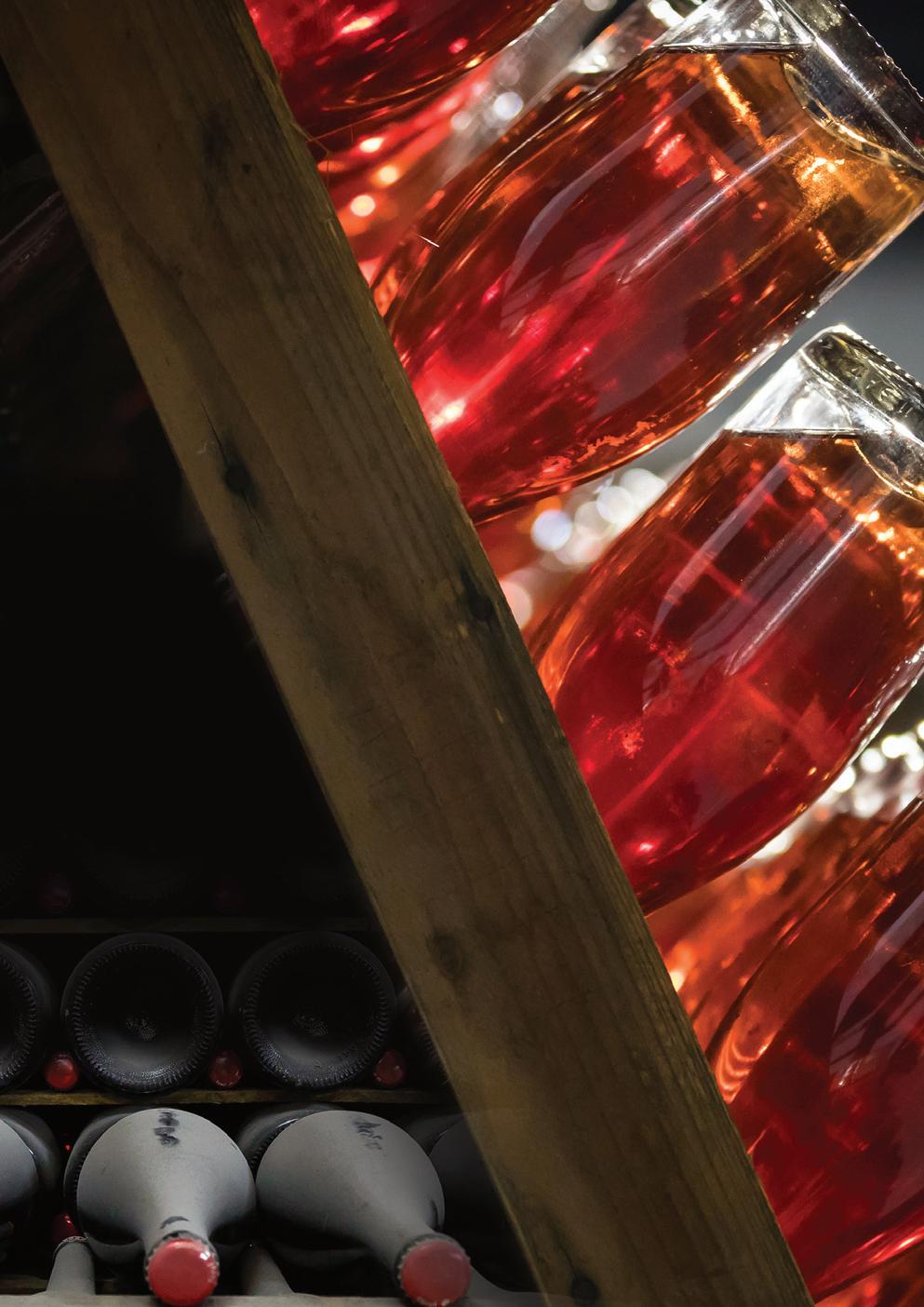


TRye River Brewing Company exports its multi-award-winning craft beers to 26 countries. Following solid growth, the Irish company refuses to stand still – with a brand revamp, new beers and exciting plans to consolidate its top billing. By Andy Probert.
hings are flowing fast and true for Rye River Brewing Company right now. Founder and CEO Tom Cronin and his team of 63 employees wouldn’t have it any other way.
Whether it’s taking craft brews into new, unchartered territories, seeing commercial growth, undergoing a brand revamp, taking the business to new heights, or just seeing someone enjoy one of their creations, all are coming good for the brewer.
Packed with flagship brands such as Rye River, Rye River Seasonal, McGargles, Grafters, Solas and The Crafty Brewing Company, the County Kildare brewer proudly stands as one of the most celebrated and awarded globally.
A business of substance
But for all the company’s awards – 31 of which were won at the 2021 World Beer Awards – the brewer is a business of quality, consistency, substance, innovation and resilience.
Mr Cronin, who has been in the drinks industry since leaving university, launched the company with two partners in October 2013 that “came from an awareness that craft beer was a growing trend in Ireland and, in time, could be a dominant player in the beer category.”
Following a business restructure in 2017 to regain focus on its core brands and markets, Mr Cronin continued as the company’s sole founder, stepping into the role of CEO, and set about making Rye River Brewing Company a world-leading independent craft brewer.
In the years since, it has been setting milestones for all the right reasons, including being the first brewery to be commissioned in Ireland for over 100 years, operating out of a 25HL brewhouse.
“We are a very labour-intensive brewer, brewing up to 40 craft brews a week, 24/7,” he emphasised. “Our brewhouse and tank farm is unique in that every bit of steel used for those assets has been made in Ireland.”
At the time of the 2017 restructure, the company was turning 16,000-17,000 hectolitres, but that more than doubled by the end of 2021.
“We grew substantially between 2017 and 2018, and have grown consistently every year since, by about 10%,” commented Mr Cronin. “That makes us one of the larger independent craft brewers in Ireland. But we are not a one-brand brewery; we are quite complex in offering a diversity of beer brands between retail, exclusive and core brands, brewing up to 30 unique recipes every week.”
With a 50-50 split between domestic and export, the Celbridge-based brewer supplies exclusive craft beers to some of Ireland’s
largest retailers, such as Lidl, Dunnes and Tesco, while its beers are exported to 26 markets, predominantly in Europe.
Mr Cronin said: “Exports are across our core range of beers from our new Rye River Brewing Company brand, our Rye River Seasonal range, our established McGargles brand. Rye River Brewing Company also exports exclusive brands, such as The Crafty Brewing Company for Lidl. We export to places like Italy and Germany and all are performing well.”
Brand is a moot point for the company as it’s presently rolling out an overhaul of its core product line to reflect the brewery’s name.
“We have developed a successful story in craft brewing without having any of our
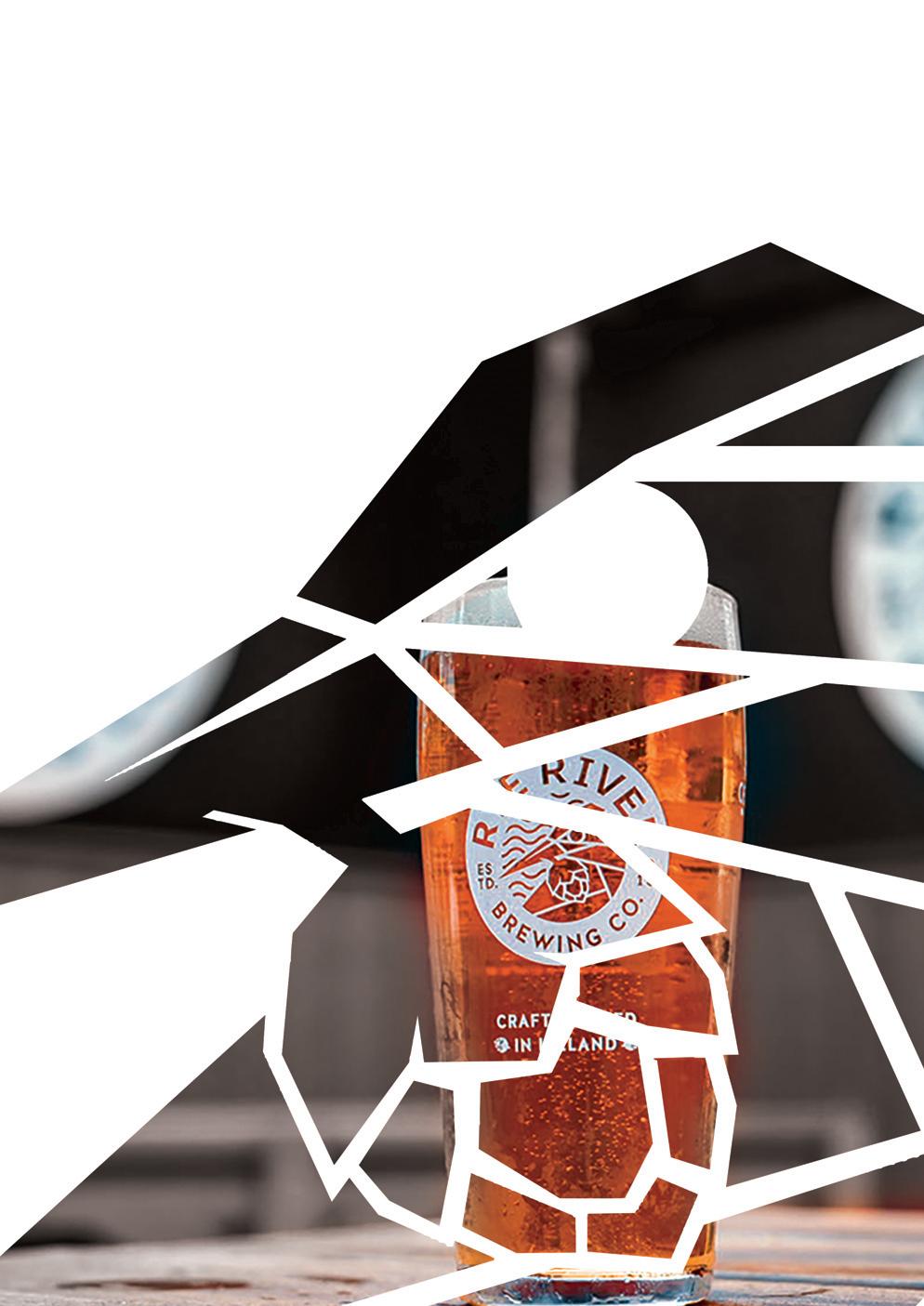
brands carry the Rye River name. So, we have now decided to bring a brand to life that recognises who we are,” revealed Mr Cronin.
“We believe a greater focus on Rye River Brewing Company will help the brewery in its next phase of development. While we adopt a brewery brand-led strategy and transition, we still offer the same great Irish craft beer. We believe the

changes will be more engaging and bring Rye River Brewing Company to more customers.”
The Rye River Brewing Company name has replaced McGargles on draught in pubs and has been made further available since October last year when it launched four SKUS in 330ml can packs in retail. A full transition from the McGargles brand to the Rye River brand is now planned for Q2 this year.
The changes come following a year of growth in off-licence and retail sales, despite the challenges associated with a global pandemic.
Mr Cronin added: “As the most decorated independent craft brewery in the world for the second year running at the World Beer Awards and the best in Europe for the fourth year at the same awards, it proves we are doing something right in producing 30 unique recipes all year round, and reaffirms our passion for consistency and quality.
“We’re a complex brewery, but it has stood to us in good stead during the pandemic in that while exports were impacted severely, and on-premise and on-trade business were depleted, we grew 11% as we had a strong retail premise in Ireland and abroad.”
Behind the corporate entity and at the beating heart of operations is a team of passionate brewers headed by Bill Laukitis and supported by an equally passionate production team, ensuring that what gets brewed with passion, gets packaged with passion.
“From the brewers’ perspective, it is interesting to note that many of their journeys in brewing began with them apprenticing here,” said Mr Laukitis. “They have risen through the ranks, and we can boast that brewers working in some of the world’s most interesting breweries learnt the ropes here.”
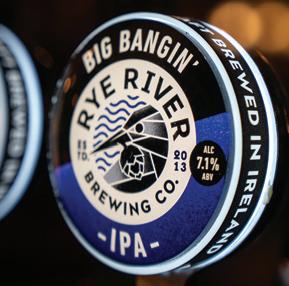
He emphasised: “The culture at Rye River Brewing Company is about quality: from the first step of getting your water and brew right, through to sourcing the best ingredients for a unique recipe; not cutting corners, constantly checking the product and, finally, having a beer in your hand that you can proudly stand by.”
At Rye River, to get ahead in a saturated craft brewing market, the company focuses on a list of core ingredients from selected suppliers in addition to perfecting its brewing processes.
Mr Cronin commented: “We have a unique water profile for every beer that we create. The biggest worth I can bring to Ireland’s craft beer industry is quality and consistency, and we never compromise on those. It’s what we are passionate about.”
Mr Laukitis agreed, adding: “From our malts to our hops, Rye River makes its ingredients a top priority, working with both modern and traditionally hand-turned malts. If I am brewing a German lager, we make sure to select German pilsner malts as the base into that beer. If it’s a Pale Ale or an IPA, we start with a unique grist and then select hops that will shine in that beer wherever they come from be it the US, Germany, Australia or even New Zealand –in order to complete that beer’s story. Even if we’re showcasing eight IPAs or Pale Ales, they will all be different.
“The brewery finds great inspiration from ingredients and opportunities to create new products. Everybody is focused and passionate because the industry demands that.”
The pair revealed that a new seasonal product – one of five for the year - was under wraps after the brewery collaborated with Crisp Malt in Norwich. They have a unique piece of equipment that allows you to finish off a malt in the roasting process under very controlled conditions.
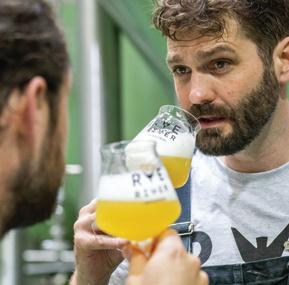
“We wanted to work on a brown malt that brought out the characteristics of modern coffee, that’s nutty and fruity in taste before roast takes over,” said Mr Laukitis. “We had great conversations with Crisp Malt in the lead up to taking one of their poly-clear choice malts through the roasting process to create a lightly roasted brown malt – with a smoother, more modern or contemporary approach to coffee roasting.
“The analysis is underway, and we’re very proud of what we’ve achieved. I am brewing a Brown Ale with that malt combined with a Belgian yeast to push dark fruit and cherry notes. It will be a coffee-inspired Brown Ale and our last seasonal for 2021.”
Earlier in 2021, the company released another Rye River Seasonal called High Noon Fruited Sour, which consisted of cactus fruit with blood orange. The burst of refreshing notes included tangy red grapefruit, orange, tart cherries, raspberry, strawberry, bubble gum, and watermelon – all atop a spritzy tart ale.
2022 will also include five seasonal releases, including Miami J IPA, which is hugely popular and the only re-release seasonal, as well as a barrel aged project.
“The brewers always take huge interest in using the right barrels: we have used Cognac barrels, Buffalo Trace bourbon barrels, and in 2021 it was Anejo Tequila barrels. Next year, we have many options under consideration,” Mr Laukitis revealed.
Mr Cronin continued: “We usually find the premium seasonal ranges are all pre-sold before release. We are now targeting export markets with our seasonal range, with our last batch of Rye River Seasonal shipping to the Nordics for the first time. This brand will remain a limited-edition small batch release irrespective of growing demand.

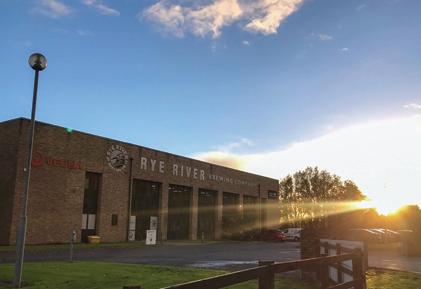

“These seasonal releases are helping to push the boundaries of how we brew and lead to innovations that we look to incorporate in other core beers. It helps make craft beer stand out on the market. Importantly, we don’t pasteurise or filter our beers, ensuring great ingredients and great hops shine through to the end in a great brew.”
This unrelenting pursuit for quality, consistency and innovation, pushing Irish craft beer to the cutting edge of industry, has seen Rye River sweep all before it when it comes to awards and accolades.
Since the company’s restructure in 2017, Rye River Brewing Company has taken over 100 accolades at the World Beer Awards, as well as hundreds of other awards including 18 Great Taste awards, and US Craft Beer Open, Meininger and Brussels Beer challenge medals.
“We want to be seen as a leader and be a catalyst in raising quality and consistency standards,” Mr Cronin commented.
“If the World Beer Awards are anything to go by, we had 31 in 2021, 30 in 2020 and 21 in 2019, so we must be doing something right. For all employees, it is a testament to
them and a great acknowledgement of their pursuit of quality and consistency.”
He added that many challenges remain in the industry, ranging from the introduction of a new alcohol bill in 2021 to prevent multi-buys, to minimum unit pricing which has recently been introduced in Ireland.
“I am hoping that consumers in Ireland may well engage even better with craft beers in the fullness of time. We have a saying here, and it occurred during the pandemic, that people are prepared to pay a little more to savour a better experience. Craft beers play in that space.”
However, the greatest risk to the industry at large, he remarked, is inflation and availability of raw materials.
“Raw material costs are spiralling and in short supply; as beer is a commodity, it has very sensitive price-elasticity. It’s not easy to push the price up as consumers become disengaged. That said, while there are a lot of ill winds blowing through the industry, we’re confident where we can take this brewery in terms of volume, credentials and profile.”
By the time glasses are being clinked to celebrate the end of 2021, Rye River Brewing
Company will be focusing on the installation of a new packaging line for Q1 2022, following an investment worth €1.5 million, and will have begun a procurement process for a new brewhouse at its Celbridge site in conjunction with the filing of a planning application for a new 20,000 sqft warehouse.
“We hope to realise that new brewhouse by 2023,” confirmed Mr Cronin. “As for 2022, we are looking at new growth, extra capacity and new markets, such as China, Canada and the UK.
“That level of investment for an independent brewery in Ireland is reflective of the confidence and ambition we have in our brands, our people, our culture, quality, and how our beers are perceived.”
He concluded: “We have never been as confident as we are now in what we do, believing in our vision and delivering on it. We were at a precipice in 2016, but we are now a leader in our category, winning awards, and acknowledged by an independent panel of tasters for brewing some of the best beers in the world at our Kildare based brewery. It is something we are all immensely proud of!”
The award-winning Boutari wines emphasise the distinct character of the variety of grape in the region where they are grown. Dedication to detail, taste and quality are the foundations on which the family business is advancing and bringing Greek wine to greater acclaim. Profile by Andy Probert.
Launched in 1879, the family owned Boutari Winery has been on a journey of innovation, expansion and continual improvement in asserting its leading role in Greece and becoming an ambassador for Greek wine worldwide.
Yet, having won more than 600 awards, achieved multiple accolades for its core of
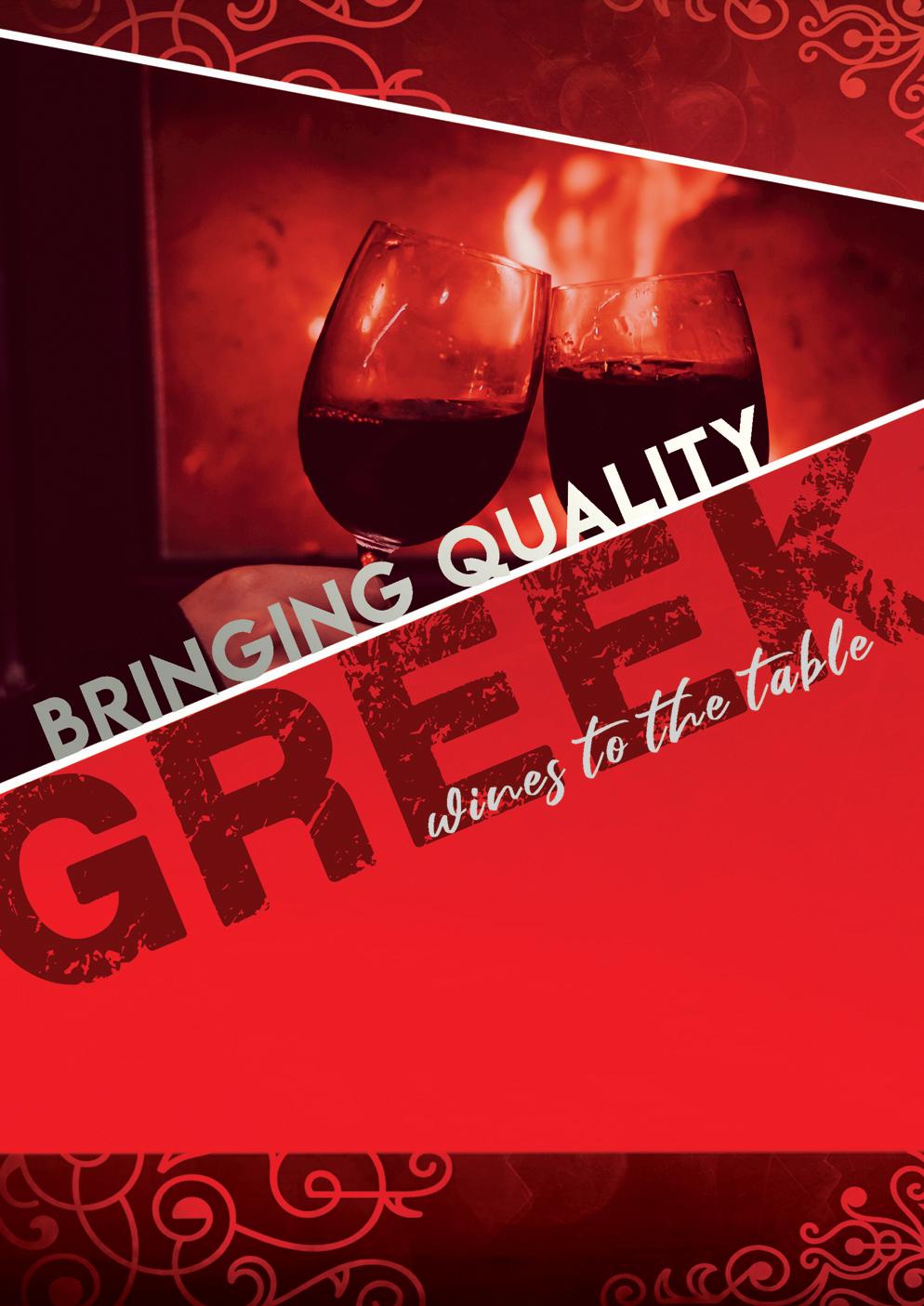
40 branded wines, and exports to 30 countries, there is still a sense of much work to do to assert Greek wine in the same league as Italian, French or New World wines.
Boutari was honoured in 2020 with the Winery of the Year award for the 19th time by Wine & Spirits, one of the most influential publications in the global wine sector, and
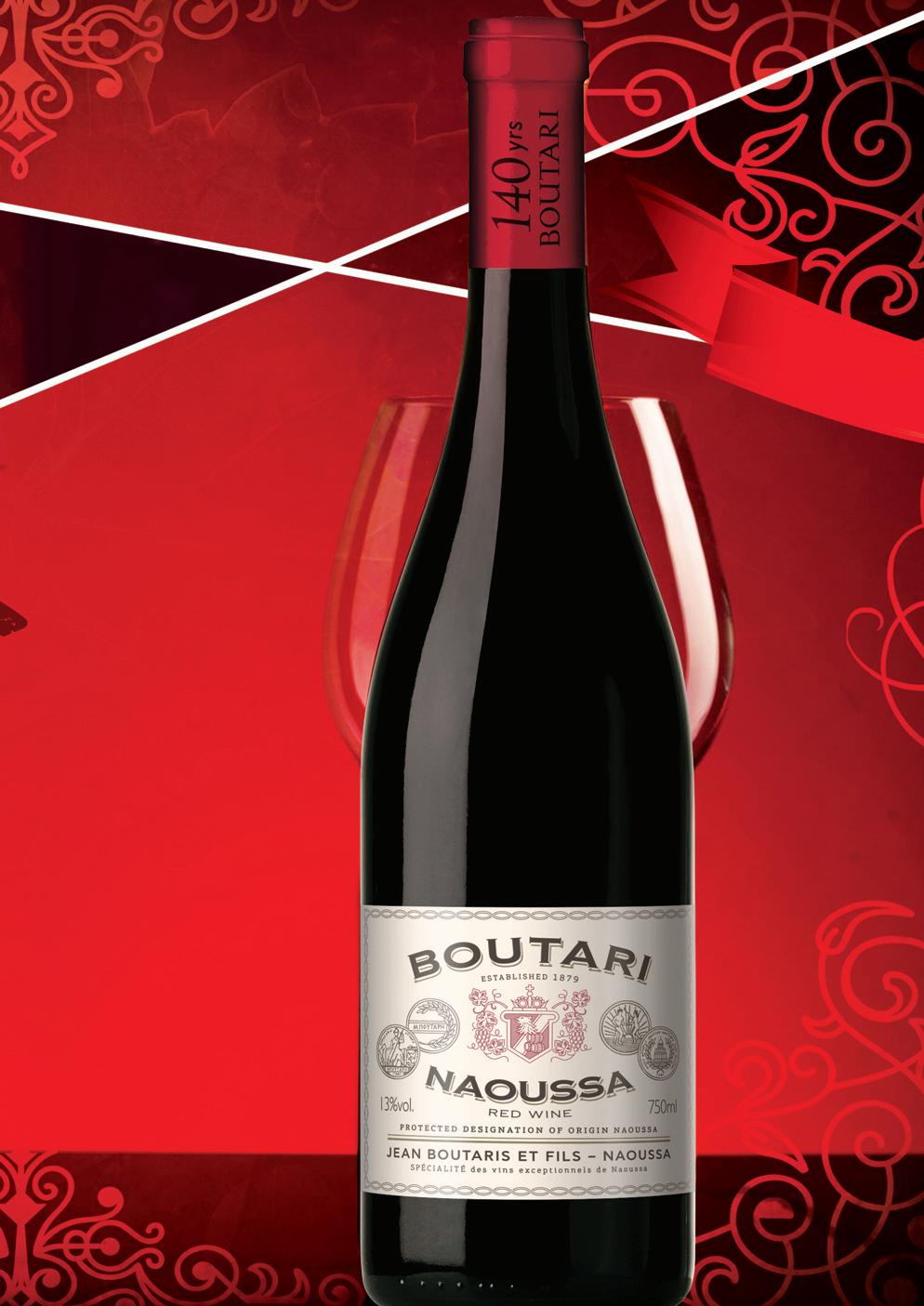
kept sixth place in the Hall of Fame of the top 10 wineries in the world. Boutari plans to promote the best of Greek wine is certainly advancing in the right direction.
Evolving wine business
“Our goal is to assert Greek wines, not just Boutari wines, so as to be visible on international wine lists of hotels, restaurants and bars. It remains a challenge and a great opportunity since Greek wine does not have its own section in global wine lists.
Greek wine is still mixed in with other wines or is under Mediterranean wines.” asserted Commercial Director Marina Boutari, a fifthgeneration family member of the company founded by her great-great grandfather, John Boutaris.
Since its establishment in 1879 in Naoussa, Northern Greece, the company has set the foundations for the production of topquality wine and contributed significantly to the revival and development of indigenous Greek varieties.
In the 1960s, Boutari took a strategic decision to invest and focus on viticulture.
In the late 1980s, Boutari expanded its operations, buying vineyards and establishing wineries in top Greek wine producing regions. It currently owns vineyards and wineries in Naoussa and Goumenissa in Macedonia, Mantinia in the Peloponnese, Crete and Santorini.
Additionally, the family embarked on its collaboration with the emblematic vinegrower Roxane Matsa in Attica. In 2004, Boutari acquired Skalani vineyard in Crete and renovated the estate’s winery. A year later, it became the first Greek winery to expand its operations outside Greece and acquire Domaine de Mayrac, a winery
surrounded by a 100-acre vineyard of organic cultivation in Southern France.
“All Boutari wineries give great emphasis on making quality wines with a distinct character that represents fully the potential of the variety they come from,” Marina Boutari added.
The arrival of Boutari’s winemakers to Santorini in the late 80s, and the first harvest at the winery in 1989, kickstarted the industry on the island. For the past 30 years, the company’s agronomists and winemakers have brought great experience and innovative thinking to Santorini’s viticultural community.
They set new quality standards for harvest and wine production, applied winemaking practices unknown on the island, and contributed directly to inspiring the local industry, where 20 winemakers now flourish.
Boutari’s Santorini wines are made from fruit that thrives in volcanic and sandy soils.
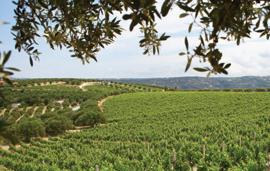
The vines, which are 50 to 60 years old, lie close to the ground, pruned in a basket shape to protect the grapes, which grow in the centre. This cultivation method, called Kouloura, protects the grapes from the fierce Aegean winds while the vines absorb and maintain humidity from the dense night fog.
Staff select grapes by hand for optimum quality and cool them at 10°C before they are destemmed, crushed and pressed. Following different processes, the wines mature for six months in French oak barrels before bottling.
Ms Boutari said: “As one of the oldest Greek wineries, we are pioneers in many areas of winemaking. We produced the first red bottled Greek wine, Naoussa Boutari –still one of the best-selling reds – were

among the first wineries to export our wines, and the only one with a presence in so many top winemaking regions.
Boutari has also been a pioneer in wine tourism – particularly in Santorini where it was the first winery to open its doors to the public to offer tours, tastings and art programs in its dazzling white dome, voted as one of the ten architectural wine wonders of the world.
Wine tourism and agrotourism is also present in Crete where the Scalani Hills Boutari Winery and Residences have been offering a unique wine-tourism experience in the vineyard.
“Wine tourism allows us to introduce tourists and wine enthusiasts to the world of Greek wine. We aim to offer them an experience that they will remember when they return to their country and hopefully taste again one of our products, either at home or when they come back to Greece,” commented Ms Boutari.
“More than 1,400 wineries operate in Greece today, and many produce top quality wines. The problem with Greek wine is not its quality but its fame. Greek wine doesn’t have the position it deserves in the world of wines. We need to work together and invest more in marketing. Boutari is proud to be one of the ambassadors of top-quality Greek wine.”
The quality of Boutari wine has drawn much praise from wine industry critics worldwide. In 2009, it was recognised as the top
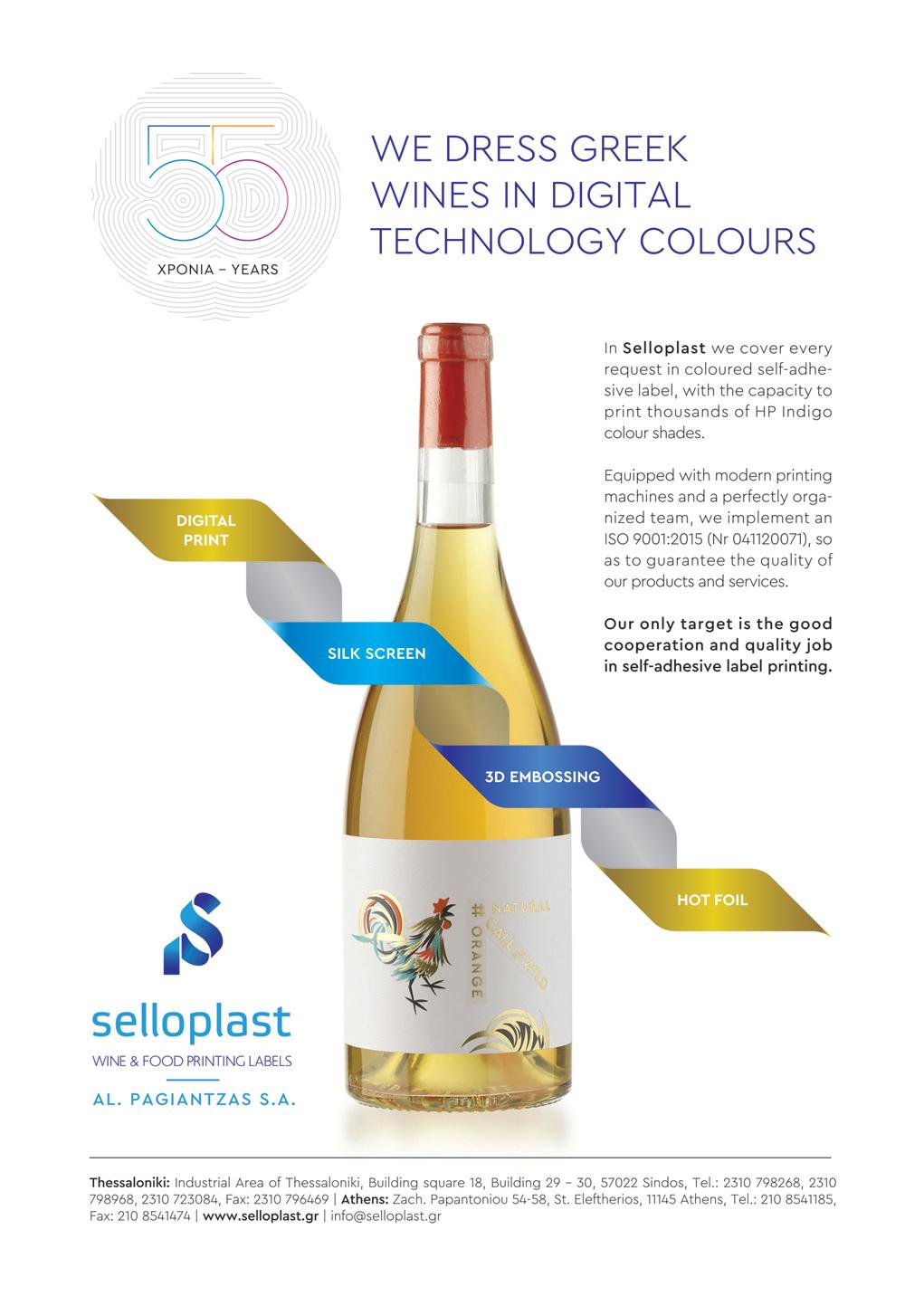
European Winery of the Year by one of its most prestigious wine magazines, Wine Enthusiast.
In 2013, the outstanding Naoussa Boutari wine received the highest and most significant distinction in its long history when Wine Spectator ranked it among the 100 best wines in the world.
“Boutari is a reference point for Greek wine and a brand that is respected for its quality, taste and legacy,” Ms Boutari continued. “With a presence in all the main wine-growing areas of Greece, and producing wines from the four Ambassador grape varieties, Boutari has lifted its prominence.
“On average, we sell four million bottles annually, out of which around 25-30% (depending on the year) are exported. As far as distribution is concerned, wines are shipped to international distributors or to Greek wholesalers and are sold in all channels; supermarkets, wine shops, e-shops and the HORECA sector.”
Shedding a dated industry image
Ms Boutari said: “Making the Greek wines known around the globe is an ongoing and challenging process. During Covid-19, con-
sumers tended to look for well-known brands that not only offer great value for money, but also a true representation of their region, and Boutari wines do exactly that.
“A big challenge for all quality Greek wines is and has been the Greek bulk wine sold in restaurants. Bulk, anonymous wine creates a bad image for Greek wine, domestically and internationally. Unfortunately, it still represents a large portion of the total Greek wine market share. It is a challenge that all wineries that produce excellent quality bottled wine need to face together.”
She added: “Boutari is synonymous to Greek wine making history: we have been in the business for generations and have a strong vision for Greek wine and Greek wine tourism.”
The drive for quality is through constant modernisation of viniculture equipment, using more energy-efficient ways, minimising fertilizers, and using packaging that is more environmentally friendly. The busi-
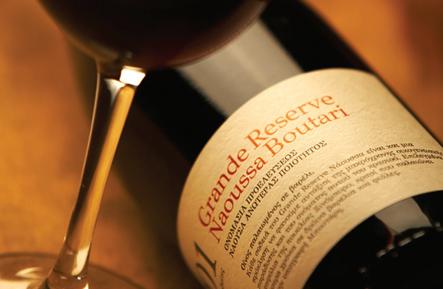

ness is also planning, shortly, to reclaim CO2 from the fermentation process and use many by-products in different ways.
Ms Boutari added: “As far as branding is concerned, our goal is to always listen to consumers’ needs and create new brands to meet them. In 2019 we created a new corporate identity, we began rebranding a lot of our wines, and last but not least, we created a lot of new products. As a result, two years on, we now have a better, trendier, and more commercial portfolio.”
She concluded: “Commercially, our goal is to keep expanding both in Greece and abroad, with the aspiration to put Greek and Boutari wines on the map, on the table and in the minds of international consumers.”n
www.boutari.gr
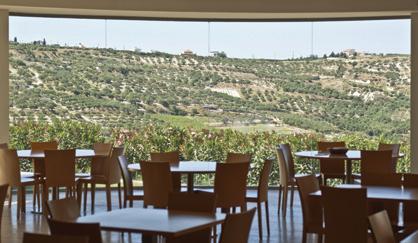



from crop to consumption

Thailand’s Chaveevan Group has carved out an enviable niche in the provision of premium chicken for the export market. As a completely integrated supply chain, certified to the highest standards, quality comes as standard, whether sold in the UK or the Middle East. “We don’t strive to be the biggest. We strive to be the best and grow as our partners grow,” asserted General Manager David Santos. Interview by Andy Probert.

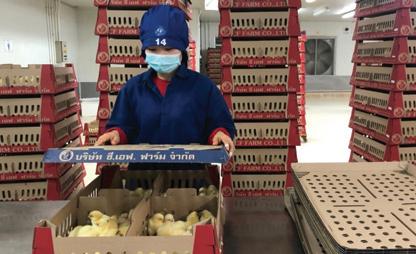
Renowned as one of the best foodproducing countries globally, Thailand is naturally proud of its quality produce. None more so than the Chaveevan Group, which thrives as one of the premium poultry growers, producers and suppliers.
Its added value farm-to-fork operation encompasses every angle in the supply chain. At every point, the group asserts stringent quality control checks to ensure its products, sold in supermarkets from the EU to Japan and from the Middle East to the UK, are of the highest comparable quality.
“There is a misconception held by some that chicken or food from Asia is not safe at all. But the food industry in Asia, certainly in Thailand, has developed to a level that is now more hygienic and of a higher quality than seen in the West,” asserted General Manager David Santos.
“The facilities of the Chaveevan Group are comparable, if not better, than elsewhere in the West. We are dedicated to what we do and attest to Thailand’s collective slogan of ‘Food for the World’ by providing exceptional products.”
As a family-run company, quality appears to be the very watchword of its existence. Its matriarch, Mrs Chaveevan Kampa, reflected: “Our business was formed from simple beginnings. Believing good food is essential to the development of young people, I prepared nutritious meals daily at our local school.

“The need for quality food is essential. I aim to make sure our name is associated with high food safety standards and high production values, which our partners demand.”
She launched the business in 1982 by raising 5,000 broilers at a family farm in Nongkham. She expanded into contract farming operations and breeder farms by buying day-old chicks and selling to farms.
Today, Mrs Kampa oversees a sprawling operation within the Chaveevan Group that accounts for upstream, downstream and midstream poultry operations.
Based in Si Racha, Chonburi Province, in Eastern Thailand, and less than 90 minutes from Bangkok, the company owns and operates feed mills, broiler farms, a slaughterhouse, laboratories, R&D units, logistics, and cooking and production plants.
The Chaveevan Group is responsible for exporting 100% of its raw and cooked product lines under private label for some of the best-known food retailers on the
planet, as well as to schools, militaries and hospitals.
“We began exporting raw value-added poultry products in 1995 before we launched two cooking plants in 2004,” said Mr Santos. “Now, we export raw and cooked lines to more than 40 countries across Europe and Asia.”
On any given day, its eight-strong farming operation accounts for around 7 million live chickens, ranging in age from one day up to 40 days, and it slaughters up to 125,000 chickens per day.
“We also operate several contract farms who grow the chickens for us under our strict supervision and standards,” he added. “Our two cooking plants are running at full capacity and produce 200 metric tonnes of products per month.”
Mr Santos said: “We are now exporting 80% cooked chicken and 20% raw poultry products. We are the silent partner of our


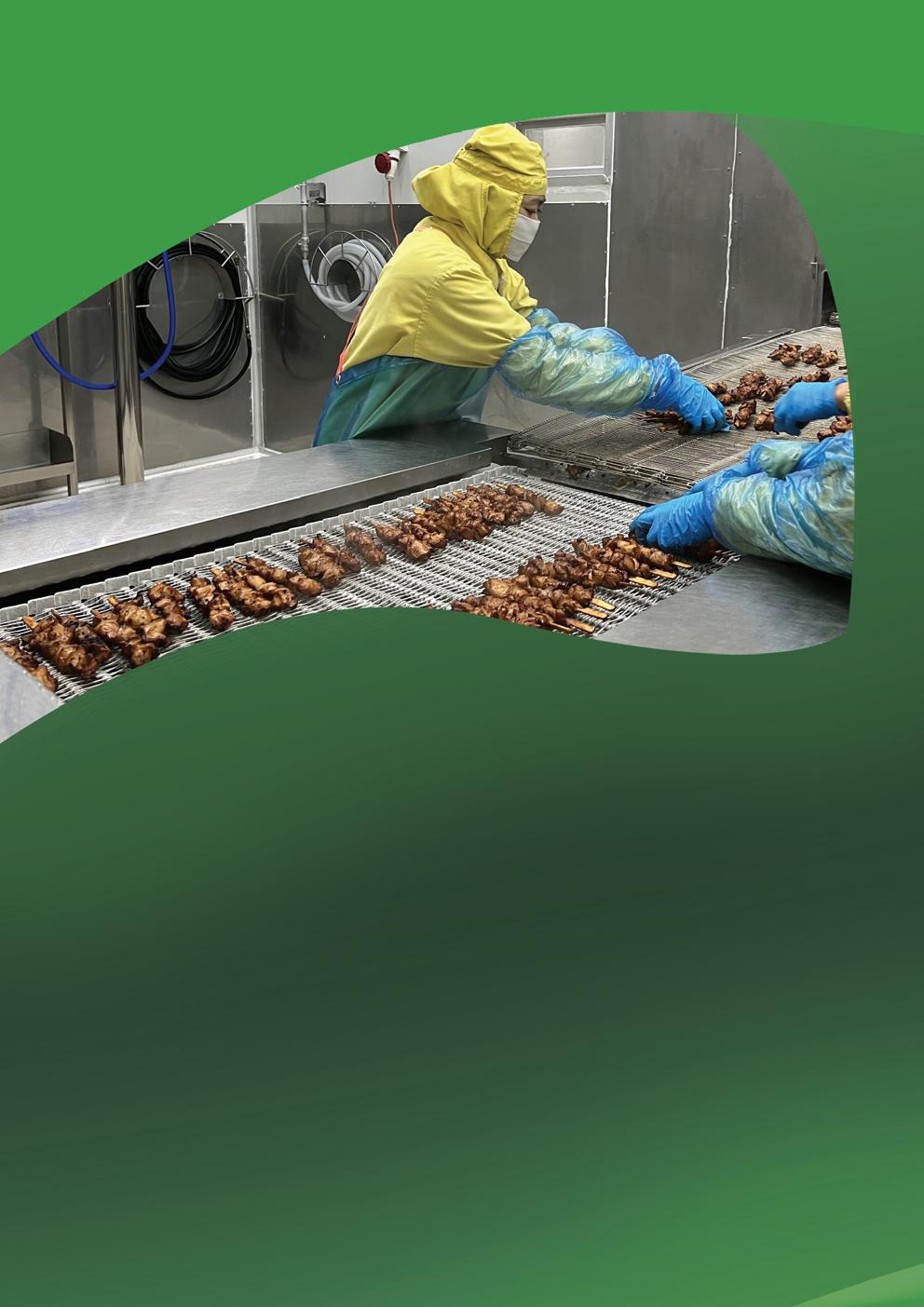
customers, and we flourish in the private label sector.
“The reason why supermarkets and our very demanding customers trust us to put their labels on our products is that Chaveevan is one of the few integrators that has internationally recognised certifications.
“We operate to standards that guarantee full traceability across the entire chain; on food safety, conservation, as well as being halal-certified.” Chaveevan also adheres to the implementation of animal welfare and ensures all operating units are geared to preserving the environment.
In addition, the company extends complete ethical trading principles to all employees at every level. Its workforce is 4,000 strong, and staff turnover is less than 2%, with some having been with the company for more than 30 years.
Mr Santos said the company experienced expansion, posting a healthy 15% growth annually in the run-up to Covid-19.
“Trading and growth were flat in 2020 and 2021. We continuously monitor the international scene with lockdowns and new Covid waves daily, but we hope things will get better in 2022.”
While seeking to reduce the carbon footprint of its operations, the Chaveevan Group
is also investing in expanding one of its cooking plants, presently running at full capacity, to accommodate more volume demanded from customers.
“The cooking plant is full up to Q3 of 2022, and more customers want to increase production. We are also considering further expansion at our farms to increase the chicken population in order to meet this demand,” he said.
“We also plan to modernise different units, such as converting waste to biogas at our slaughter plant, transitioning to a paperless environment, adding solar panels to facilities and minimising our carbon footprint.”
During the pandemic, the company tested workers, isolated any that showed signs of Covid, and offered support facilities and services.
“Ten other big chicken factories were ordered closed by the Thailand Government because of issues surrounding Covid but we were not one of them,” remarked Mr Santos.
“We have remained open, and the Government was very responsive to our requests. As we are located in the east of Thailand, it is highly industrialised, and the Government did not want any disruptions to output and exports. They were very
attentive with their support and ensured the main ports remained open.”
He added the biggest challenges facing the industry was shipping availability, employee recruitment, and rising costs of production, packaging and raw material costs.
“We have positioned ourselves well to where our capabilities are, and we are protecting that in the high value-added
segment of the chicken product niche. We have the skill, experience and international certifications to meet this most demanding of sectors.
“And because of our closed integration, we can implement the highest standard possible across the links in the chain.”
He added: “As a family-owned company, we can move quicker on decision-making. Our suppliers and customers have been



with us for more than 25 years. We communicate in a very honest, open and transparent manner.”
Mr Santos revealed the company had experienced some financial crisis in 2007 - 08 and “it was good customers that extended financing to us without any collateral because of the trust that exists in these long-term relationships.
“We overcame this problem, and we are very thankful. Our customers and suppliers are not just numbers in our book; we treat them as our partners.”
He concluded: “Thailand is one of the top five chicken producers and exporters in the world. Our industry is robust and resilient, and continues to grow. The Chaveevan Group‘s positioning will not change: we don’t strive to be the biggest. We strive to be the best and grow as our partners grow.” n
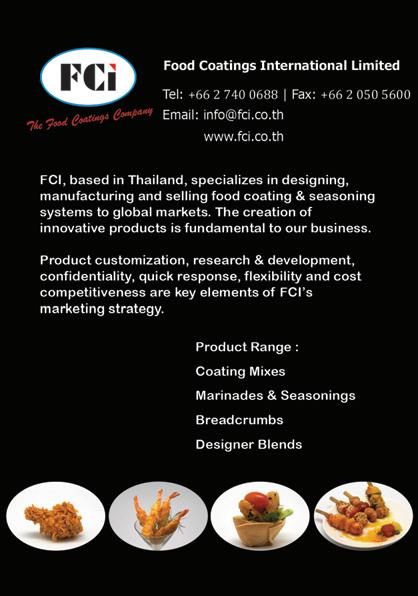

We can doubtless all agree that some of the best things in life come about as combinations of other things. Peanut butter and jam (or jelly, for our American readers), macaroni and cheese, hotdogs and ketchup, ice cream and chocolate sauce. And today, we can add Hunland to that list. Combining the best of Hungary and Holland, the company has produced a winning business recipe. Hunland’s management team spoke to Richard Hagan about the company’s philosophies for success.
Hunland Group, based in Hungary, is a modern, ethical facilitator, producer and trader of various livestock categories across Europe and the world. The name Hunland combines the first three letters of Hungary, and the last four of Holland, to reflect the birthplace of the company’s founder, Jos Janssen and the location of the business’ headquarters in Bugyi, Pest County, Hungary. Mr. Janssen comes from a traditional Dutch cattle trader family and when he first visited Hungary in 1992, he found Hungarian people’s mentality and commitment to work inspiring and decided to establish his family business there and settle down. During the past 30 years, Hunland became a group of companies operating worldwide.
The company’s activities are divided into three main categories: production of livestock (including farming and dairy production), trading of livestock and meat (both its own as well as connecting external farmers to buyers), and livestock transport services across Europe and globally.
The company employs around 670 staff spread across its various facilities. Looking first at the production side,
its several livestock farms spread across Hungary, Slovakia, Romania, Serbia and Greece, have a combined stock capacity of 30,000 animals.
Adding the production of these farms to the combined production of its supply partner farmers, the company’s annual exports include 50,000 breeding cattle, 350,000 cattle for meat purposes, 200,000 sheep and 1.2 million pigs and piglets.
Additionally, the company owns two dairy farms with an impressive daily output of 120 tonnes, and it has its own fodder production facility with an annual production capacity of 60,000 tonnes.
Moving on to the company’s transportation division, the company operates over 140 trucks. This is a remarkable number considering that this division has only been operational since 2006. Within the fleet, the majority of the vehicles are livestock trucks, with 70 designed to carry cattle, piglets and slaughter pigs. 30 trucks are refrigerator trucks for transportation of fresh meat and medication, and 35 are bulk carriers for shipping goods out of the company’s food production factory.
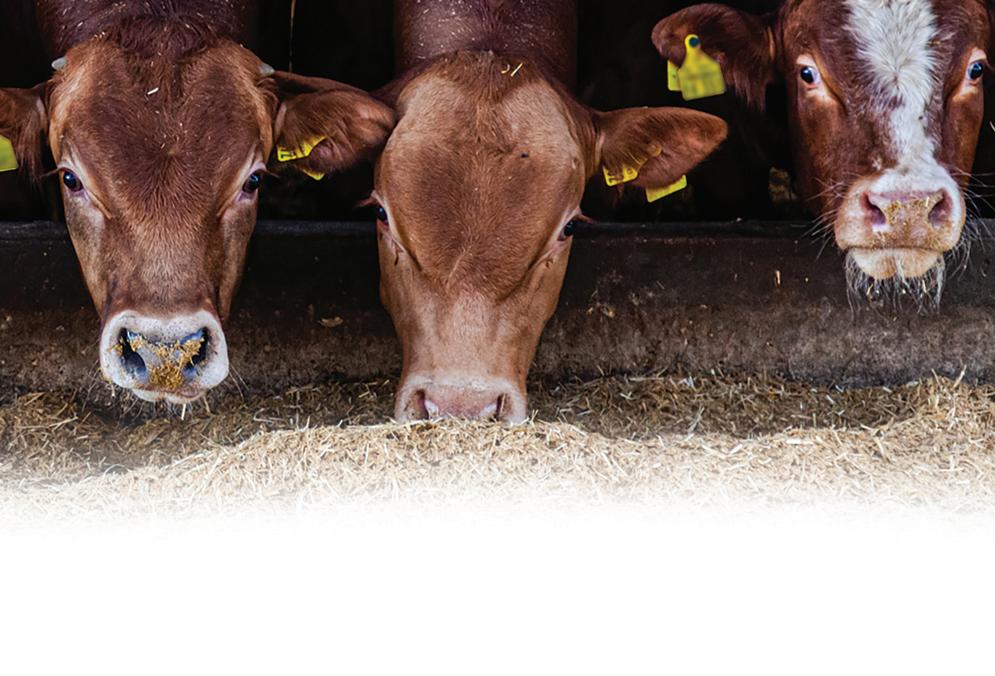


As Tibor Hipszki, Director of Finance and Strategy, confirmed: “Animal welfare and taking proper care of our animals is very important to us and we treat them with the utmost dignity. We have comfortable and bright, state-of-the-art, well-ventilated and (during wintertime) heated stables for calves. Later cattle are protected from heat and humidity. Our farmers use the best milk replacers for the calves and the adults are treated to the highest quality feed.”
These combined measures ensure that the company’s livestock is 100% healthy, with few or zero diseases. All of that is important because, as Mr Hipszki added: “Raising animals without stress supports higher weight-gain and generates higher meat quality.”
Of course, successfully and ethically raising livestock is only half the challenge for Hunland. The other half is delivering the animal to its destination safely and comfortably, the responsibility for which lands on Péter Hencz’s shoulders.
As the Managing Director of Hunland Trans – the company’s trucking division – Mr Hencz oversees 10,000 livestock transport-annually.
“Guaranteeing the animals’ health condition throughout the transportation process is a sensitive and important issue,” he said. “We think transparency is the key to ensuring that livestock arrives in perfect condition.”
To achieve this, the company has collaborated with the Hungarian University of Veterinary Medicine to develop a new animal welfare codex which was officially established in October 2021.
“For us, guaranteeing transparency in the transportation of animals means allowing the veterinary authorities, the non-governmental organisations, and any other relevant stakeholders, to see what’s happening with our transport and to continuously collaborate with them on best practices. We regularly communicate with all parties and we’re available day and night to take a call and correct a problem immediately.”

Covid-related closures affected almost every business worldwide to some extent, but arguably the global hospitality industry felt, and continues to feel the biggest impact.
Hunland’s meat business was not immune from the economic shocks of lockdown, as its Head of Meat Department, Dóra SzilágyiGaal confirmed: “When Covid hit Europe and the borders closed, the meat industry was immediately impacted. Hotels and restaurants shut but supermarkets remained open.
“Pricing was the first domino to fall in the beef meat sector –especially regarding high value beef products - meanwhile poultry and pork (which are mainly supermarket products) were bought in huge volumes and supermarkets, in turn, ordered super volumes, which drove up pricing for those categories. People stocked up in the fear that food items wouldn’t be available.” she said.
As lockdowns dragged on, more and more processing plants were operating at reduced capacity due to domestic employees getting infected by the virus or foreigners going home because of the quarantine. Thus, normal processing volumes could no longer be maintained, which later generated deficit on the beef meat market.
Opposite moves were observed in the poultry and pork market, as first prices raised, then when the households were already full with meat requests decreased and prices followed. Live bird producers have reduced the numbers in the production due to unfavourable market situation, which generated important lack especially in the turkey meat market in spring 2021.
With the subsequent relaxing of business and movement restrictions, prices have begun to normalise again, but according to Mrs Szilágyi-Gaal, lockdowns have left a lasting impression on the meat market.
“At the beginning of the Covid lockdown, people bought mostly mincemeat for cooking spaghetti and hamburgers – these are quick and easy meals that everyone can cook. But now what we’re seeing is that people have found a new pleasure for cooking at home, and demand has consequently changed.”


“Nowadays people are more and more interested in what they consume and have learnt how to cook their meals at home in a professional way,” she added.
This latter phenomenon inspired Hunland Meat Department to start the Hunland Good Veal project. This brand name almost sounds like goodwill and represents our self-produced rosé veal meat that goes through a process where animal welfare and premium quality production are equally essential.
Hunland places a high premium on producing and delivering the highest quality product and precise and constant quantity at all times, on schedule. It’s a critical part of its success.
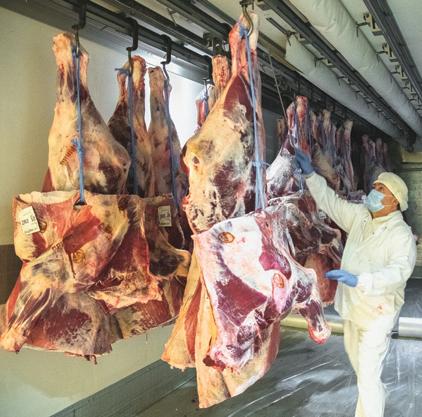

“Retaining customers requires supplying exactly what they need, when they need it, to the highest quality they require,” said Mrs Szilágyi-Gaal. “We ensure that we react to and deliver their orders in the shortest possible time.”
The company’s global network ensures that it is able to supply its customers with products at every price and quality point, as Mr Hipszki confirmed.
“We can always offer the best solution for our partners,” he said. “For example, if someone wants cheaper cattle, we can offer them livestock from South America, whereas clients with higher budgets will be offered stock from our own production.”
And when the livestock is ready to be delivered, it’ll be treated to “business class travel,” as Mr Hencz quipped, before adding: “The industry needs a better solution for temperature control in trucks. We’ve already begun building a fully climatecontrolled vehicle prototype but it still requires a lot of testing. The final product will be very useful for the whole industry and we’re extremely proud to be the first to be developing a solution like this.”
Outside of its investment in developing its own brand-new fleet of trucks, Hunland is building a major new feed factory that will double its current feed production to a total of 120,000 tonnes. Additionally, the company is expanding its farming capacity.
“We’re adding an additional capacity of 2,200 head for cattle production; that will happen in 2022,” said Mr Hipszki. “We’re also designing a sow farm with a 3,500 head capacity and annual piglet production of between 110,000 and 120,000, or around 12% of the company’s current annual trading volume. This will be a major milestone for us as it will be our first production facility in something other than cattle and sheep.”


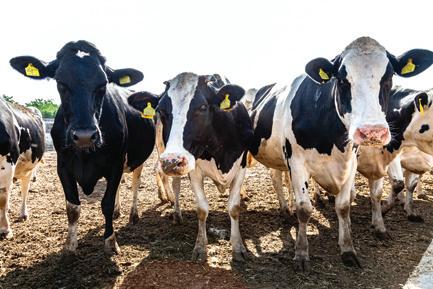
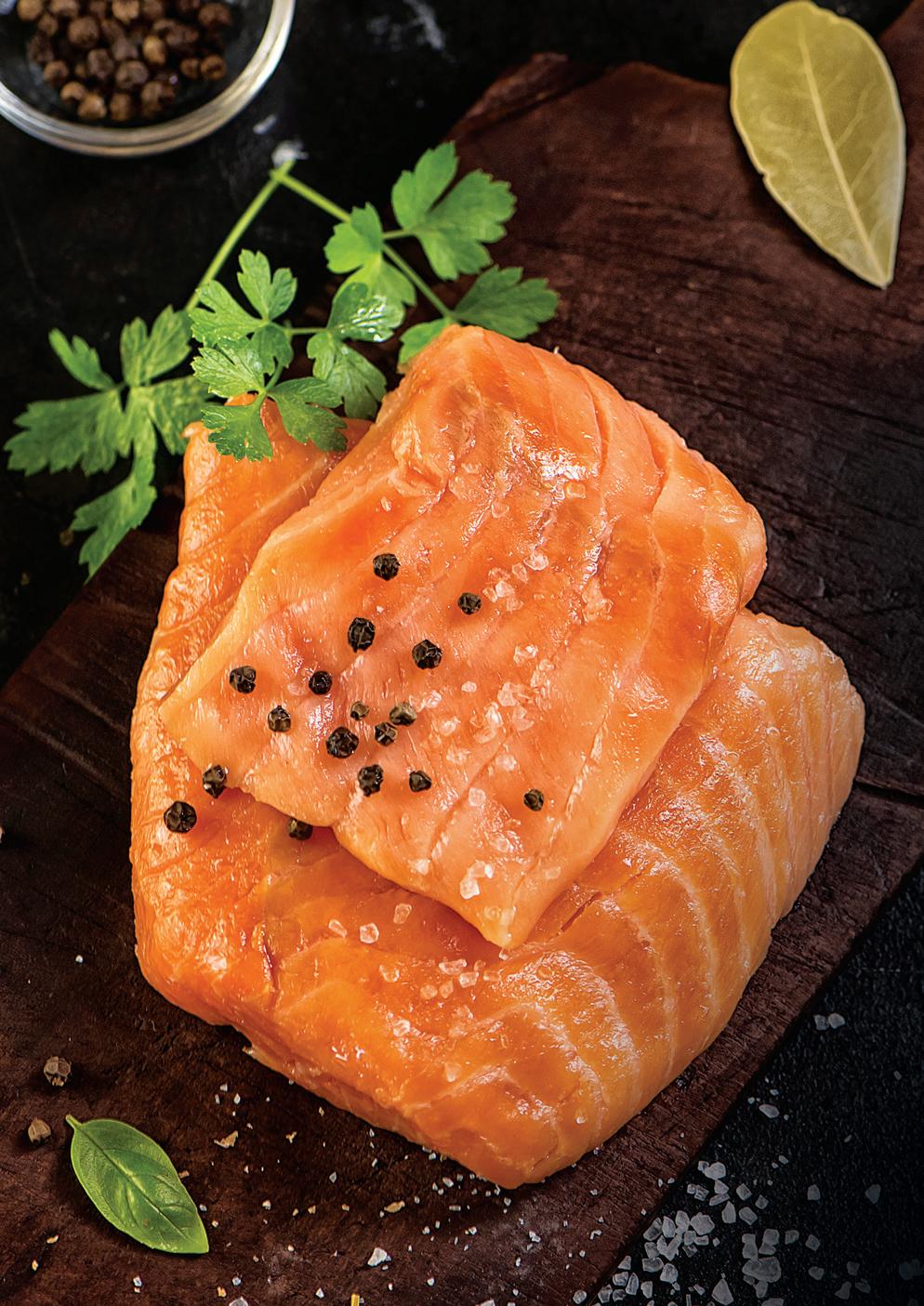

A decision to move away from service to retail clients has enabled Fjord Bohemia, a Czech Republic-based fish food manufacturer and distributor, to enjoy a 100% turnaround in business growth. Having undergone a three-year overhaul, with fresh investments, the company is now focused on expansion. Profile by Andy Probert.
The year 2020 proved a new and exciting turning point in the fortunes of Fjord Bohemia, a fish food producer and distributor, where business has rocketed since it transitioned from service-led provision to a retail supplier.
The company’s new chapter began to be written three years previously when, in 2017, an experienced Far East Russian fishing production company acquired it and set about investing in new machinery, infrastructure and providing a new focus.
Fjord Bohemia launched an incredible 70 new product lines across 2020 and 2021 and has enjoyed 100% growth with its repositioning to serve the retail sector.
“We remain a mid-sized agile company in the heart of Prague, with a determination to increase fish volumes and create more quality products to meet the requirements of an ever-growing market,” said Fjord Bohemia’s Managing Director, Mikhail Darkin.
The company was established in 1999, with its main activity in the distribution of fresh fish to the Czech HORECA market. One of its prime product offerings was smoked salmon over beechwood.

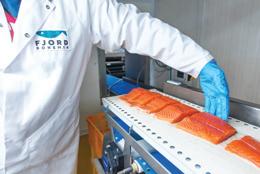

In 2006, the company built a service platform with cold storage, production space, logistics and transportation to help support the market expansion of Metro C&C in the Czech Republic, Slovakia and Hungary.
The dawn of a new era followed with the new owner’s arrival as it set about redefining Fjord Bohemia’s outlook while retaining its quality-assured, value-added approach to products and clients.
Mr Darkin said: “Our group has more than 30 years in the seafood business and is well-renowned worldwide. When it acquired Fjord Bohemia, it heralded a reorganisation, facility modernisation, and heavy investments in new technologies. It took three years, and from 2020 we actively began full operations.”
The company’s 75-strong workforce continues to work through an average volume of 70 tonnes of fresh fish produce each week, sourced from 14 European countr ies. Around 50% of its end products are exported to Austria, Slovakia, Germany, Italy, France, Hungary, Bulgaria and Montenegro, and the remaining 50% is destined for the domestic market.
The new technology drive included state-of-the machinery for filleting, preparing, portioning, cutting and skinning. Fjord Bohemia also has MAP packaging, skinning and vacuum packing technologies for different products.
Fjord Bohemia’s production line features the newest Marel filleting machine, which can fillet up to 25 fish per minute, or 3.6 tonnes per hour. It also has a Marel portion cutter which offers high speed accurate portioning thanks to laser vision, and integrated software that detects the size of each fillet and calculates the optimal use for each fillet.
“Not forgetting that we also still do smoking and marination of fish as well,” added Mr Darkin. “Salmon represents Fjord Bohemia’s biggest volume in fish products, but we also handle halibut, cod, Alaska pollock and squid. A diverse approach
ensures we can offer the full range of options to our clients across Europe.”
He said: “The automation and additional machinery has brought us many benefits. Safety, quality and efficiency have improved. We get a better yield and can take greater capacity.”
The facility also offers storage and maintenance, and dispatch in the shortest possible time concerning the supply and temperature chains. The complete process also includes preparing all necessary documents for the shipments and pallet labelling for long-term storage.
It can store about 350 pallets of frozen goods, 100 pallets of refrigerated goods, and 100 pallets of dry goods. The company can also offer labelling and repackaging services according to the client’s specifications.
Mr Darkin said: “Since we transitioned to retail channels in 2020, 70% of our turnover is generated through the supply of our own brand or private label products to blue-chip supermarket clients, such as Lidl, Tesco, Metro Group and Kaufland. We also started up our cooperation with leading European e-grocery retailer Rohlik Group.”
The rest of the business sees only 15% dedicated to service provision, and the rest is to private and independent concerns in the HORECA segments.
He explained: “After the company’s reorganisation, in 2020 and 2021 we went through a lot of product development and implemented 70 different products over those two years.
“We saw 100% business growth in 2021 compared to 2020 and it was the best trading year in the company’s history. There has been very fast growth, and the factory’s capacity remains big enough to cope with the extra demand.
“The utilisation of the new machinery means greater throughput in delivering more value-added fish products. With our additional skin packaging machinery, we will seek to increase production from January 2022.”
Fjord Bohemia’s production is based on international food standards, and in working with fresh, frozen, marinated or smoked products, the inspection process is exceptionally high.
“When working with European retailers, we always maintain the highest standards. Our production and quality departments are certified to HACCP, IFS, MSC, ACS and BIO accreditation.”
Mr Darkin commented: “Apart from Covid-19, the major challenge is responding to the fast-growing demand for our products. This requires greater synergy throughout the company to help with this growth and maintaining the highest quality standards.
“Being based in Prague, Fjord Bohemia can offer a unique platform and a great location for logistics. Our modern facilities and machinery – some of which are unique to the region, such as the filleting line – give us an ideal opportunity to provide complex solutions to clients. We are like a Swiss knife in offering multiple solutions from one location.”
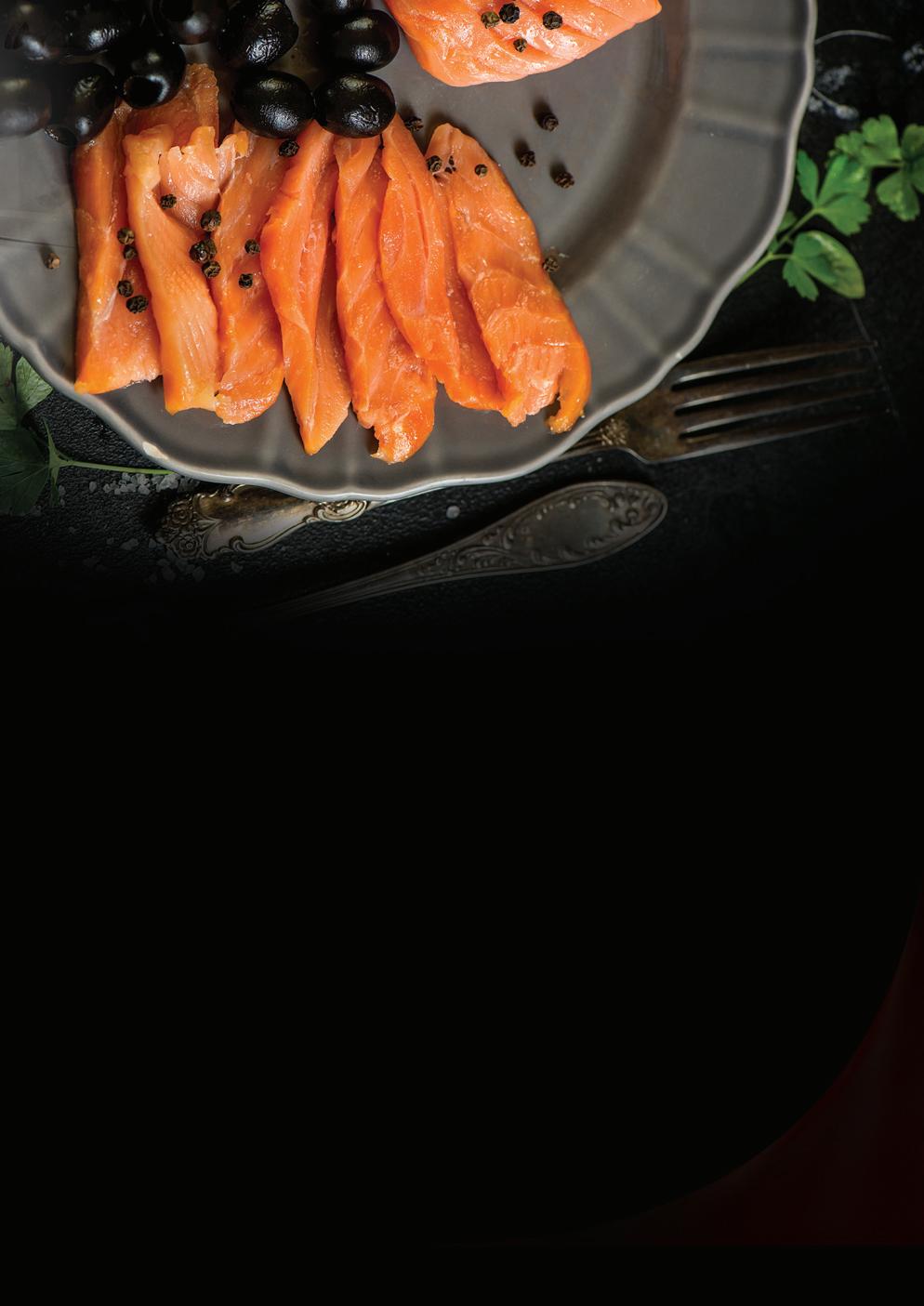
Fjord Bohemia, stated Mr Darkin, maintains “an open book approach” to clients, with honest communication and transparent relations. It also offers educational meetings for potential clients to see the production plant.
“There’s a belief that there is enormous potential for this market to continue to grow,” he said. “The consumption of fish in the Czech Republic is still very low compared to Europe. On average, a European consumes 18kg of fish per year, while it is 6.25kg in the Czech Republic.
“Equally, there are not many players on the market in the Czech Republic, so we believe we are primed for domestic growth. Fish consumption has increased as people have remained at home during the pandemic and fish is healthy – another growing trend in the food industry.”
He concluded: “Having come through its extensive modernisation, Fjord Bohemia is now in the right place at the right time to offer the best quality product and service to clients.” n

Striving for perfection in meat products has become an obsession for Lithuanian family-owned Nematekas. Managing Director Justas Vaicekauskas outlined to Andy Probert the company’s desire to become a more prominent export player, with a steely resolve to never cut corners on quality.
From a small-scale operation in 1994, Lithuania’s Nematekas has emerged as a formidable quality meat manufacturer domestically and abroad.
“The company began in modest facilities with a small number of workers and a limited work space to showcase meat processing equipment,” reflected Justas Vaicekauskas, Managing Director and son of the owner. “It was tough. But the company gradually expanded its meat product assortment and met market demand with a different product, price range, and local consumers liked them.”
Rapid growth followed and the company expanded production to become a large meat and fresh poultry processing company, producing over 60 tonnes of meat and meat products daily.

Nematekas today offers high-quality smoked, cooked and dried processed meat products; various types of poultry (fresh, frozen, marinated and cooked); as well as burgers, nuggets, and other ready-to-cook convenience items.
In 2000, it was one of the first companies in Europe (and the only one in Lithuania) to begin using probiotic cultures, biologically useful ingredients, to produce cold-smoked and dried sausages. I t was also among the first in the meat processing market to produce E-free sausages without additives or preservatives.
The company established a chicken slaughterhouse and cutting plant in 2004, enabling two family businesses to converge –chicken farming and meat processing.
The chicken-rearing side of the business is fully integrated apart from feed production. Having day-old chicks supplied from a breeding company, it operates an entire supply chain operation –parent stock farms, a hatchery and rearing the chicks up to maturity on broiler farms.
“We now have 40 farms to draw the chicken supply from for meat production and achieve a highly effective farm-to-fork strategy,” said Mr Vaicekauskas. “We assert high standards of control across our production processes, maintain chicken welfare, and undertake activities to minimise micro-biological risks throughout the supply chain.”
Quantity-wise, chicken meat accounts for 60% of business, but only 50% of annual turnover. The company employs 745 people, with 500 at its meat processing plants and 245 in the family farming-related activities, which also includes pig-rearing.
The newest addition to Nematekas’ product portfolio is its clean-label Pro Natura line of meat products that are truly unique in the local as well as European market. Pro Natura products do not contain any phosphates, artificial colorants, preservatives or GMO, and even sodium nitrite is avoided, making these products the perfect choice for consumers that prefer more natural options.
Sodium nitrite is one of the widely used ingredients in processed meat products – it enhances meat colour, flavour, and prolongs shelf life, but at the same there are studies that suggest

products with nitrite should not be treated on high heat to avoid the forma tion of nitrosamines. By avoiding sodium nitrite in its products, the company is following its objective of providing added value to processed meat options for customers.
“It is a perfect choice for consumers to have a clean label product. Currently we are offering Frankfurters, cooked sausage, chicken ham, cooked salami and dried sausage produced the Pro Natura way, while we expect to add even more products in the near future” Mr Vaicekauskas listed.
Its products have received awards in Lithuania and at international events. At IFFA – labelled as ‘the world’s leading trade fair of technology for meat and alternative proteins – it has received 15 awards over the years, including Product of the Year, and many gold, silver and bronze medals. In 2008, the company achieved its BRC food certificate and has been operating both facilities under BRC or IFS food safety standard since then.
Company General Manager, Egidija Vaicekauskien e, has also been awarded for constant modernisation of manufacturing processes and expanding product offerings in Lithuania and abroad.
Mr Vaicekauskas asserted the company was among the largest in Lithuania’s chicken, meat processing, and pork production.
“As a company, we produce 1,700 tonnes per month in total, out of which 1,000 is raw poultry meat, and the rest is processed meat
products. From that, we export on average about 50% of our poultry meat, mostly to Scandinavia and Western Europe. Our priority for chicken meat is Scandinavia as we are able meet the stringent regulations on microbiology and quality requirements.”
With an annual turnover of €30 million, local sales are to all the main retail chains in Lithuania and Baltics. Nematekas’ main export client base for chicken meat is 60% to HORECA, 20% for production clients, and the remainder is for private label retail clients. Around 90% of its exported processed meat convenience products are produced for private labels.
“Lithuania, as a small market, doesn’t provide opportunities for large scale production of individual products,” explained Mr Vaicekauskas. “Retail clients expect you to offer an entire product portfolio to meet demands of different consumers.
“But it is good incentive for Nematekas to innovate and develop new products because competition is intense. All food producers are competing for the same shelf space. Innovation and products with added value are our core strategic goals.”
Nematekas’ processed product portfolio includes many brands, and one of the most popular in local market is Mažyliu (‘little one’), a product line of cooked sausages, frankfurters, pate, nuggets and burgers targeted to a young audience. All are developed to be free of preservatives, colourants and flavour enhancers. Additionally, these products were recently enriched

with iodized salt in order to provide an additional source of iodine in people’s diet.
Clean label products are another product group that Nematekas is known for. Mr Vaicekauskas said: “Our Joki u˛Prid etini u ˛ E” product line, which translates as ‘no added E numbers’, emerged from a desire to provide a product that has the best ingredients and a notion to make a clean label product.
“We cooperated with a local university and German spice producer during the development, and the brand was realised in 2000. In the last 18 months, we have enriched the product with vitamin D, which is beneficial for human welfare.
“We also consistently work with European retailers and adapt our products regularly to meet their demands. The 2021 summer season was a success in the sales of raw pork sausages with mushrooms as well as various marinated chicken cuts intended for grilling.”
He added: “Our strategy remains focused on developing high quality products and expansion in the export markets. We are able to offer a wide range of value added products, flexibility and creativity to our current and potential business partners.”
Nematekas has been able to manage the market’s volatility in demand and supply during the pandemic, with Mr Vaicekauskas revealing a couple of the ongoing obstacles the business was having to overcome as a result.


Prosur is proud to partner with Nematekas to provide their natural clear label solutions without the need to use synthetic or non-synthetic nitrites.
With drastically changing consumer behavior and perception, one of the challenges for the food industry is the perceived healthiness of its products. A healthier, balanced diet supports a stronger immune system and empowers the consumer in these demanding times. All-natural positioning and preservative-free claims are now more than ever key drivers for consumers.


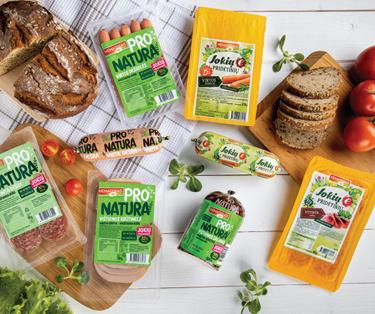
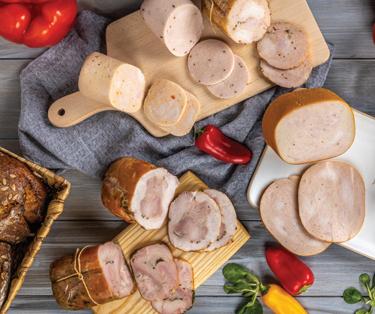
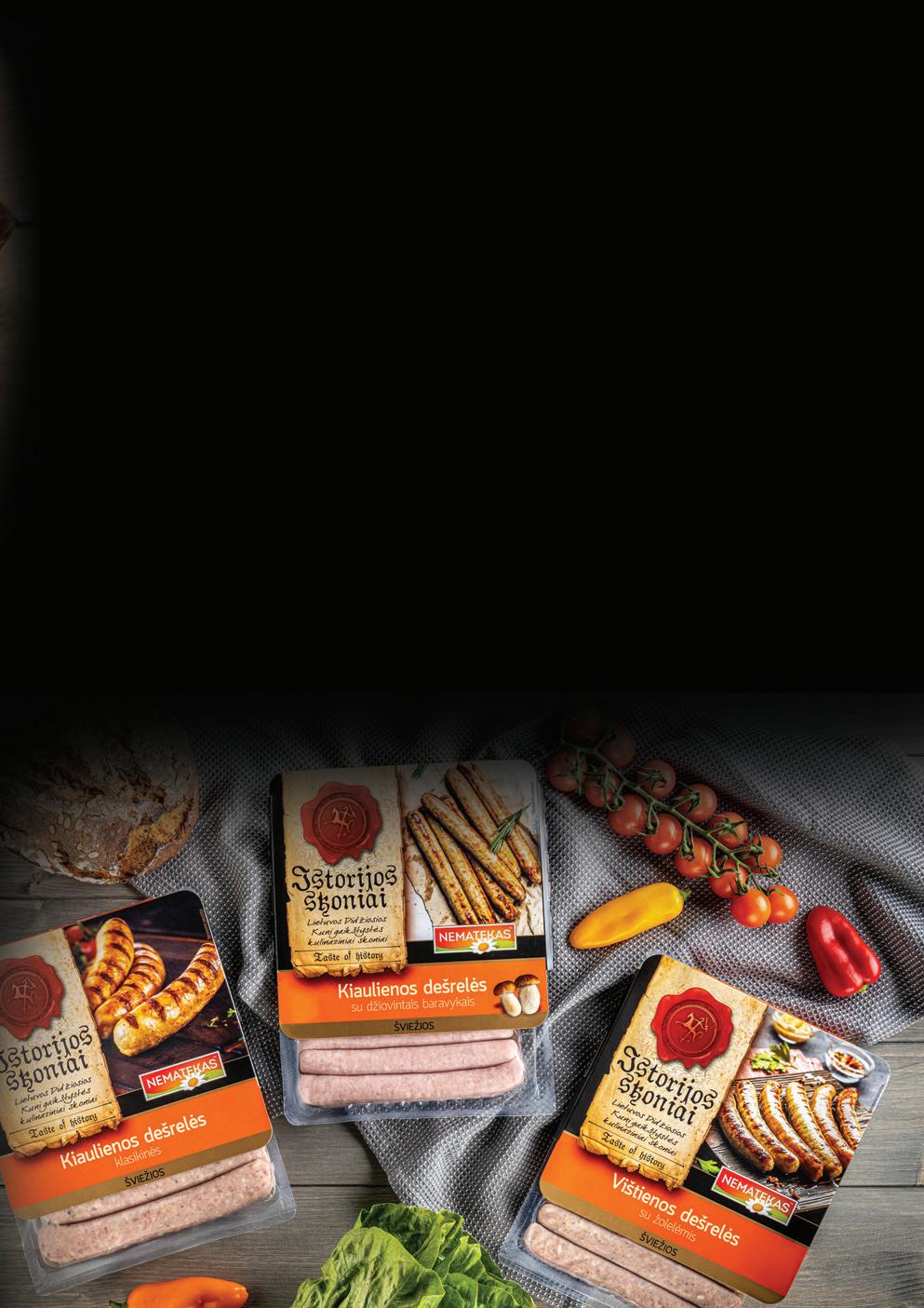
“Retailers were unable to predict their stock and product they needed even for the next day. On top of that, people were stockpiling, and that was a real challenge.”
Mr Vaicekauskas also had to handle the challenge of a surplus of poultry meat in Europe due to the likes of Poland pushing large heavily discounted volumes onto the market.
“Due to mass production and a competitive free-floating cur rency, Poland has sold at a low price in Lithuania and other countries. In most cases, it was well below production cost and we have had to accept that price level to remain in the market, even though it was almost impossible and has lasted a long time.
“It went through the whole supply chain, and still is, as poultry price levels are still highly affected by the decrease in demand. We now see a similar situation developing in the European pork market. Of course, we hope it will come back to some equilibrium where all players of the supply chain could enjoy a level of sustainability.”
He added: “While we cannot compete with the multi-national players, our advantage is that we are highly flexible for clients. We aim to be a reliable partner in their future ambitions to flourish.
“They are always assured by us, because we abide by quality in everything we do: our strict controls, IFS certified facilities, excellent raw material standards, and added value in products. All combine to help Nematekas to be a highly well-respected and successful business.”
